Music for the Coronation
ISM members take centre stage to perform at the service
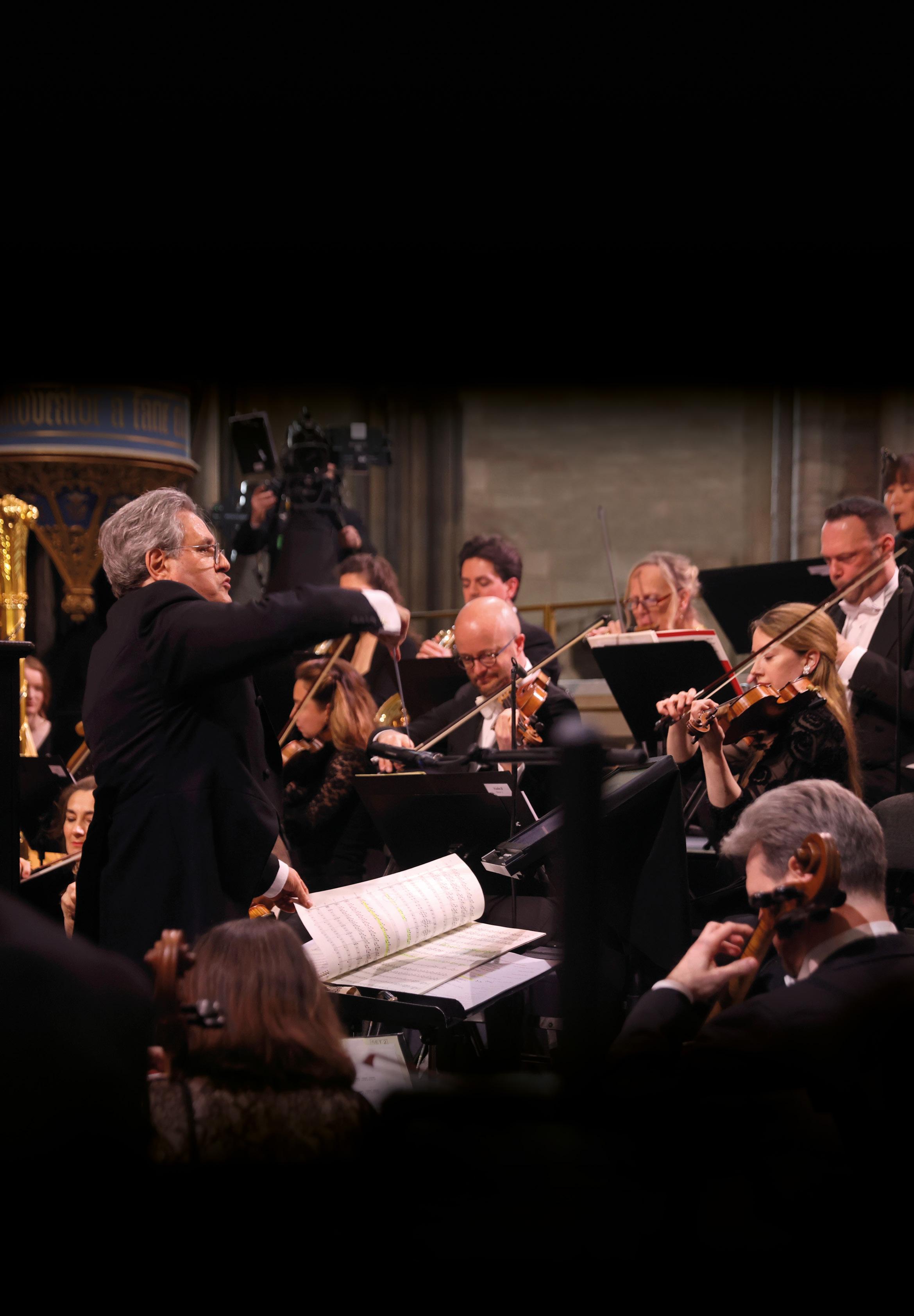
The Empowered Musician 3
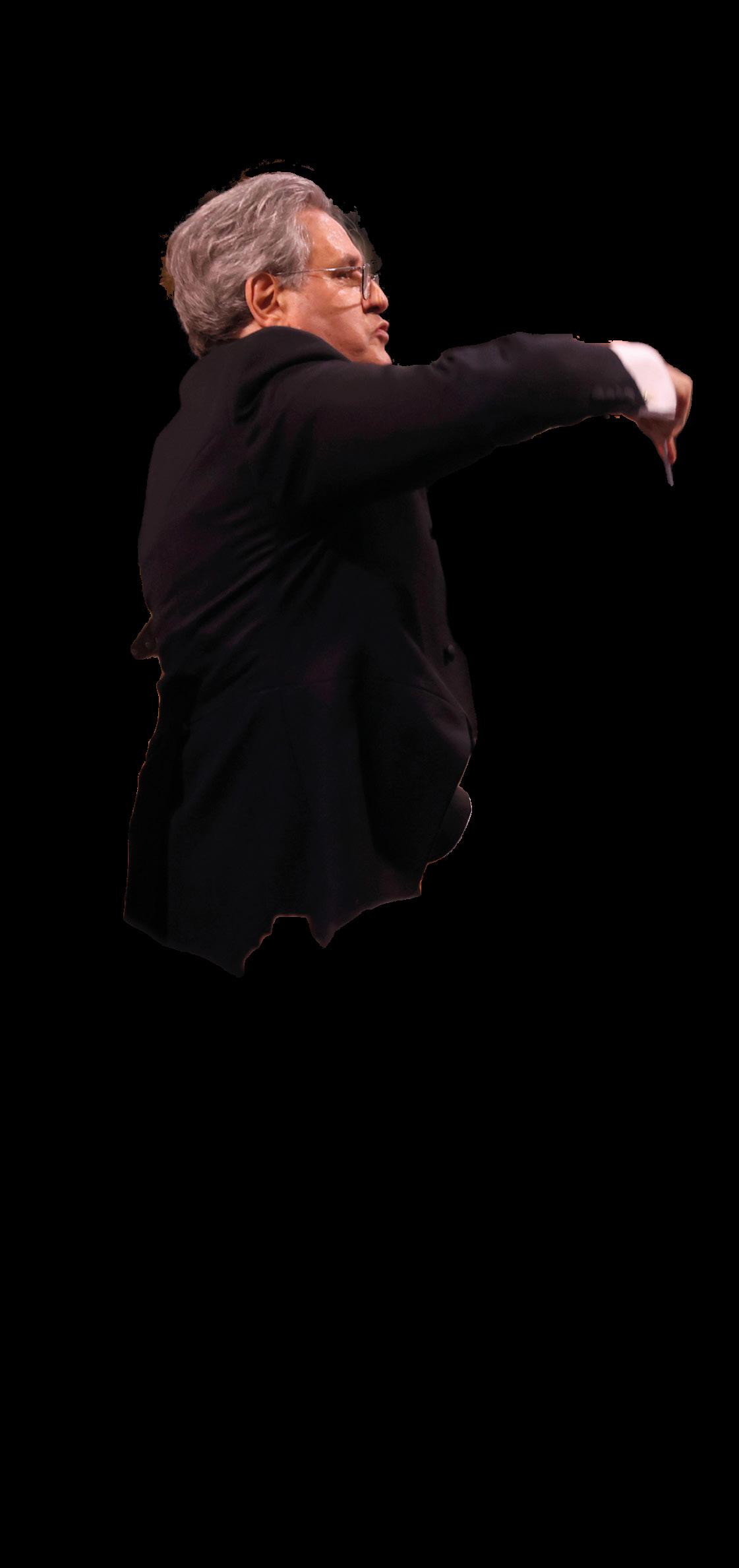
‘Unity is Strength’ is the message as our members face the current storms in musical life
The Primary Singing Toolkit
Introducing our new resource, produced with the Voices Foundation
SUMMER 2023 CELEBRATING 140 YEARS OF THE ISM
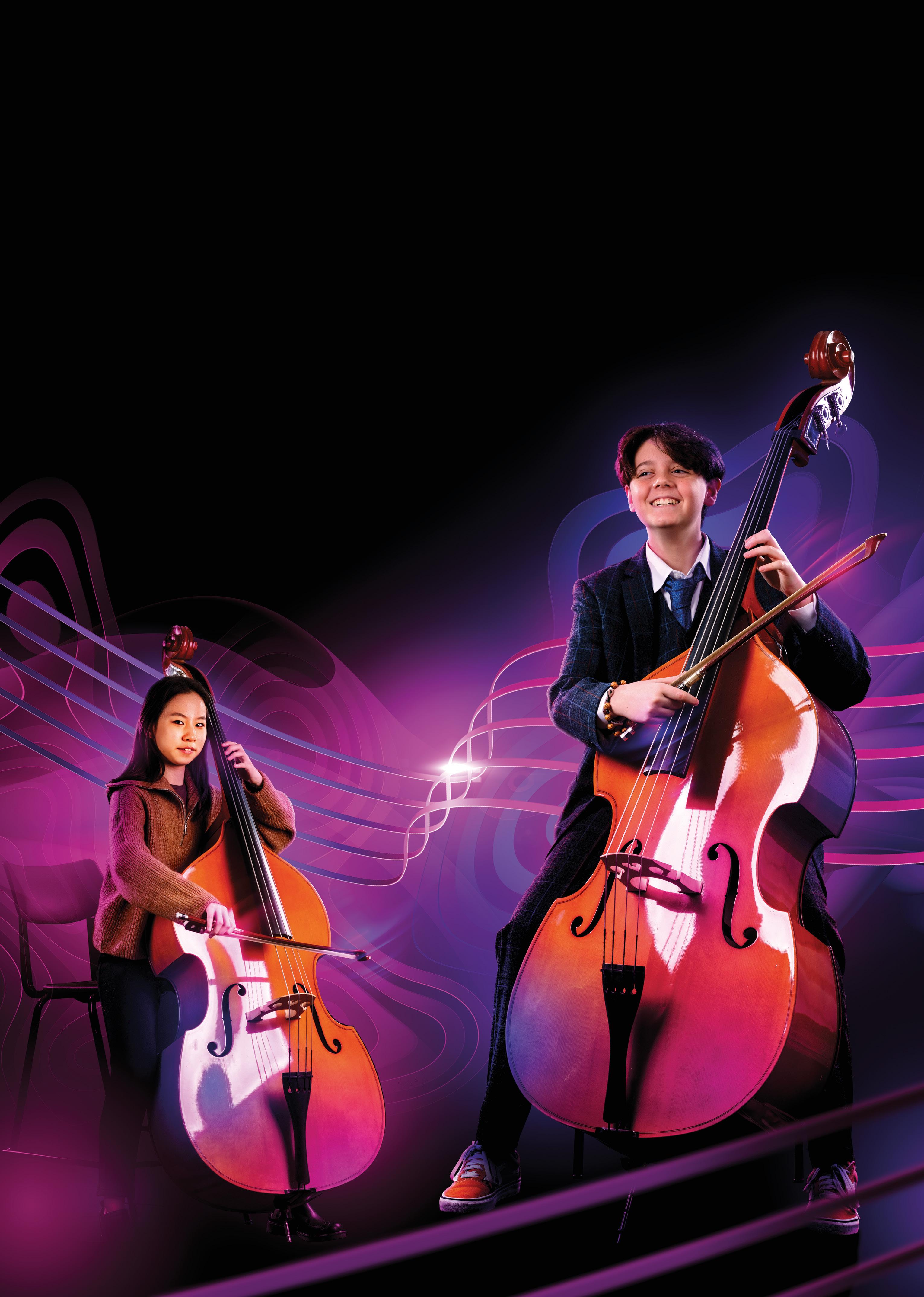
















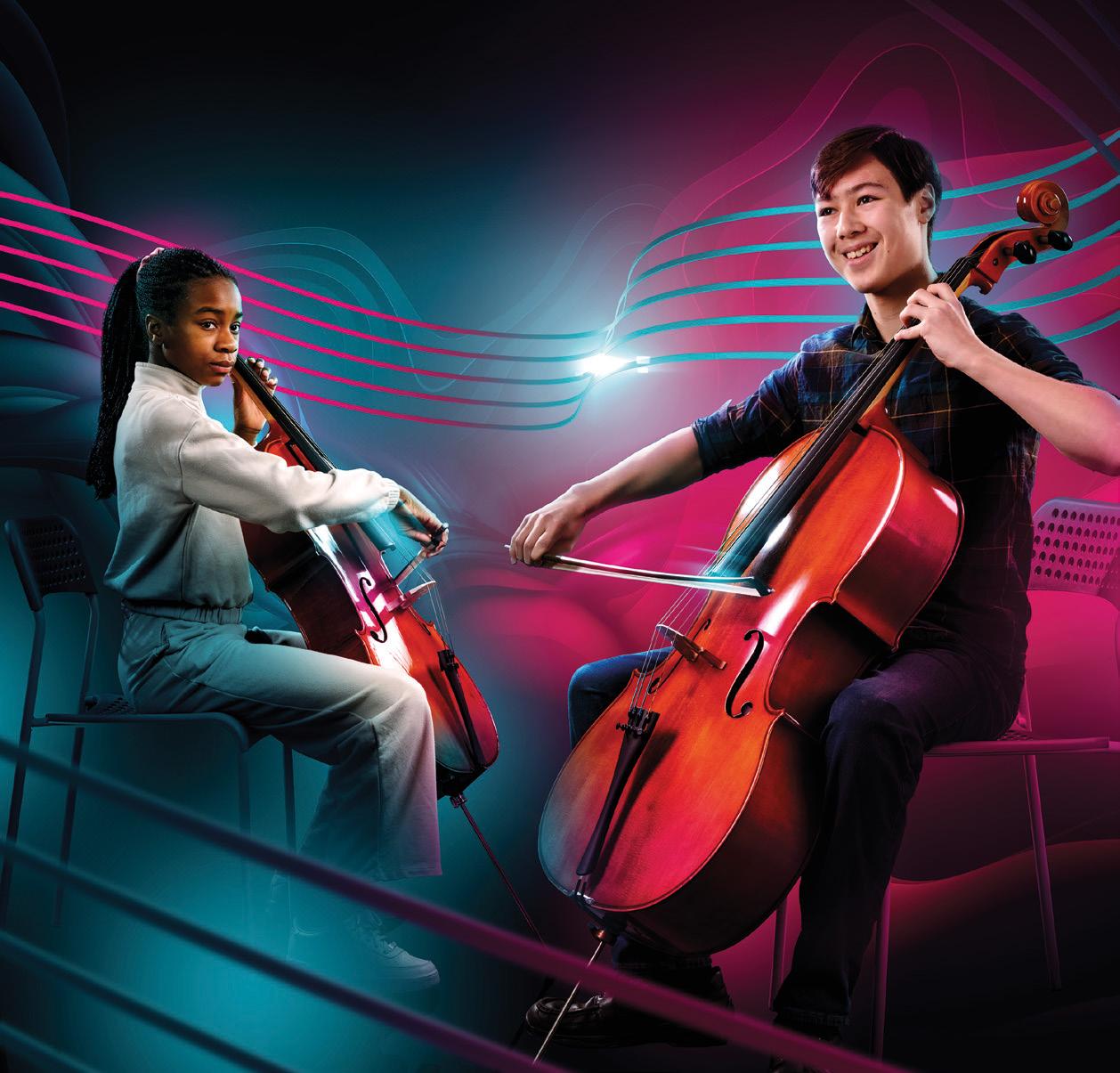




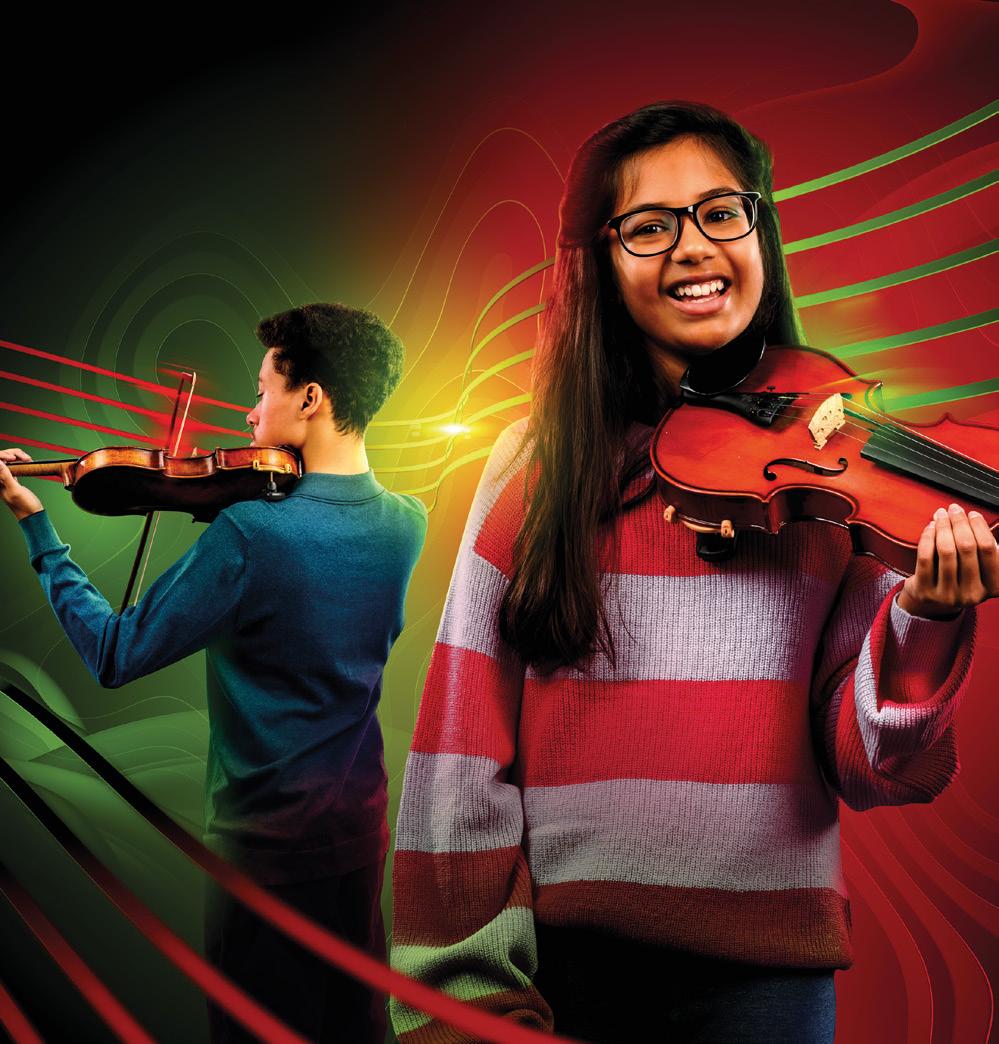















Welcome to the summer edition of Music Journal. So much has happened since the last issue, not least the Coronation of King Charles. Many ISM members were involved in the King’s Coronation, from composing to performing wonderful music –both newly commissioned pieces and much older works. You can find full coverage of the role of ISM members in the music for the Coronation, on pages 12-15.
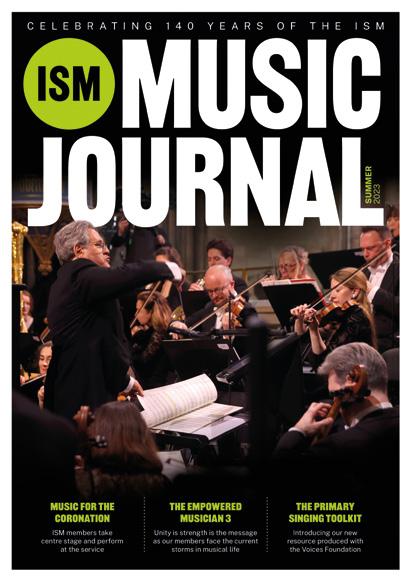
The latest in the series of ISM conferences under the banner of The Empowered Musician took place on 21 April. It was a sell-out, and covered an extraordinary breadth of topics – from developing technologies such as artificial intelligence and what this might mean for musicians, to building resilience in these ever-challenging times.
Perhaps the highlight of the day was the ‘In conversation …’ with Debbie Wiseman who was interviewed by well-known music journalist Michael Beek, from BBC Music magazine. Debbie has composed many hugely successful scores for both film and TV, and she talked in depth about her creative process. She also talked about working on the coronation – her piece Alleluia (O Clap your Hands) was performed by the Westminster Abbey Choir and its companion piece Alleluia (O Sing Praises) was sung by the Ascension Choir, marking the first time a gospel choir performed at a coronation. You can read more about The Empowered Musician 3 as well as a summary of our AGM on pages 8-11.
While so many people greatly enjoyed the music performed at the Coronation, music continues to be under threat from many quarters.
The ISM is pleased that the BBC has paused its cuts to orchestral jobs, but we are disturbed by the announcement that the corporation is looking for new funding arrangements for the BBC Singers. There remains a suspicion that these announcements have been made to ensure that the BBC Proms proceed without a hitch. The ISM hopes this is not the case, and we shall monitor the situation very carefully. If there is any inkling that the BBC Singers will not continue under the auspices of the BBC or that orchestral jobs will be lost, we will immediately voice our concerns and again campaign vigorously. I am sure ISM members will join in this important campaign. We cannot lose such a fundamental part of the UK’s musical landscape.
Lastly, summer heralds the start of many music festivals across the UK and beyond. If you are taking part in a festival, please do share your social media with us and we will be happy to promote your event. And happy music making.
E. deborah@ism.org
Volume 90 / Number 1
Published by: Independent Society of Musicians 4–5 Inverness Mews, London W2 3JQ
T: 020 7221 3499
E: membership@ism.org
W: ism.org
Independent Society of Musicians is a trading name of Incorporated Society of Musicians. A company limited by guarantee. Registered in England No.36882. Registered Office as address above.

Editor: Deborah Annetts
Sub-editors: Vinota Karunasaagarar, Clare Stevens
Proofreader: Christine Gwyther-Scott
All ISM publications are copyright
Front Cover: Sir Antonio Pappano, ISM Distinguished Musician Award winner, 2012 conducting at the King’s Coronation in Westminster Abbey
Photo: PA Images / Alamy Stock Photo See feature on pages 12–15
Printed by: Optichrome, Woking GU21 5HX ISSN 0951 5135.
Design: oakshed.co.uk
Advertising: Ruth McPherson, Head of Charity Development
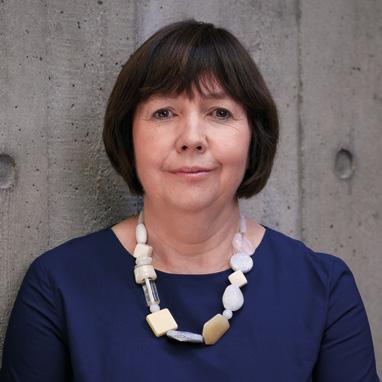
T. 020 7313 9316 E. Ruth.McPherson@ism.org
Price: £7 per copy
Subscription: £35 per year
ISM membership: Over 11,000
Views expressed in MJ are not necessarily those of the ISM. The publication of any advertisement does not imply endorsement of the advertiser or the product advertised.
Contents
Meet Pauline Black: Your new ISM President
News & Campaigns
The Empowered Musician 3
ISM AGM Minutes
Music for the Coronation
BBC Ensembles
Celebrating the Suzuki Method
Professional Development: Primary Singing Toolkit
How to look after your hearing health
Remembering Paula Fan
ISM Community
Member Spotlight
04.
06.
08.
10.
12.
16.
20.
24.
28.
31.
32.
36.
Photo: Emile Holba
Welcome
SUMMER 2023 WELCOME 3
Meet Pauline Black: Your new ISM President
I’ m quite an eclectic musician, I’m an eclectic person, I’ve got my finger in a few different pies,’ says Pauline Black, when asked about her work in music. While she enjoys performing, music education runs through the core of her work and she has worked on countless projects, with the aim of encouraging children and adults to take up music or to expand their musical horizons.
Born in Buckie, on the north-east coast of Scotland, Black taught her ‘bothy ballads’ – traditional Scottish ballads in the north-eastern dialect – from a young age. Her journey as a musician began aged 11 when she started playing the cornet: ‘I put my name down at school to play a wind instrument, but I came home with a flugelhorn
She received instrumental lessons in school (free instrumental lessons are still given to every child in Scotland).
On completing her music degree, she went on to spend two happy decades as a full-time secondary school classroom music teacher, moving schools as she was promoted from principal teacher to faculty head of expressive arts.
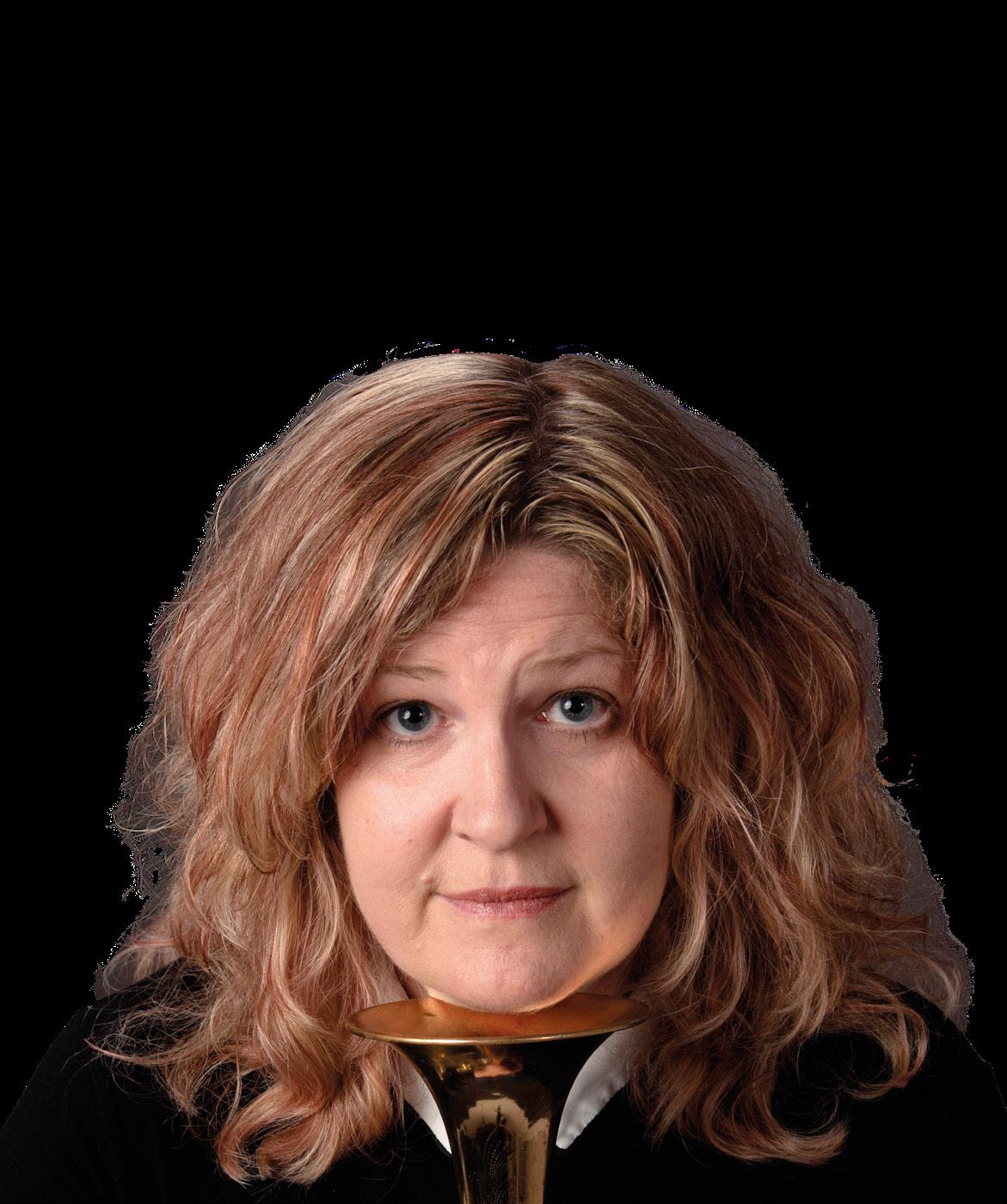
Black modestly cites the next steps in her career as unintentional and organic, as she transitioned from teaching in schools to teaching at the University of Aberdeen. ‘The job came up and at first I was seconded to it, as I wasn’t sure whether university teaching was something that I wanted to pursue – I loved working in schools so much. My then line manager asked me where I thought I could make the biggest difference. I knew that if I moved into teaching at university I had the chance to make a wider impact with generations of students and the children that these students would in turn teach in schools.’ Once in post, she again excelled, going on to become the Programme Director of Music Education, then the first female Head of Music, and now Head of Music Engagement.
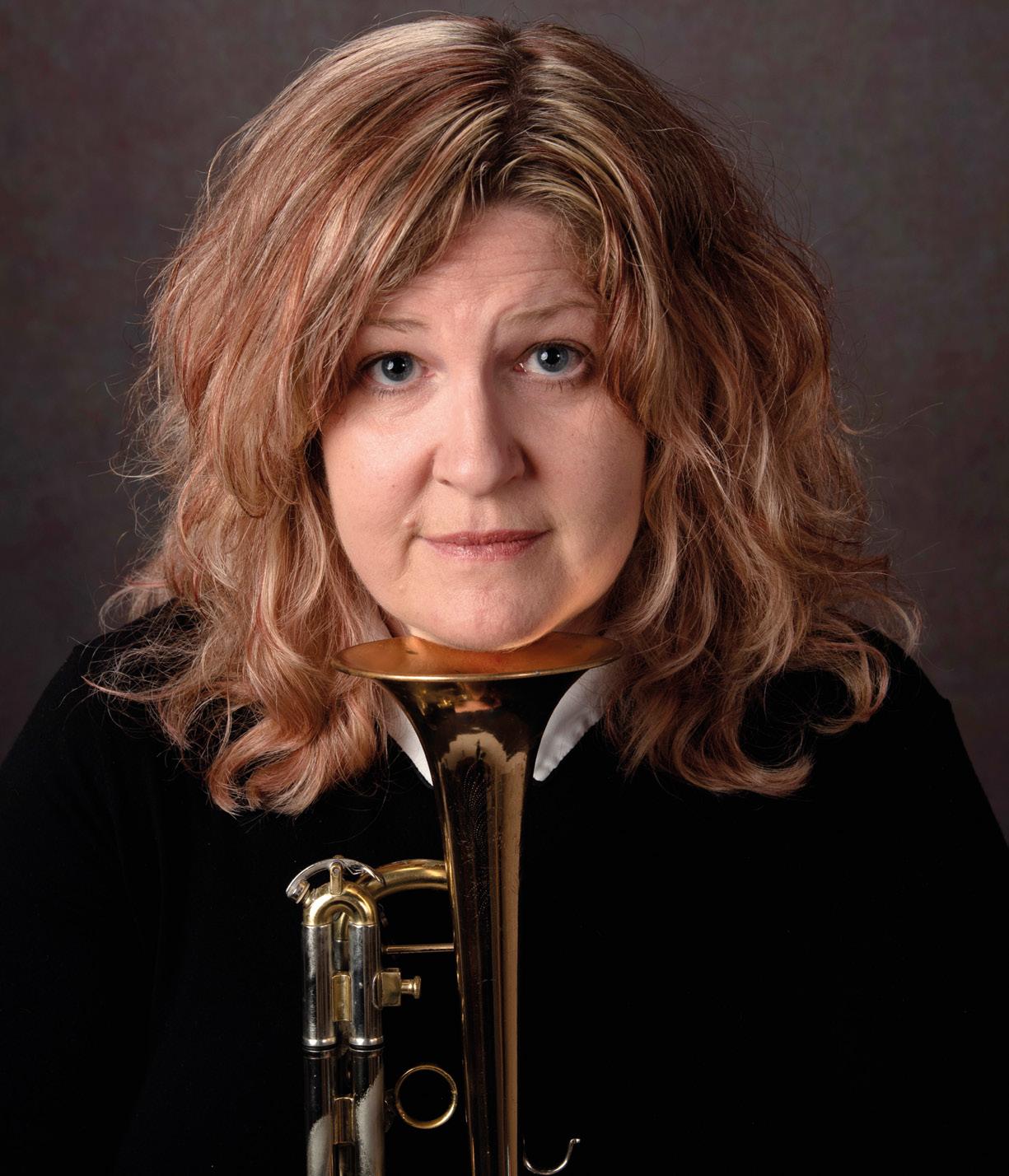
As Pauline Black, Senior Lecturer and Head of Music Engagement at the University of Aberdeen, becomes ISM President, Vinota Karunasaagarar chats with her to find out more about her career in music
I like creative music-making projects with young people and with multi-form artists, i.e. connecting primary school teachers to artists, for example at professional learning workshops.
Pauline black
Above: Pauline Black
‘ 4 ISM MUSIC JOURNAL
Photo: Flash Photography
Throughout her career Black has continued to perform: ‘I thought it was really important to keep playing. I’ve played at the Royal Albert Hall as part of the National Brass Band Championships, which was exciting for me coming from the north-east of Scotland, and I’ve shared a stage with James Brown and Van Morrison as part of Live On The Lawn at Crathes Castle, when both international artists requested a local band to support them and I was part of that. I enjoy playing in the Aberdeen Jazz Orchestra and Any Enemy, a new music ensemble.’
‘A lot of my performances are in popular genres or jazz related. When I first started teaching, I joined a soul band; it was a shock to my system as at my first rehearsal they said “our first tune goes like this”, and we were expected to play what we just heard!” This experience changed how I was as a musician and how I became as a teacher. That informal learning style became part of my practice.’ Black’s research projects, including her current PhD, are linked to her love of Jazz and how skills such as improvising and playing by ear can be used in music education to encourage children to play together.
She has also turned her hand to directing; notably she directed Duke Ellington’s Sacred Concert at the Aberdeen Jazz Festival, featuring the Aberdeen Jazz Orchestra and University of Aberdeen Big Band, The Ellington Singers, soloists Jacqui Dankworth, Helena Kay and Richard Ingham, and tap dancer Danielle Pirie. But her love of performing Jazz doesn’t stop there: ‘A big part of what I do is to help encourage the Jazz ecosystem in Aberdeen, as we’re miles away from everywhere in the UK but we have a good little scene. So I encourage professionals to perform here and those who have never played in their lives to play.’
Black is on the committee for Jazz at the Blue Lamp, Aberdeen’s only Jazz club, and credits her work there for providing connections to help with her other big focus –her music education projects: ‘I like creative music-making projects with young people and with multi-form artists, i.e. connecting primary school teachers to artists, for example at professional learning workshops.’ Black also runs an allage community jazz big band in the Blue Lamp.
Along with a small team of students whom she mentored, she coordinated the Aberdeen Youth Jazz celebration, which involved visiting schools to run Jazz and improvisation workshops, commissioning new music, and performing as part of the Jazz Festival in partnership with Jazz Scotland.
Another successful project which began as a necessity to engage students during COVID-19, but has now evolved into further collaborative projects, is Black’s work with Dr Emily Wilson, Head of Music at the
Melbourne Graduate School of Education at the University of Melbourne. Together they conducted an online collaborative composing project where students in Melbourne worked with students in Aberdeen, using digital audio workstations to compose online so that they could then learn how to compose with their students in schools. Due to the success of the first project, they have just completed a second iteration called ‘Caring for our planet: a world apart or same difference?’ focusing on climate change.
Now, as she takes on the role of ISM President, her work in music education, performing and research are all at the forefront of her mind. While music education will be a focus of her presidential year, she is also keen to continue with the work of her predecessor: ‘Vick Bain has been making huge strides in empowering women and her work in the gender sphere has helped me a lot. Some of my research is also in this area, specifically looking at women in Jazz, and I’m really interested in the discussions that have come up.’
COVID-recovery is another area that she is keen to focus on: ‘Lack of confidence is a huge issue. One of the things we did via Jazz at the Blue Lamp through COVID, and are still doing thanks to funding from Creative Scotland, is helping people get back to playing instruments together, so that they can feel comfortable playing, touring and gigging together. I’d like to continue to help people to make music.’
Your President-Elect: Nicky Spence
World-renowned opera singer Nicky Spence is your ISM President-Elect and will follow on from Pauline Black to become President in 2024.
Commenting on the announcement, he said, ‘My wish is that I can be an energetic representative for musicians in an ever-changing landscape. In doing so, I aim to help protect the conditions which musicians deserve to give their best work and continue to inspire the next generation of musicians and educators who need specific support to find a sustainable route to the profession.’

‘A big part of what I do is to help encourage the Jazz ecosystem in Aberdeen.’
Pauline Black New ISM President
Above: Nicky Spence Photo: Ki Price
5
SUMMER 2023 MEET PAULINE BLACK
Music Education Hubs Investment Programme
The Arts Council England (ACE) has announced plans to slash the overall number of Music Education Hubs from 117 to just 43, despite the results of a consultation with the sector, which showed that most respondents preferred a model of around 80 hubs.
The ISM believes that the new, much larger hub geographies will not necessarily improve the delivery of music services to young people and has raised these concerns with ACE.
BBC Singers and orchestras: not yet out of danger
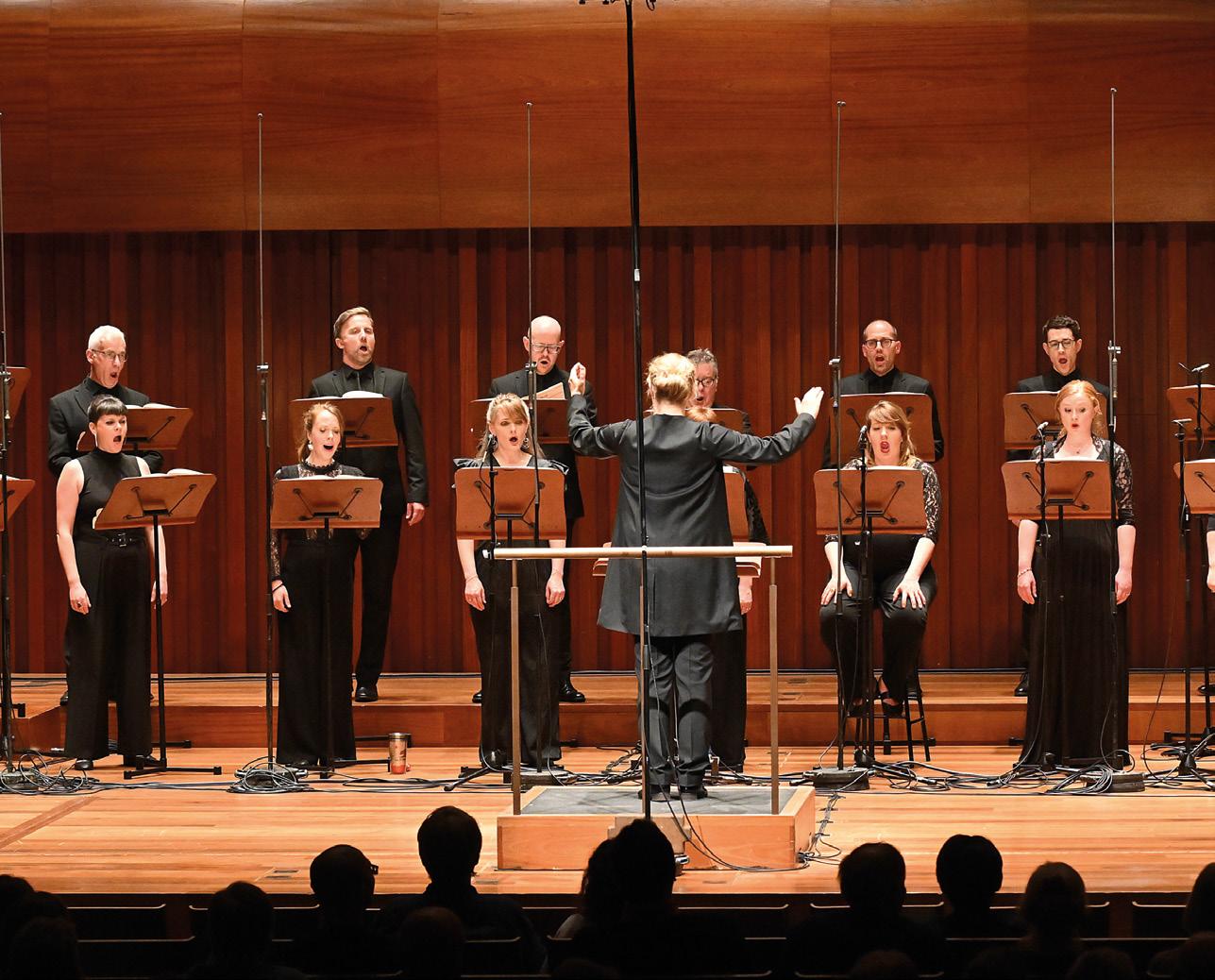
The ISM remains concerned about the long-term future of the BBC Singers and orchestras despite the BBC’s announcement that it is pausing proposals to disband the Singers and cut 20% of positions in the BBC’s three English orchestras.
After an international outpouring of support for the Singers, led by the ISM and other organisations, the BBC is now exploring alternative options to funding the Singers and orchestras. The ISM has welcomed the decision, but says the future of the BBC performing groups is still uncertain. We believe that the BBC should guarantee that the Singers will remain under the auspices of the BBC and funded publicly by the BBC.
Deborah Annetts said, ‘On the face of it, this announcement looks like a positive move from the BBC, but we will need to see the detail to understand fully how this will impact on the long-term future of the BBC Performing Groups.’
We encourage ISM members to continue expressing their support for the BBC Singers and orchestras. You can write to the BBC and your MP using template letters on the ISM website: ism.org/news/takeaction-against-bbc-cuts-to-classical-music
Read more about this story in our feature on page 16.
Below: BBC Singers at Milton Court
6 ISM MUSIC
Photo: Mark Allan
JOURNAL
Febuary 2023
Secretary
decline of music and other arts subjects at GCSE level. It focuses on the impact of the secondary accountability measure Progress 8, which is heavily skewed towards English Baccalaureate subjects and has devalued arts subjects.
recommendations of the campaign: for the government to review school accountability measures, reform Progress 8 and deliver the £90 million Arts Premium for schools promised in the Conservatives’ 2019 election manifesto.
Add your signature to the letter and find out more about saveoursubjects.org


Discrimination in the music sector
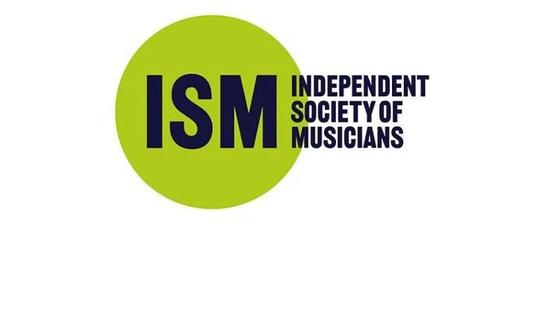


ISM Chief Executive Deborah Annetts appeared in Parliament on 19 April to give evidence to the Women and Equalities Committee.
Speaking as a witness to the committee’s inquiry into Misogyny in Music, Deborah said that discrimination is getting worse in the sector and compared figures from the ISM’s 2022 Dignity at work 2 report with our 2018 Dignity at work report, which showed discrimination had risen from around 47% of respondents to 66%, and non-reporting of discrimination had increased.
Deborah also raised concerns about the effectiveness of the proposed Creative Industries Independent Standards Authority (CIISA), saying that it lacks teeth due to its nonstatutory status: ‘The most it can do is name and shame, and that is not enough.’ She called for legislative change to make the music industry a safer place for women. The inquiry is part of the committee’s work into preventing violence against women and girls.
#SaveOurSubjects
Dignityatwork2: inDiscrimination the music sector Reportby
Co-author:VickBain September 2022 @ism_music @ISMusicians @ism_music ism_music ism.org
DrKathrynWilliams
SUMMER 2023 NEWS & CAMPAIGNS 7
Top: Belfast Opera House
The Empowered Musician 3
The ISM community came together on 21 April for the third instalment of TEM. Here we provide a few snapshots of the event
From metaphors about herds of buffalo and anecdotes about writing music for royalty, to learning about developments in immersive audio and performances involving flowerpots, The Empowered Musician (TEM) 2023 was incredibly wide-ranging. The thread linking these seemingly disparate topics was outlined by ISM Chief Executive Deborah Annetts in her opening welcome. With advancements in tech, such as the increasing use of artificial intelligence (AI), happening at such speed, it can feel like you’re swimming uphill just to keep up. The ISM, as always, is here to help members to understand the world around them and see where the opportunities and threats lie. We aim to provide practical support to help you look after yourself and build resilience in this fast-paced environment.
ISM Member, key takeaways from TEM3
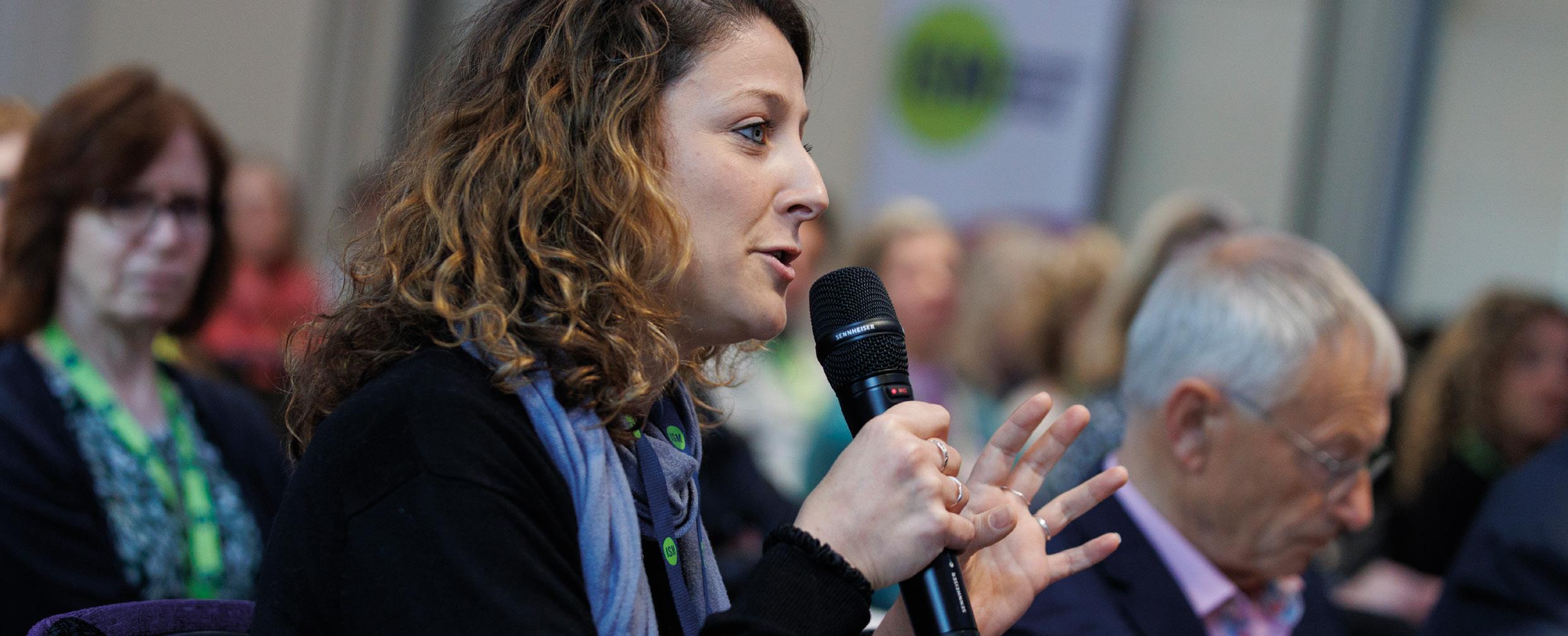
The event began with a rousing performance of Steve Reich’s Clapping Music and Nagoya Marimbas performed by two percussionists from the London Sinfonietta, before moving to the first panel which discussed Resilience. Chair Sarah Mohr-Pietsch opened the panel by recalling a conversation with an elder of the Canadian First Nation Blackfoot tribe who described buffalo huddling together when facing a storm. With the strongest at the front, the buffalo walk directly into the bad weather, which they instinctively know will get them out of it more quickly than running away. With analogies presenting the ISM as lead buffalo, the conversation covered everything from the importance of building your own support network, to creating small, sustainable habits to avoid burnout, finding foundations with shifting sands under our feet and managing finances. Particularly useful was insight from Arva Valika, Head of Clinical Operations, CiC, into the hierarchy of debtors and which bills should be prioritised; she also highlighted schemes that exist to provide breathing space for debt and bill payments.
Music from Kabantu followed after lunch, with new pieces written especially for the
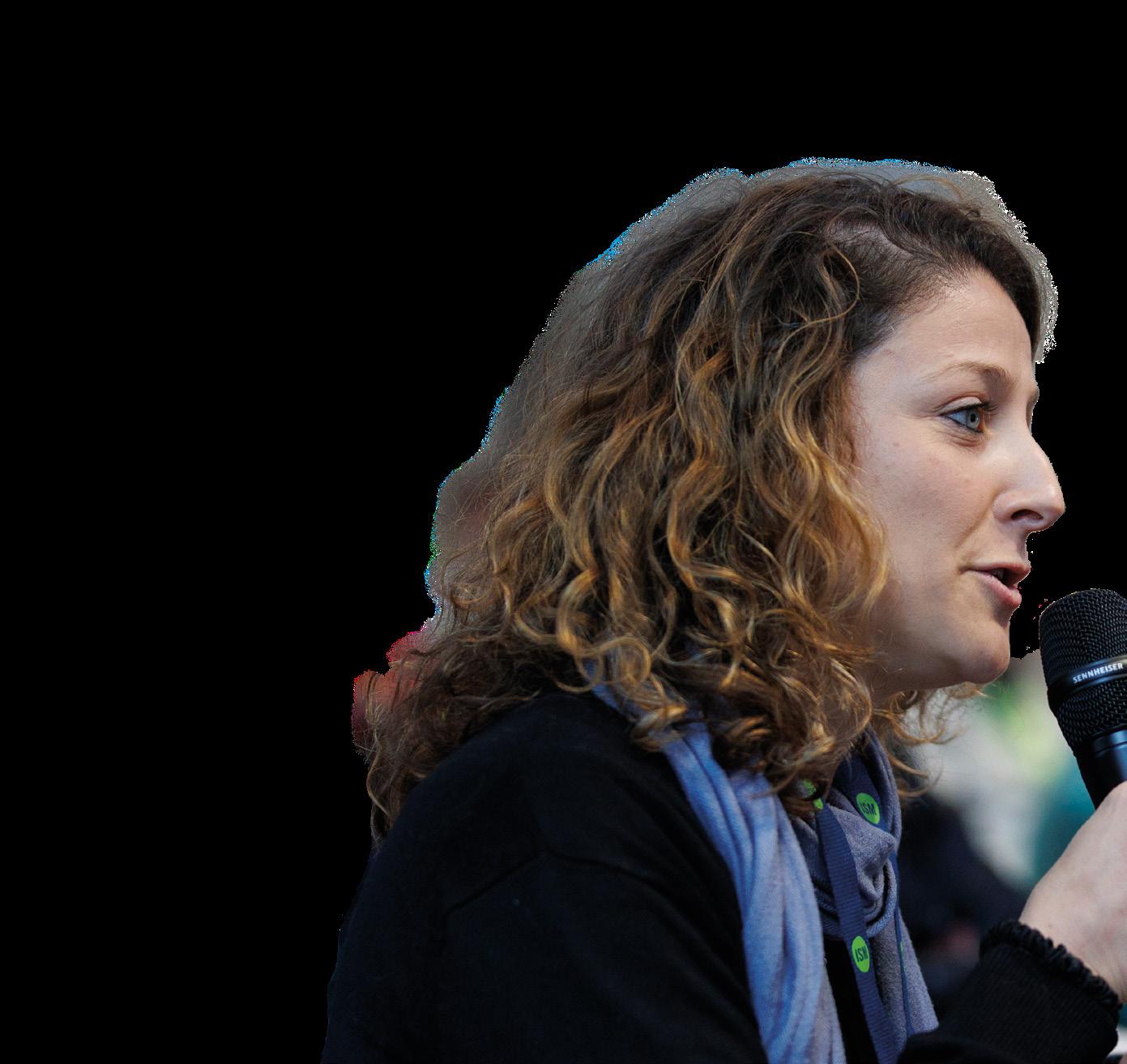
‘Finances and debt problems can be resolved. AI presents opportunities and maybe some threats and challenges.
The ISM offers tremendous support to its members.’
8 ISM MUSIC JOURNAL
– before Vick Bain chaired a session on New Horizons and the mounting interest in artificial intelligence, 5G and nonfungible tokens (NFTs). Panellists were invited to discuss the innovation and disruption that results from emerging technologies. Composer Robert Laidlow described AI as a creative tool that disrupts his creative process (in a good way), while Charlie Phillips of PTR Strategic predicted that it will increasingly create a divide between active and passive listening, depending on whether music is machine made or composed by people.
In the 5G sphere, Jamie Gosney, Creative Director at Sonosphere, tackled latency and immersive audio, describing how advances are now being made in delivering real-time, authentic experiences for musicians to play together and audiences to listen to performances remotely. This has the potential to be a (partial) solution to the problems Brexit has created for musicians, while also addressing concerns about the climate impact of travelling.
During the highly anticipated ‘in conversation with’ session, Debbie Wiseman OBE spoke to Michael Beek, sharing experiences, insights and anecdotes from her long-established and successful career as an awardwinning composer and conductor. Topics ranged from
facing rejection of her work, to the prospect of having her music listened to by millions of people for the King’s Coronation. Wiseman stressed the importance of resilience, taking risks and embracing new opportunities. Hearing her play the themes from some of her biggest hits, including the theme from Wolf Hall, was a hugely memorable experience.
The day ended on a high, with music from brand-new improvised groove collaboration Chief Frog, led by ISM member Vij Prakash. It was wonderful to see so many musicians gather together for what was a very special day –and remember, the ISM is your lead buffalo, ready to face life’s storms and offer you support and protection in the process.
If you are interested in working with the ISM on the impact artificial intelligence will have on the music sector, please email membership@ism.org
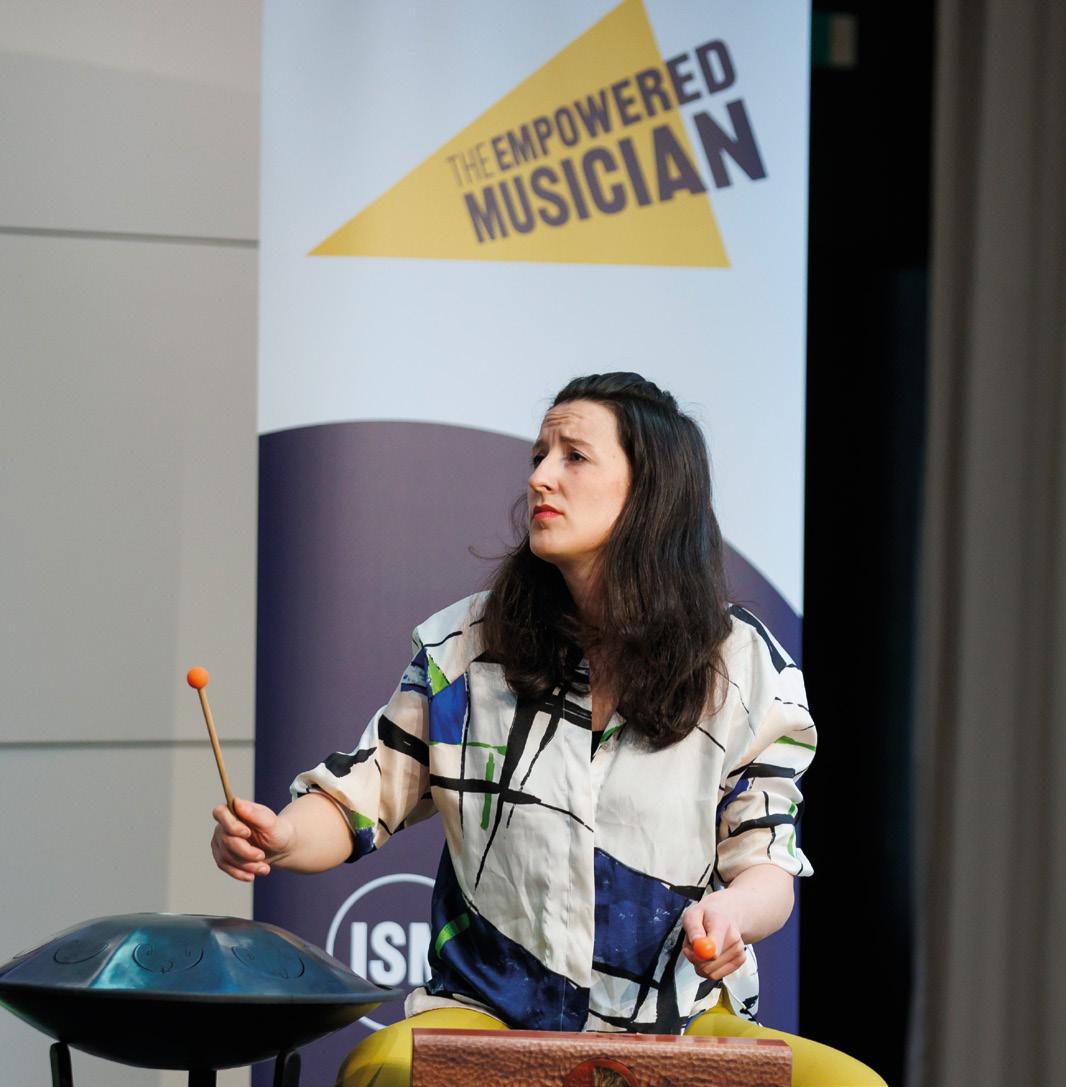
Watch the sessions and access related resources at ism.org/professional-development/theempowered-musician-2023
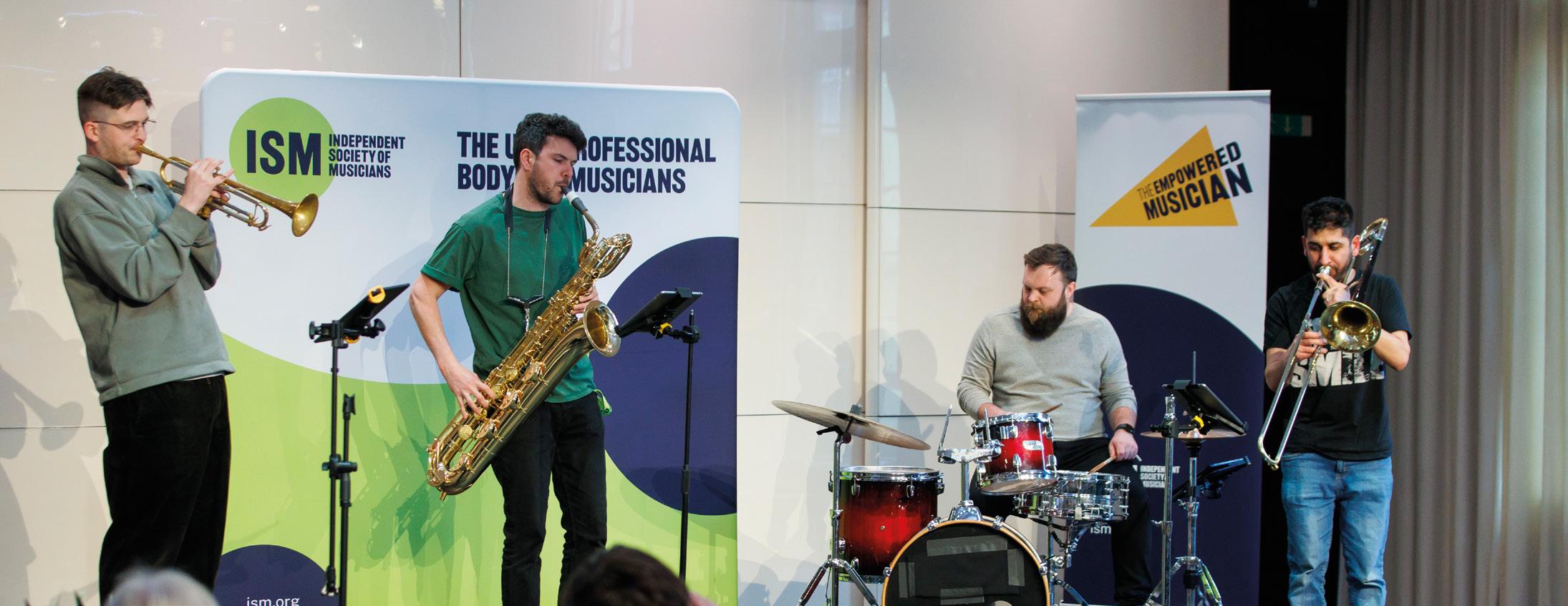
The need for our industry to get ahead with new technologies before our future is decided for us by tech companies. Quite a frightening prospect!
Non-ISM Member, KEY TAKEAWAY FROM TEM3
Photos: Kris Brown
9
SUMMER 2023 THE EMPOWERED MUSICIAN 2023
ISM AGM
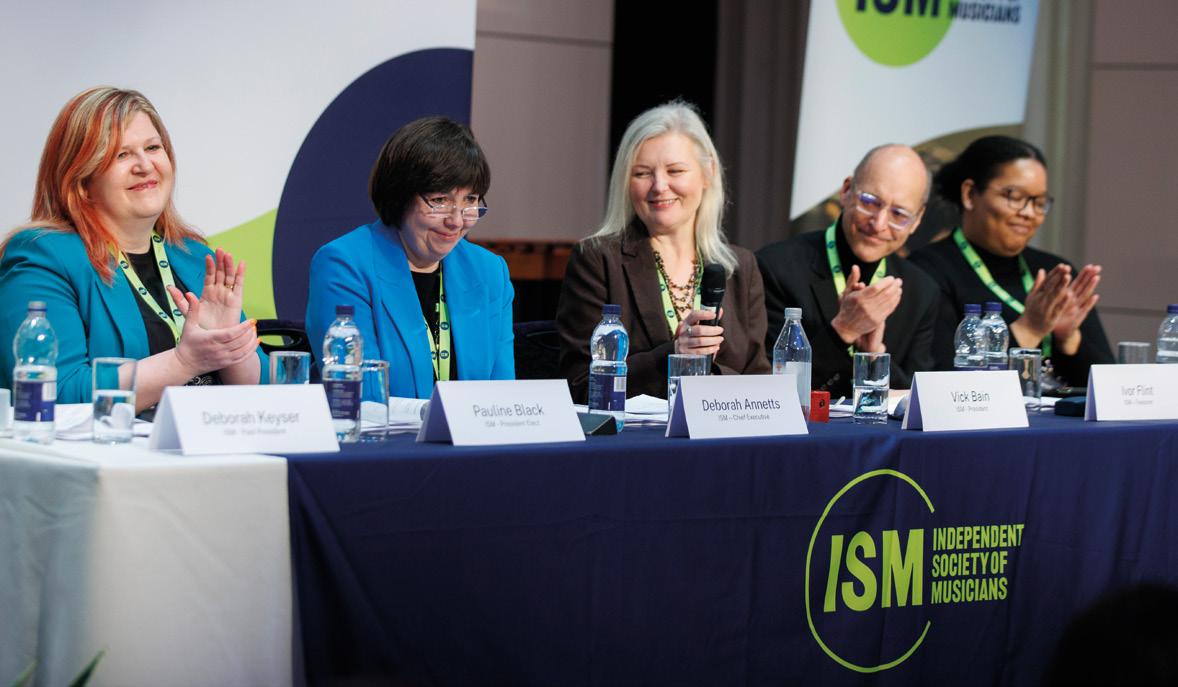
Friday 21 April 2023, 10am
Held in the Princess Alexandra Hall, Royal Over-Seas League,
6 Park Place, St James’s Street, London SW1A 1LR
Introduction
Vick Bain (President) opened the AGM and welcomed members to the event. Before the start of the formal business, the President reminded members that the AGM covered the period from 1 September 2021 to 31 August 2022. The President then introduced the AGM panel:
– Pauline Black (President Elect)
– Deborah Keyser (Past President)
– Ivor Flint (Treasurer)
– Deborah Annetts (Chief Executive)
– Sabrina Taylor (Director of Finance & Facilities)
Apologies for absence for the meeting were recorded and all members present had a hard copy of the apologies to hand for information. The President recorded the names of members who had passed away during the past year and asked for a minute of silence to remember them.
1. Minutes of the AGM held on 7 May 2022
The President asked if there were any amendments to the minutes of the AGM held on 7 May 2022. There were none. The resolution to approve the minutes was proposed by John Perrin and seconded by Jeremy Huw Williams. The resolution was approved.
2. To receive the Annual Report of the Council of the Society for 2021–22
The Chief Executive gave the annual report for the financial year from 1 September 2021 ending 31 August 2022. The report covered highlights from the year including winning the prestigious Individual Members Association of the Year and the landmark holiday pay case win at the Supreme Court. The in-house legal team were thanked for recovering £165,000 for members.
The Chief Executive also reported on campaigning activity across Brexit, Equality, Diversity and Inclusion (EDI), and music education, including the publication of Music: a subject
in peril? and The Case for Change reports as well as the results of the annual teaching fees survey. It was also noted that the milestone of 11,000 members had been reached during the year and that the ISM remains committed to its members and in developing services to meet their needs. Nicola Benedetti CBE was the recipient of the Distinguished Musician Award.
Lastly, the Chief Executive noted that the preparation for the name change and rebrand which took place on the ISM’s 140th Anniversary on 7 October 2022 was largely undertaken during the 2021-22 financial year.
The Chief Executive closed her report by thanking members for giving their time as members of the ISM Council, as well as those who take part in Local Groups. She also expressed her thanks to the fantastic ISM staff team and those many volunteers who have supported the ISM activities during these challenging times. ISM member Margaret Lion thanked the Chief Executive for her work and leadership over the past year.
The resolution to receive the annual report was proposed by Liz Partridge and seconded by Jeremy Huw Williams. The resolution was approved.
3. To receive and approve the Accounts of the ISM for the year ending 31 August 2022 and to receive the Auditor’s Report
The Treasurer spoke to the accounts for the ISM and reported that the Society’s finances remain strong, despite a challenging year due to inflation, the COVID-19 pandemic and Ukraine war.
The growth in membership positively contributed to income, and whilst expenditure was 2.6% higher than the previous year at £1.75m, this was due to an increase in costs associated with membership services and the rebrand that took place after the end of the financial year. Expenditure had also been required on the ISM’s office premises, however these costs were offset by savings made elsewhere. The financial year ended with reserves of £4.25m including the office premises and investments.
10 ISM MUSIC JOURNAL
The Treasurer finished his report by thanking the Director of Finance & Facilities, the auditors, Lindeyer Francis Ferguson and investment brokers, Investec.
The resolution to receive and approve the accounts was proposed by Margaret Lion and seconded by Annie Bouah. The resolution was approved.
4. To receive the report on the ISM Members Fund and ISM Trust 2021/22
The Chief Executive spoke to the report of the Members Fund for the period ending 31 August 2022 which was for information only.
It was reported that the Fund‘s impact had increased from 2% in 2015/16 to nearly 50% in 2021/22 as a result of the decision of the Trustees in 2018 to move away from grant giving and focus on services. The ambition was for the Fund to exceed 50% impact in the next financial year.
Developed in response to member feedback, the counselling service had seen a huge surge in uptake during the financial year. The physiotherapy scheme had continued to perform well and the hearing health service had only recently commenced operations. Its impact would be reviewed next year.
The Chief Executive noted the generous legacies that had been bequeathed to the Fund during the year.
The Chief Executive then provided a short report on the ISM Trust activities for the period ending 31 August 2022 for information only.
Set up in 2014 as part of the ISM’s corporate social responsibility, the ISM Trust focuses on providing professional development to the music sector for free. In November 2021 it delivered an online conference, Where next for music education? which had nearly 500 attendees, and guest speakers including Mark Phillips (Ofsted) and Dr Kadiatu Kanneh-Mason. During the year the Trust continued to deliver a programme of webinars which are all available free of charge, online.
Face-to-face seminars continued to be paused due to the pandemic, however partnerships with the record label NMC and ABRSM continued. Existing online resources, such as Indian Takeaway: Rāg and Tāl basics, continued to do well.
The Chief Executive noted that the Trust is beginning to generate its own income and thanked everyone who has donated to it over the year, including a legacy from the estate of Marion Russell.
5. To reappoint Lindeyer Francis Ferguson Limited as Auditors for the ISM and to authorise the Council to fix their remuneration
The resolution to reappoint Lindeyer Francis Ferguson Limited as auditors and to authorise the Council to fix their income was proposed by Jeremy Huw Williams and seconded by John Perrin. The resolution was approved.
6. To note the retirement of members of the Council
ISM members were asked to note the following Council members who retired at 21 April 2023: Eugene Monteith, Dr Paul Max Edlin, Nicolas Chisholm and Deborah Keyser.
The Chief Executive thanked all the Council members for their contributions during their terms on the ISM Council and the President expressed her thanks as well.
7. To note the election of the elected Members of Council and the Appointed Members of Council ISM members were asked to note the following appointment and elections to Council as of 18 April 2023. Two members filled Elected vacancies. Dr June Fileti for London and Dr Rhiannon Mathias for Wales.
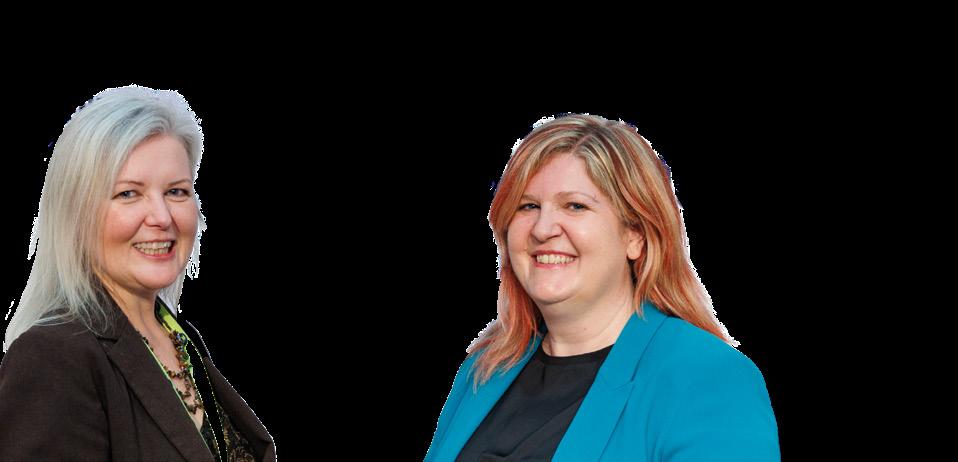
With regards to the Appointed vacancies, Andrew Keeping and John Atkinson were appointed to Council.
Nicky Spence was appointed by Council as President Elect.
8. To confirm the time and place of the next AGM
The next AGM will be held in April 2024 and more details will be released to the membership in due course.
Open forum
The President opened the discussion and invited members present to ask any questions or raise any matters for discussion.
Jeremy Huw Williams congratulated Vick Bain on her presidency. The President conveyed her thanks to the Chief Executive, fellow board members and staff team for their dedication and work over the year. President Elect Pauline Black also thanked the President and Chief Executive.
The President concluded the meeting and closed the forum at 11.00am.
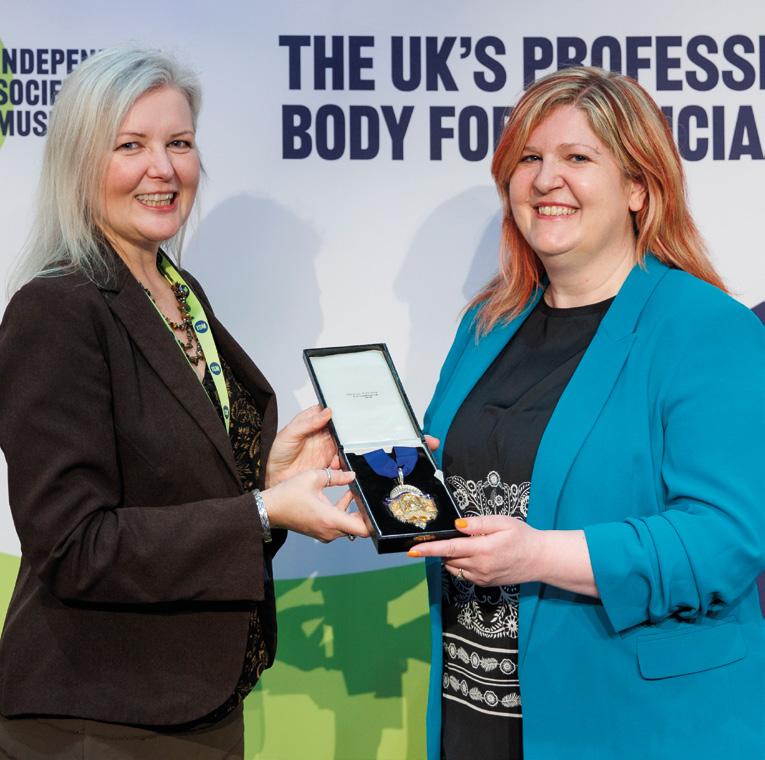
11
Photos: Kris Brown
SUMMER 2023 ISM AGM MINUTES
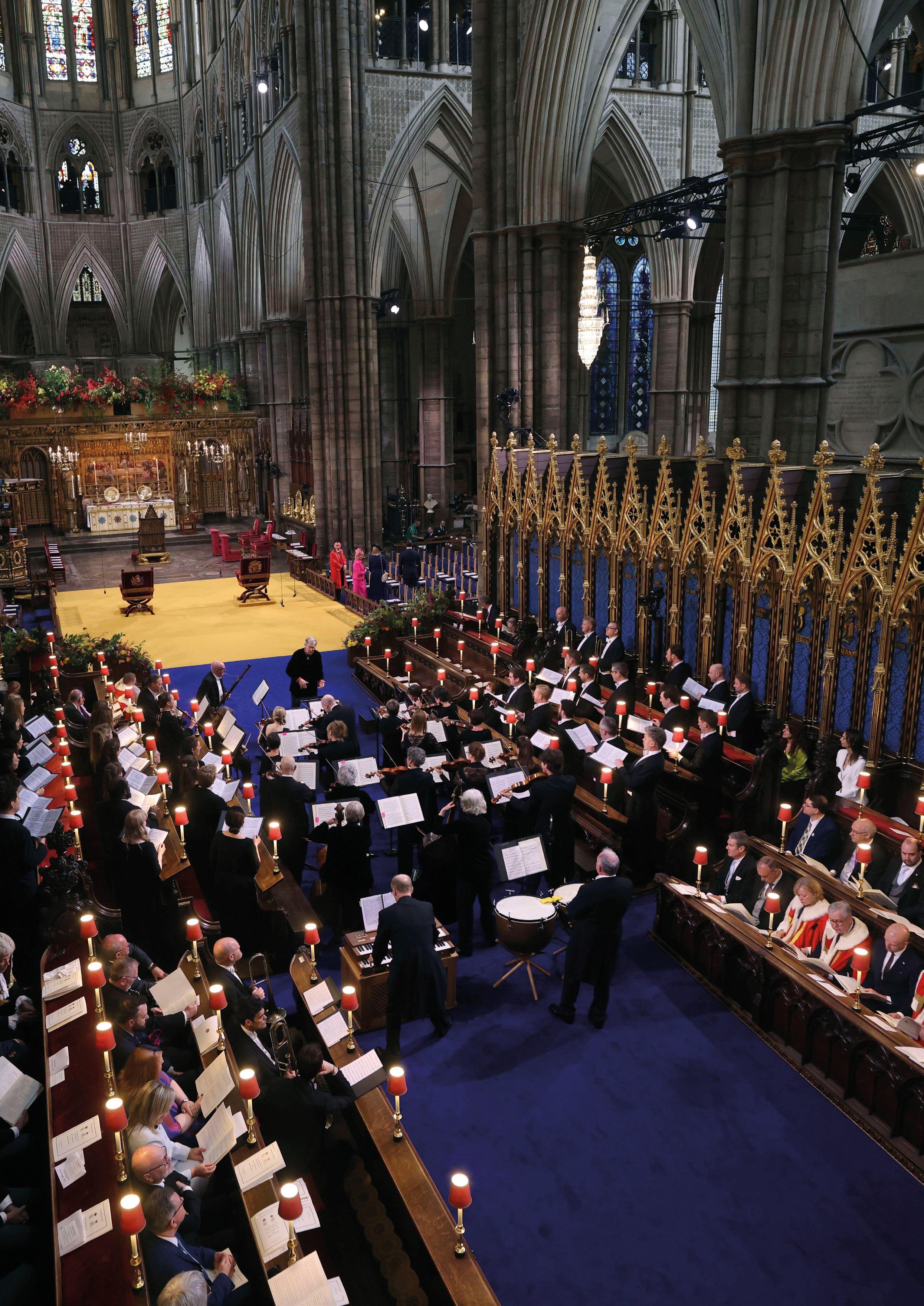

 This image: Sir John Eliot Gardiner conducts the Monteverdi Choir & Orchestra ahead of the Coronation of King Charles and Queen Camilla at Westminster Abbey
Photo: Associated Press / Alamy Stock Photo]
Opposite page, top right: Andrew Nethsingha conducting the expanded Westminster Abbey Choir
Photo: Benjamin Ealovega
Opposite page, middle: Westminster Abbey’s Sub-organist Peter Holder playing for the service Photo: Benjamin Ealovega
This image: Sir John Eliot Gardiner conducts the Monteverdi Choir & Orchestra ahead of the Coronation of King Charles and Queen Camilla at Westminster Abbey
Photo: Associated Press / Alamy Stock Photo]
Opposite page, top right: Andrew Nethsingha conducting the expanded Westminster Abbey Choir
Photo: Benjamin Ealovega
Opposite page, middle: Westminster Abbey’s Sub-organist Peter Holder playing for the service Photo: Benjamin Ealovega
ISM MUSIC JOURNAL 12
ISM members take centre stage and perform at the service; Clare Stevens goes behind the scenes
Everyone will have their favourite moments from the Coronation of His Majesty King Charles III at Westminster Abbey on 6 May – mine included the King’s smile as he walked up the aisle, visibly enjoying a spectacular performance of I was glad by his beloved CHH Parry.
There were beaming smiles a-plenty from the musicians involved in the ceremony, despite the nerve-wracking experience of participating in such a historic occasion, watched by an audience of many millions around the world. One of the broadest was that of ISM member Andrew Nethsingha, Organist and Master of the Choristers at the Abbey, who was responsible for conducting most of the service music, often in collaboration with Sir Antonio Pappano (ISM Distinguished Musician Award winner, 2012), outgoing Music Director of the Royal Opera House, Covent Garden, who was up in the organ loft with an instrumental ensemble composed of members of several orchestras whose Patron was the King when he was Prince of Wales.
Nethsingha only took up his post in January, moving from St John’s College Cambridge where he had been Director of Music for 15 years. But he has clearly settled in quickly to the demands of the new role, which so quickly included taking over the planning of the Coronation music from his predecessor, James O’Donnell.
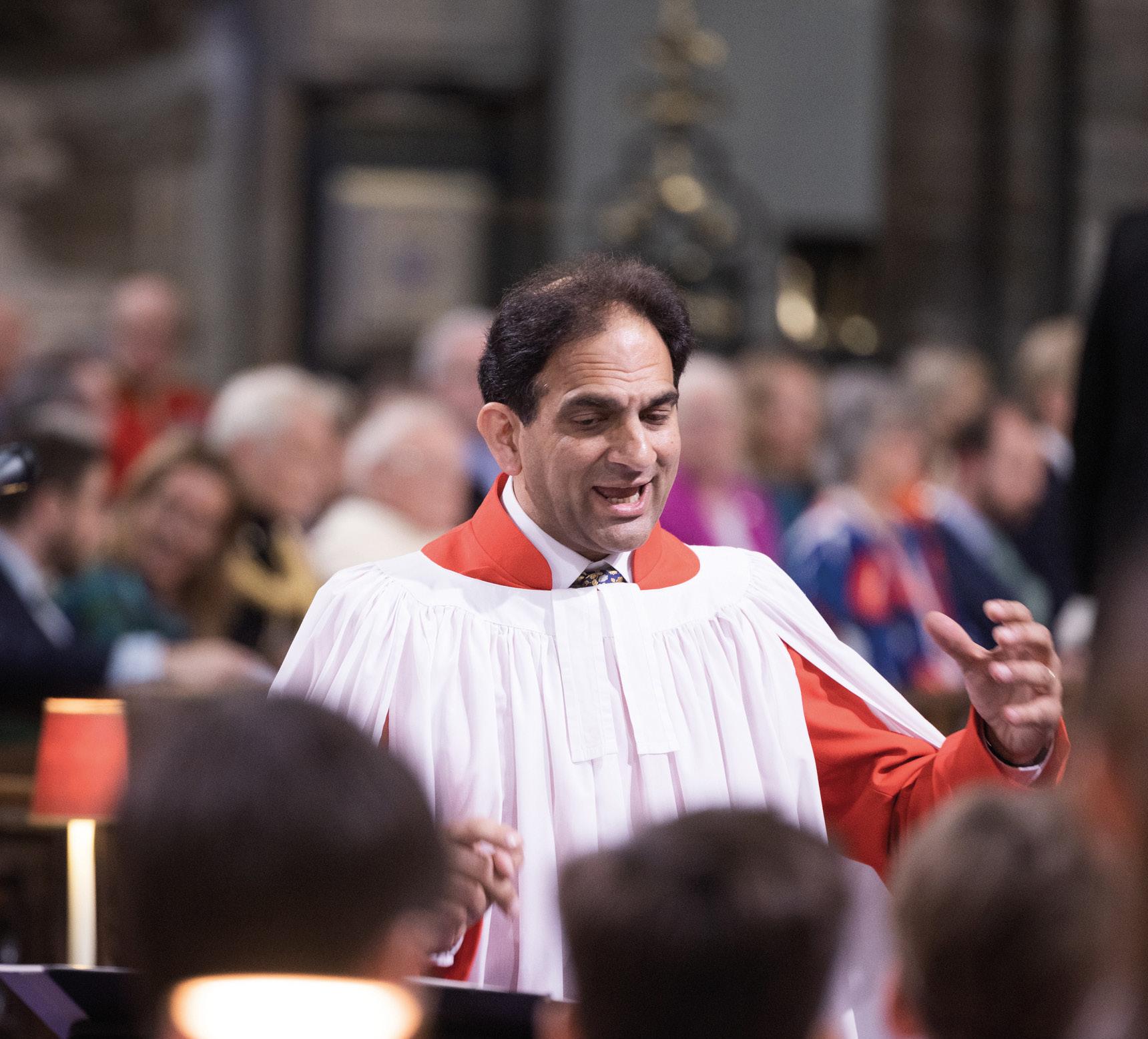
Everyone involved has marvelled at the close attention paid by the King to every detail of the repertoire but as Nethsingha commented ahead of the event, ‘all coronation services are a mixture of deep-rooted tradition and contemporary innovation. As was the case in the four twentiethcentury coronations, the choice of music reflects the cultural breadth of the age in which we live.
‘It has been a privilege to collaborate with His Majesty in choosing fine musicians and accessible, communicative music for this great occasion,’ he added. Many of the singers in the expanded choir evidently felt it was a privilege to be rehearsed and conducted by him, judging by the comments on social media afterwards, praising his calm demeanour and skilful management of the occasion; the musical results were evident to everyone who heard them.
With so much of the music arranged for orchestra, the role of the Abbey’s Sub-Organist Peter Holder, also an ISM member, was less obvious than it is at most services, especially as the most spectacular work for solo organ to be performed on this occasion, Iain Farrington’s jazzy Voices of the World, one of the 12 pieces specially commissioned for the Coronation, was actually played by Assistant Organist Matthew Jorysz as part of the sequence of pre-service music. But one of Holder’s moments in the spotlight came earlier in the week, when he was filmed for BBCTV’s The One Show, demonstrating the organ’s sound.
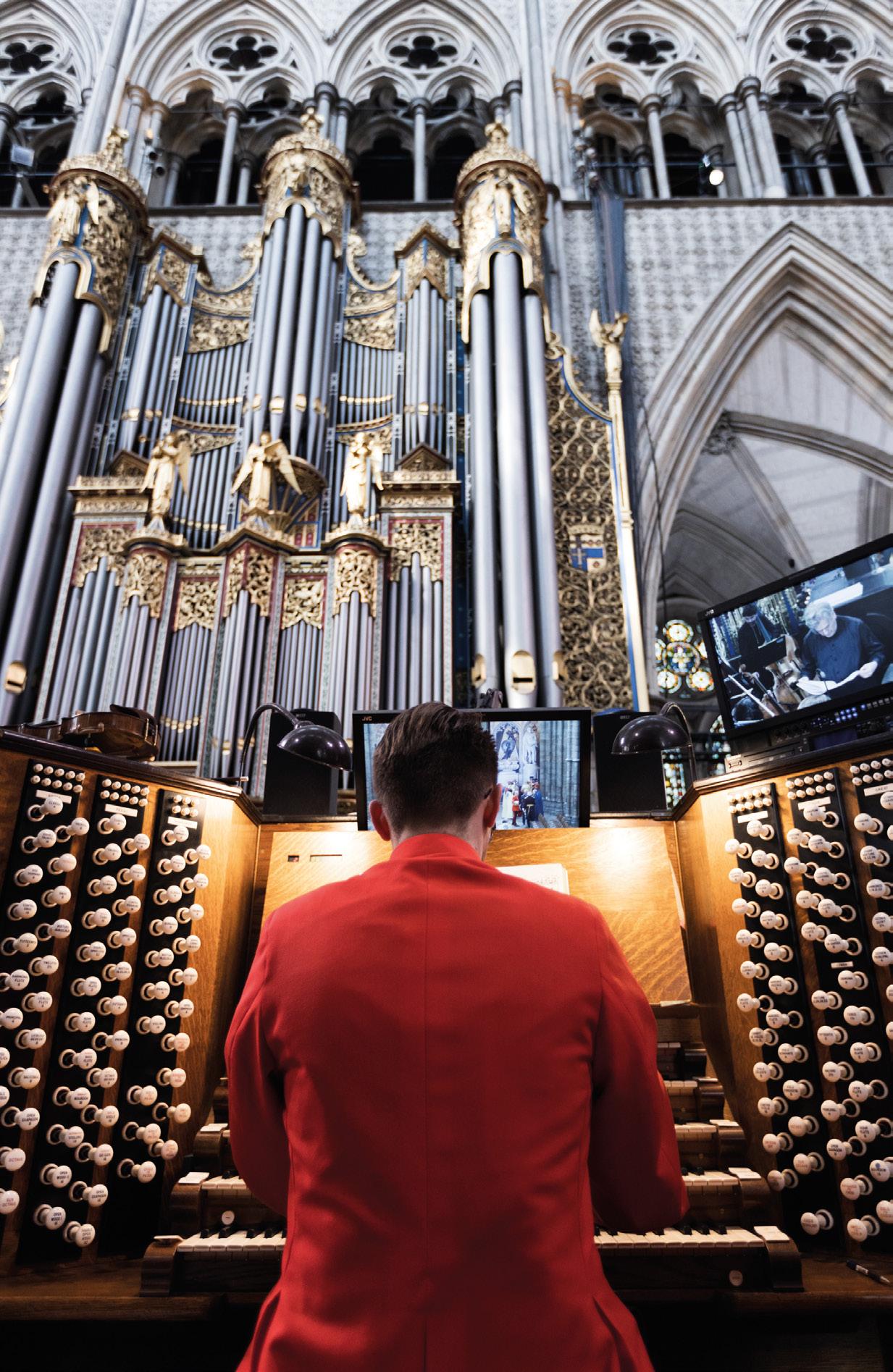
The choice of music reflects the cultural breadth of the age in which we live.
Andrew Nethsingha
Continued overleaf > 13 SUMMER
FOR THE CORONATION
‘There were beaming smiles a-plenty from the musicians involved in the ceremony…’
2023 MUSIC
This was a Coronation like no other, featuring women bishops, girl choristers (from Truro Cathedral and Methodist College, Belfast), people of all ethnicities in numerous roles and no fewer than 12 pieces of specially commissioned music in a huge range of styles, six of which were by women.

The pre-service sequence began with the Monteverdi Choir and English Baroque Soloists filling the choirstalls and the space between to perform the first movement of J S Bach’s Magnificat in D BWV 243, conducted by ISM member Sir John Eliot Gardiner, at his usual sprightly pace … there were jokes on Twitter that only he could manage to pack this and two other Bach choral works plus Bruckner’s Ecce sacerdos magnus / Behold a great priest into their short allocated slot before the Coronation Orchestra took over to play the first commissioned piece of the day, Brighter visions shine afar by the Master of the King’s Music, Dame Judith Weir, another ISM member.
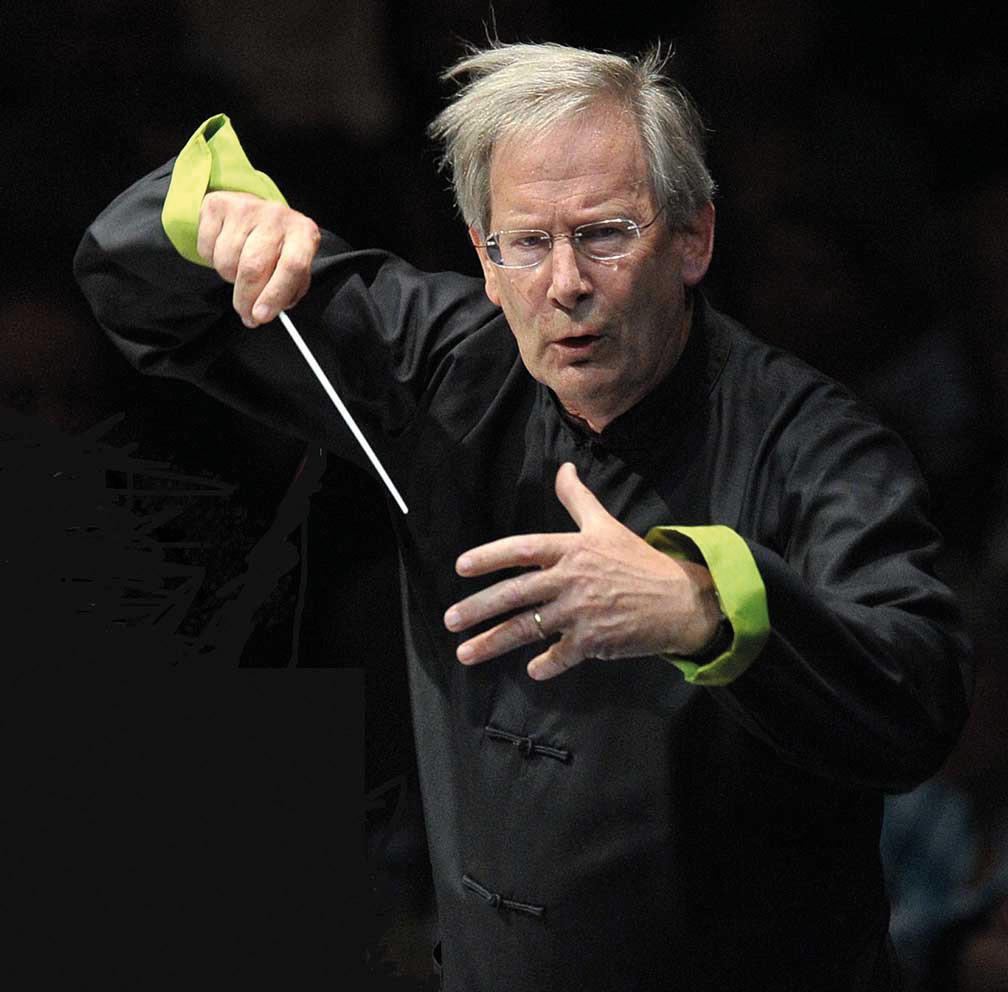
The title of this three-minute overture comes from the Christmas carol Angels from the realms of glory Dame Judith has admitted that she quite likes the impetus to just sit down and get on with writing that comes from a relatively short-notice commission, like this and her psalm setting for Her Majesty Queen Elizabeth II.
Another beautiful orchestral piece involved two ISM members: Alis Huws, the current Royal Harpist, was the soloist in Tros y Garreg / Crossing the Stone, a movement inspired by a Welsh folk tune from a harp concerto commissioned by the King when he was Prince of Wales from Sir Karl Jenkins
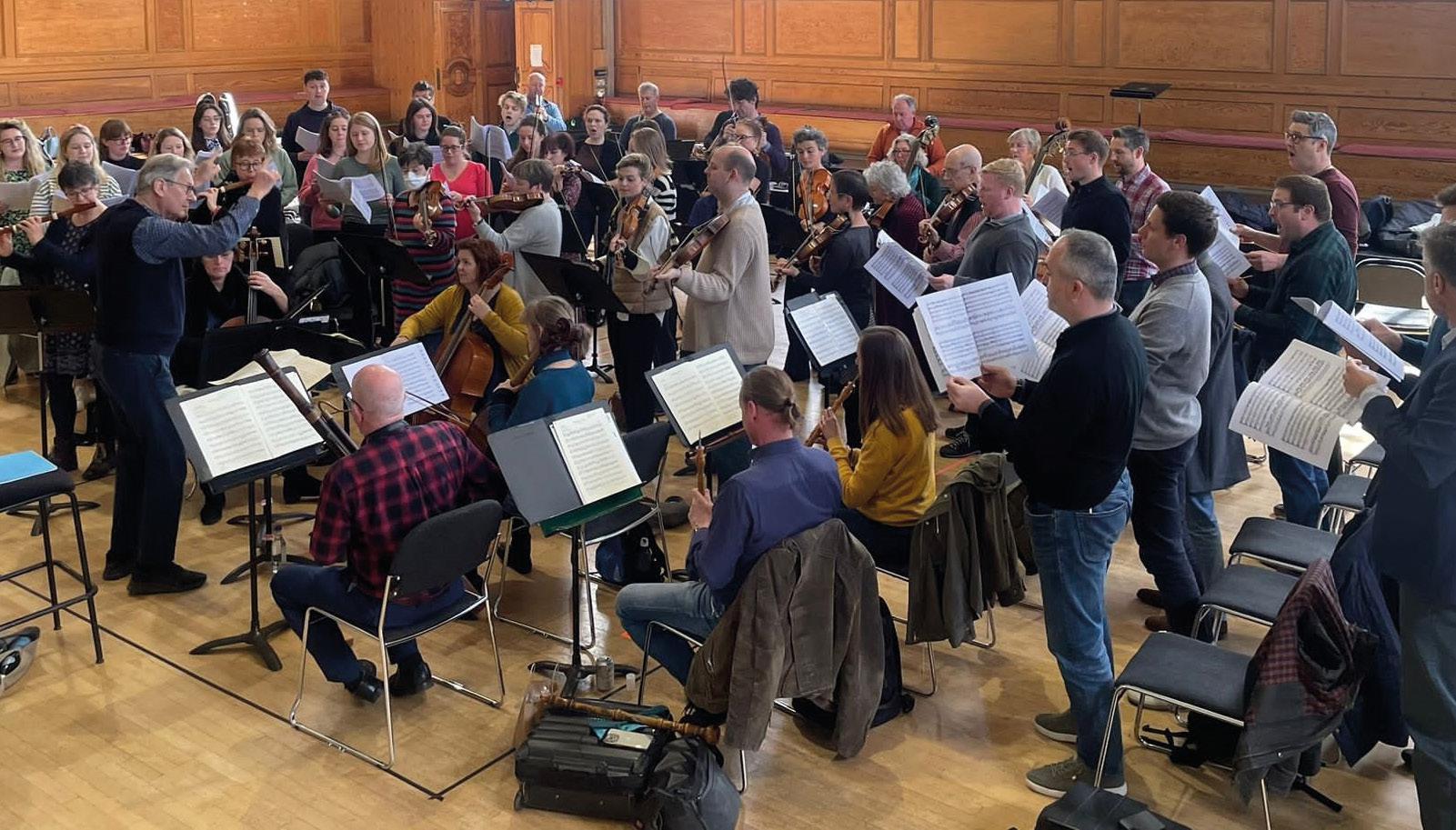
‘I saw HM Queen Elizabeth II’s coronation when I was only eight years old at home in Wales in 1953, on a tiny 12-inch television screen,’ recalls Jenkins. ‘Little did I think, many years later, I’d be involved in the coronation of the next monarch. It’s really thrilling.’
His concerto was composed for the first Royal Harpist of the modern age, Catrin Finch. Speaking to MJ before the Coronation, Alis Huws said she has played Tros y Garreg before in other arrangements, ‘but not quite like this! It’s really nice to have quite a strong Welsh representation, including the Welsh language for the first time ever in a Coronation.’
14
This provided a very dramatic moment early in the service, when Sir Bryn Terfel was the soloist in Paul Mealor’s new setting of the Kyrie eleison / Arglwydd, truhargâ / Lord, have mercy. Much more contemplative but equally dramatic in its way was the choir’s singing of the ancient plainsong hymn Veni, creator spiritus / Come, holy spirit in four languages –English, Welsh, Scots Gaelic and Irish Gaelic – representing the four nations of the UK. But the most visually dramatic moment came with the second of two settings of the Alleluia, before and after the Gospel reading, one for the main choir and the other for the Ascension Choir, both written by Debbie Wiseman, who talked so interestingly about her work at the recent ISM The Empowered Musician event. Dressed entirely in white, the Ascension Choir performed in a circle, swaying rhythmically as they sang –the first gospel choir ever to participate at a Coronation.

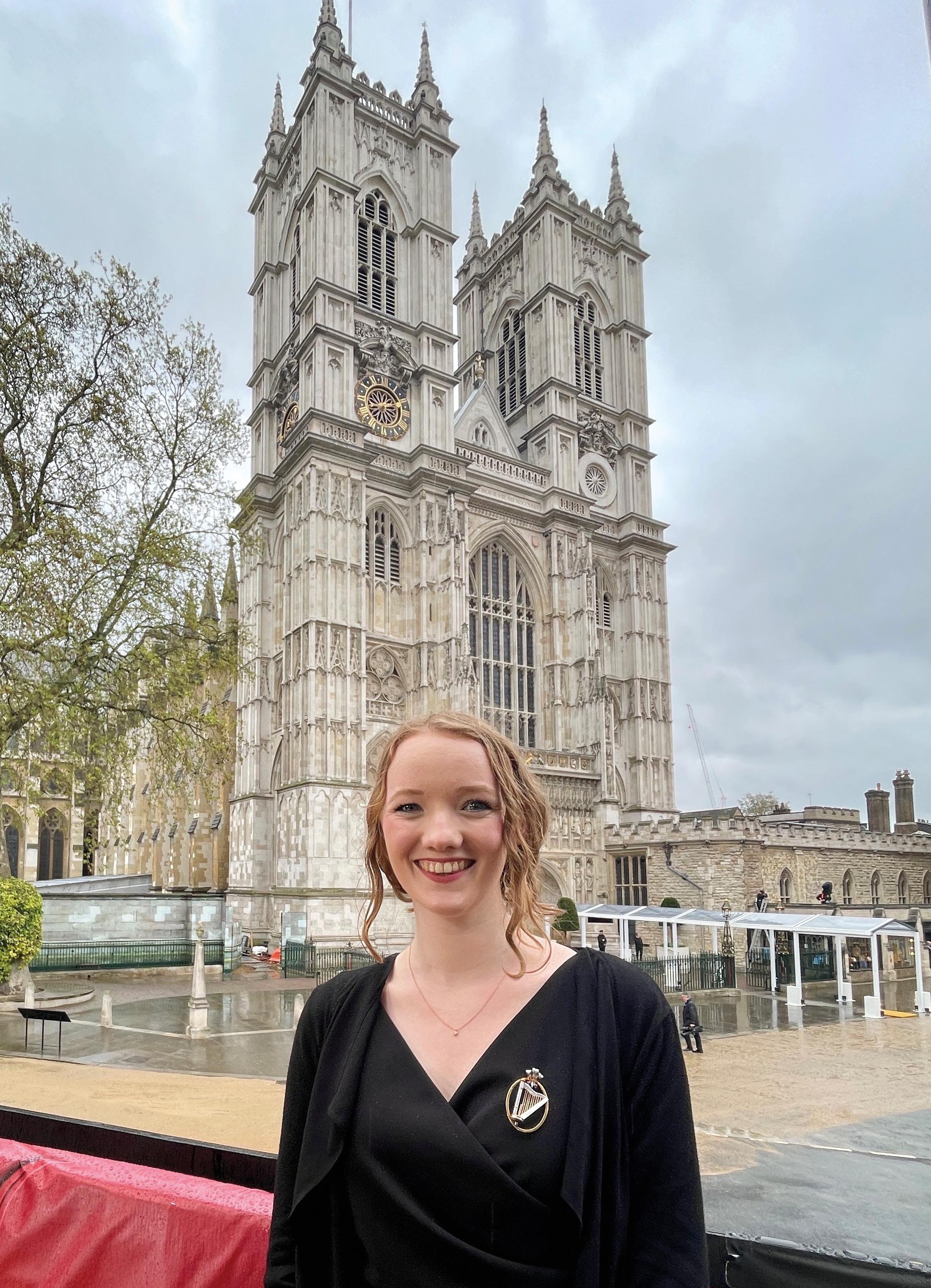
Baritone Roderick Williams needs no introduction to his fellow ISM members; he had a dual role at the Coronation, as the composer of one of the three arrangements of the King’s favourite hymn, Be thou my vision, as an orchestral triptych played before the service, and as soloist in Confortare by Walford Davies, originally composed for the Coronation of George VI in 1937. His was another of those smiles that lit up our television screens as he delivered the commanding opening phrase of the piece – ‘be strong, and show thy worth’ – before shifting gear for the expressive conclusion – ‘keep the commandments of the Lord thy God, and walk in his ways’.
It was evident from the social media conversations afterwards that, as ever, Willliams had captivated his audience both in the Abbey and on screen … though, with typical honesty the singer himself tweeted: ‘Thank goodness for Andrew’s incredibly steady presence throughout. I began by singing straight to him… until I realised it was going to be Okay! Then I could risk looking beyond and singing to everyone. Thank you, Andrew.’
This was a Coronation like no other, featuring women bishops, girl choristers (from Truro Cathedral and Methodist College, Belfast), people of all ethnicities in numerous roles and no fewer than 12 pieces of specially commissioned music in a huge range of styles, six of which were by women. The emphasis on music demonstrates its significance to the King; as Sir John Eliot Gardiner pointed out in a television interview that evening, ‘to have a head of state with that degree of passion for music is amazing’.
It’s really nice to have quite a strong Welsh representation, including the Welsh language for the first time ever in a Coronation.
Alis Huws
Right: Royal harpist Alis Huws
Opposite page, top left: The Monteverdi Choir rehearsing for the Coronation Photo: Monteverdi Choir
Opposite page, top right: Sir John Eliot Gardiner
Photo: Monteverdi Choir
Opposite page, bottom: Roderick Williams performing at the coronation service at Westminster Abbey
15 SUMMER 2023 MUSIC FOR THE CORONATION
Photo: Benjamin Ealovega
BBC Ensembles
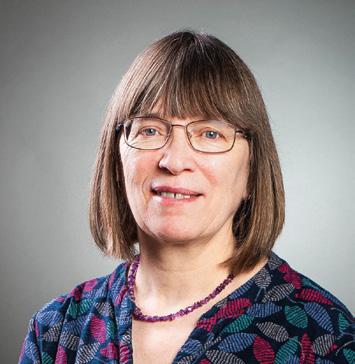
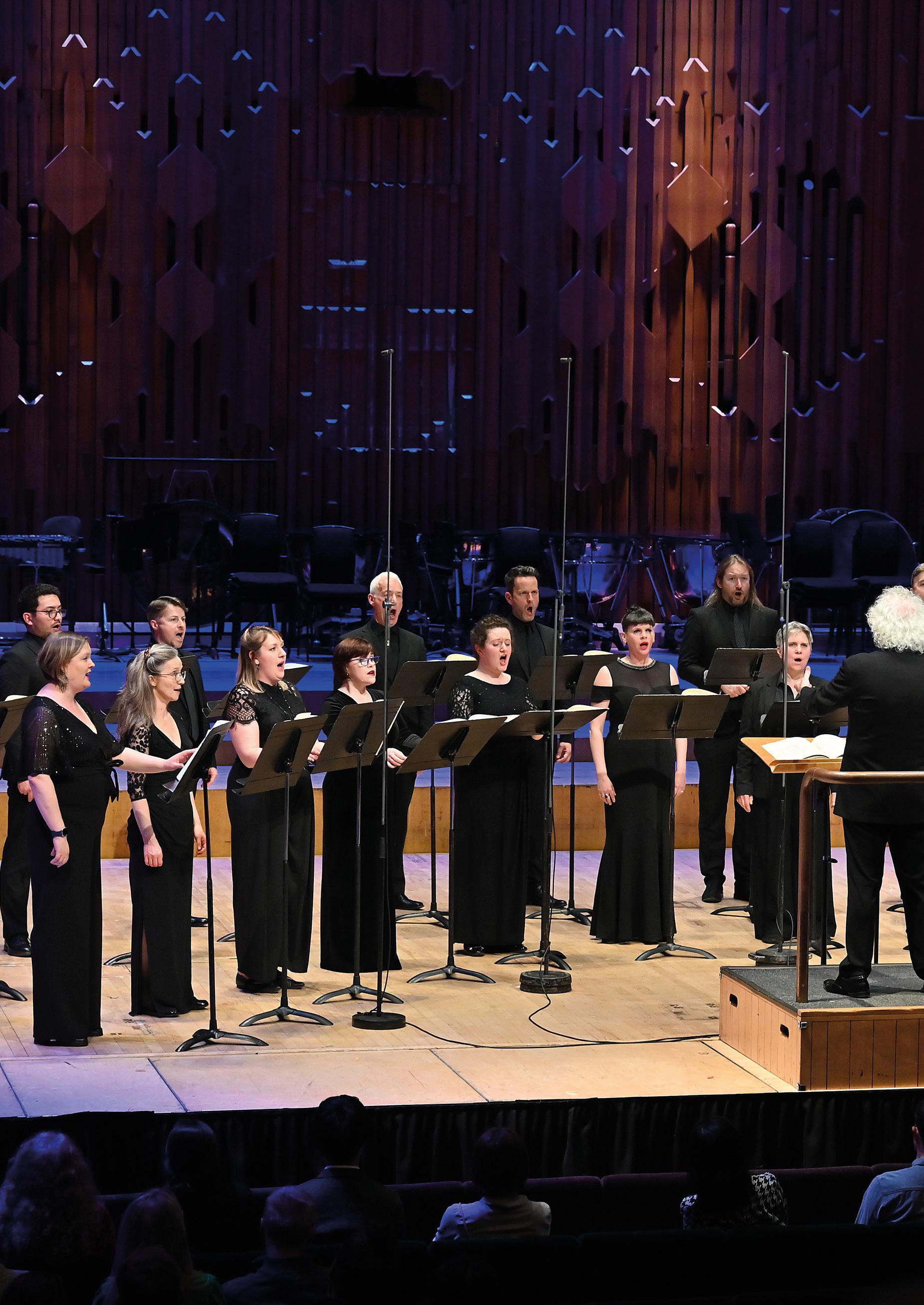 Text by Clare Stevens
Photo: Bruce Childs
Text by Clare Stevens
Photo: Bruce Childs
ISM MUSIC JOURNAL 16
‘We are in a fight, and we need to ensure that classical music remains part of the beating heart of our country, and of our culture’, said Sir Simon Rattle, speaking to the audience in the Barbican Hall, London, on 23 April, before conducting the BBC Singers in a spell-binding performance of Francis Poulenc’s Figure humaine
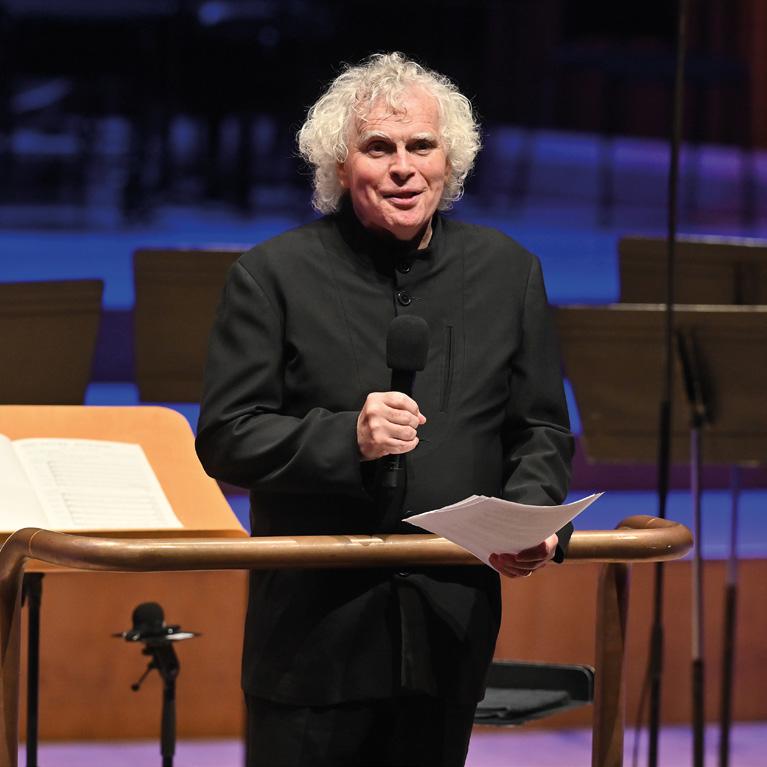
Written in 1943-44 in occupied France, this searing a cappella cantata for double choir sets texts from Paul Eluard’s wartime poetry, concluding with Liberté, a powerful expression of resistance. Unable to prepare a choir to perform Figure humaine to celebrate the liberation of Paris, Poulenc authorised the BBC Singers to give the work’s world premiere in London.
It was no accident that the enormously challenging piece had been chosen for the Barbican performance, an unexpected postscript to one of Sir Simon’s last concerts with the London Symphony Orchestra (LSO) before stepping down as its Music Director. Most of the audience had booked months previously to hear the orchestra play a single work: Mahler’s seventh symphony.
Rattle explained that he had invited the BBC Singers to give this performance as a gesture of solidarity with them and the other ensembles whose future is currently under threat. ‘After the Arts Council’s swingeing cuts in November, which have affected all of us and left some extraordinary groups fighting for their lives, we were all stopped in our tracks by the proposed vandalism by the BBC, of the which the closure of the BBC Singers was only the tip of the iceberg,’ he said.
‘When the two largest supporters of classical music in this country cut away at the flesh of our culture in this way, it means that the direction of travel has become deeply alarming. It’s clear we are facing a long-term fight for existence, and we cannot just quietly acquiesce to the dismantling or dismembering of so many important companies.’
Rattle went on to state bluntly that while of course everyone recognises that we live in a world and a country where people are struggling to feed and heat themselves, ‘none of this is a force majeure. It is rooted in political choices. And we have to ask ourselves … what kind of country do we want to live in?’ Musicians, he added, have become ‘past masters of doing more with less. But the closeness to the edge means that as support is constantly cut, there is no more room to manoeuvre … And as other political decisions affect music in schools and then music colleges, the vital organic pipeline that feeds our music will start to run dry.’
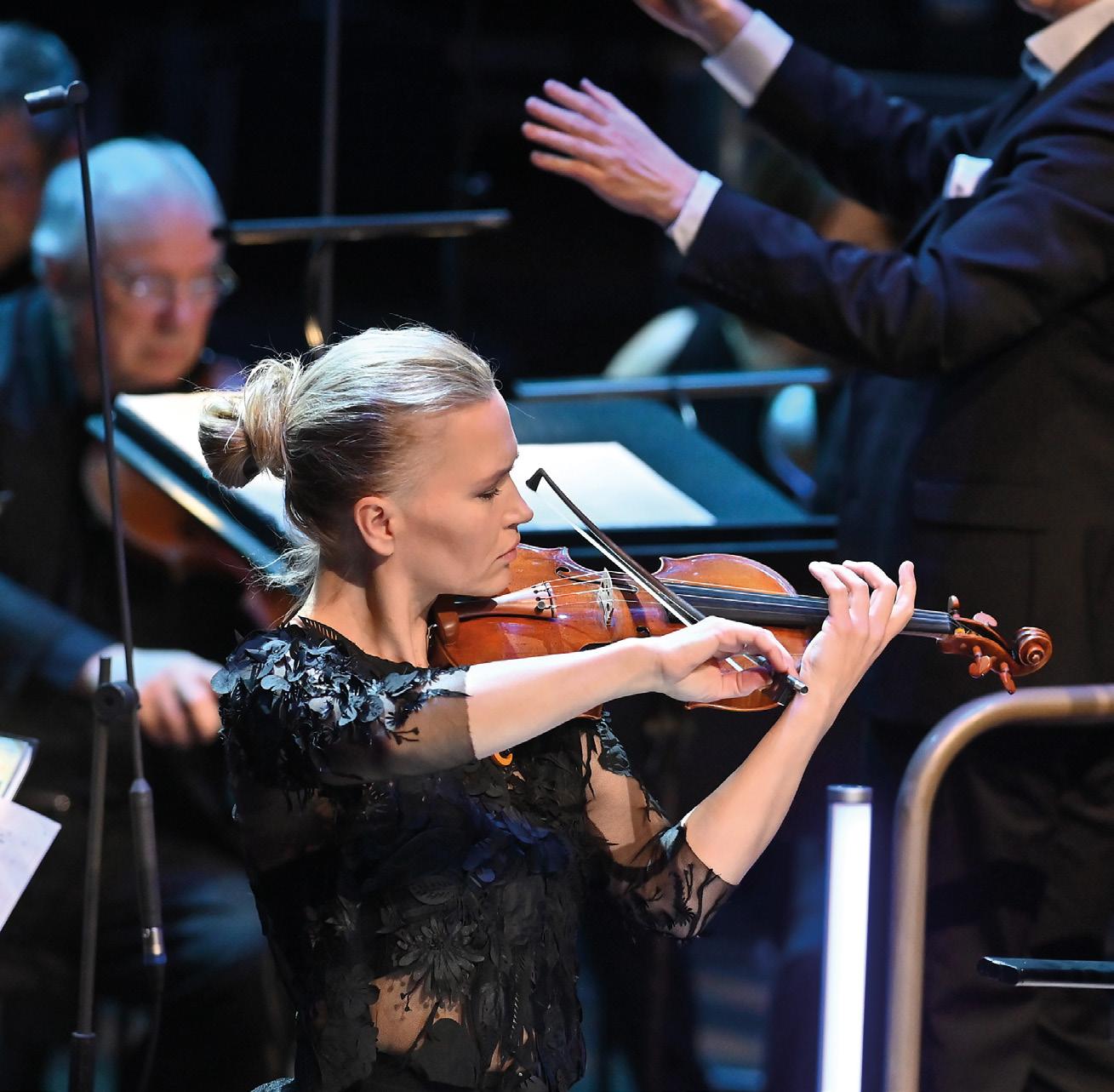
Continued overleaf >
When the two largest supporters of classical music in this country cut away at the flesh of our culture in this way, it means that the direction of travel has become deeply alarming.
Sir simon rattle
Left and above: Sir Simon Rattle conducting the BBC Singers and addressing the audience at the Barbican
Photo: Mark Allan
Right: The BBC Concert Orchestra
SUMMER 2023 BBC ENSEMBLES 17
Photo: Mark Allan
year that the BBC announced its ‘new strategy to strengthen its public purpose for classical music, delivering the best music to a wider audience, with a significant new investment in music education,’ with the aspiration of ensuring that ‘every pound of licence fee funding works harder for the sector and for our audiences now, and in the future’. While committing itself to ‘reinforcing the distinctiveness of the BBC’s five unique orchestras, artistically, educationally and geographically serving their own audiences whilst fulfilling their collective role in providing the widest range of content across Radio 3 and BBC platforms,’ the corporation also announced its intention of reducing salaried orchestral posts across the English orchestras – the BBC Symphony Orchestra (BBCSO) and BBC Concert Orchestra (BBCCO), both currently based in London, and the Salford-based BBC Philharmonic –‘by around 20%’
This would be achieved by opening a programme of voluntary redundancies across salaried posts in the three orchestras, with the aim of ‘creating agile ensembles that can work creatively, bringing in more musicians when needed and broadcasting from more venues in different parts of the country’
Simon Rattle was scornful about this in his Barbican speech: ‘Anyone with knowledge of how an orchestra
actually functions will know you can’t reduce the membership by 20% by natural wastage or in any other means – it is then no longer an orchestra and also all the years of building up a team expertise have gone out of the window. This should not need explaining.’
Referring to the impact of the Arts Council’s funding cuts on companies such as English National Opera, he said that ‘if you want opera to be experienced in more parts of the country, it is ludicrous to cut the grants of the companies who do exactly that … without an orchestra or chorus you no longer have an opera company … these are not things that can just be reassembled later, or bought in from Ikea.’
But it was the BBC’s announcement that its plans included closing the BBC Singers that provoked an instant, vehement and horrified outcry on social media and in the press. Most shockingly, the original plan was to terminate the contracts of the 24 members of the UK’s only full-time professional choir (as opposed to opera chorus) in early July.
Producer Jonathan Manners and Choral Manager Rob Johnston had to tell their colleagues that there would be no place for them in this year’s BBC Proms season.

The lack of consultation that had gone into this decision was evident from the fact that Sakari Oramo, chief conductor of the BBC Symphony Orchestra, was one of the first performers to voice his anger publicly, tweeting that he was ‘disgusted’ by the announcement, that the axing of the BBC Singers was an act of ‘blatant vandalism’
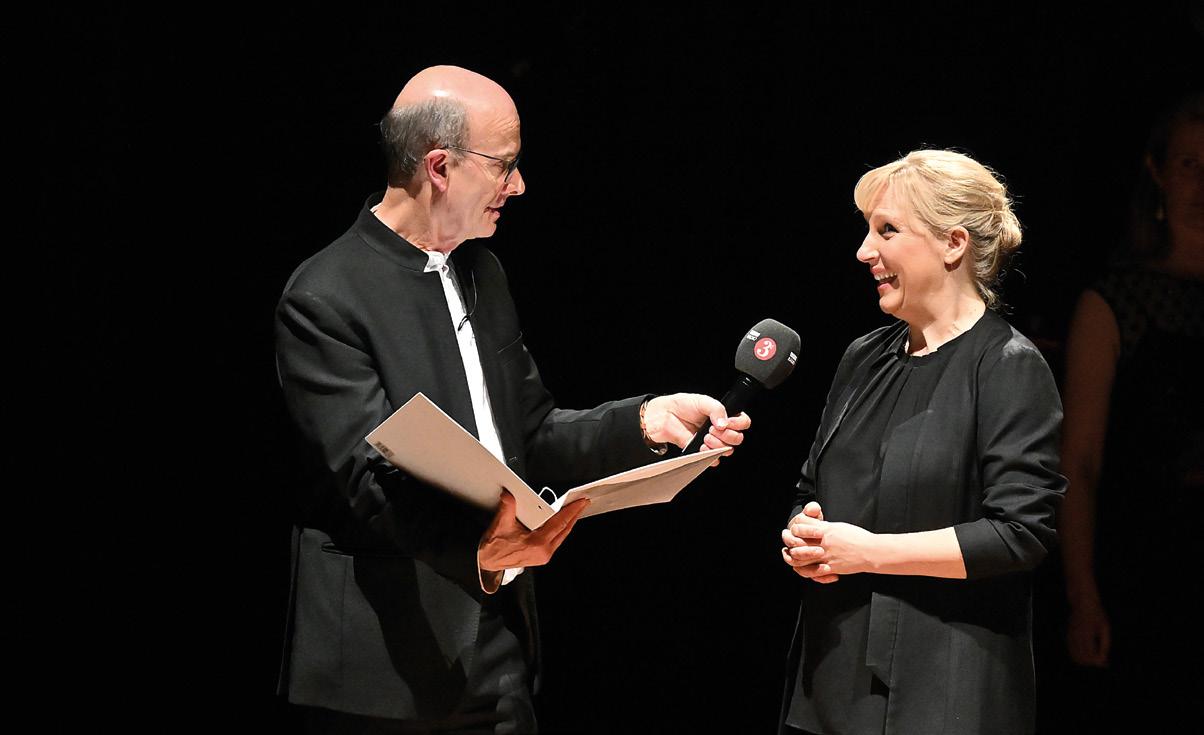
‘Anyone with knowledge of how an orchestra actually functions will know you can’t reduce the membership by 20%… it is then no longer an orchestra.’
Sir Simon Rattle
Above left: BBC Singers performing music by Shiva Feshareki at the BBC Proms 2021 Photo: Chris Christodoulou
Above right: Martin Handley interviewing BBC Singers Chief Conductor Sofie Jeannin before a broadcast concert
ISM MUSIC JOURNAL 18
Photo: Mark Allan
Other conductors, composers, singers, cathedral organists, music educators, publishers, conservatoire principals and administrators quickly added their voices to a growing protest, with a Change.org petition to stop the closure reaching 150,000 signatures within a fortnight.
On 24 March the BBC announced that it had suspended its proposal to close the BBC Singers, that it was in discussions with the Musicians’ Union to try to find alternative funding models, and that the choir would after all appear at this year’s Proms. This was followed by an update on 13 April confirming that the corporation was also exploring alternatives to the proposed post closures in the English orchestras.
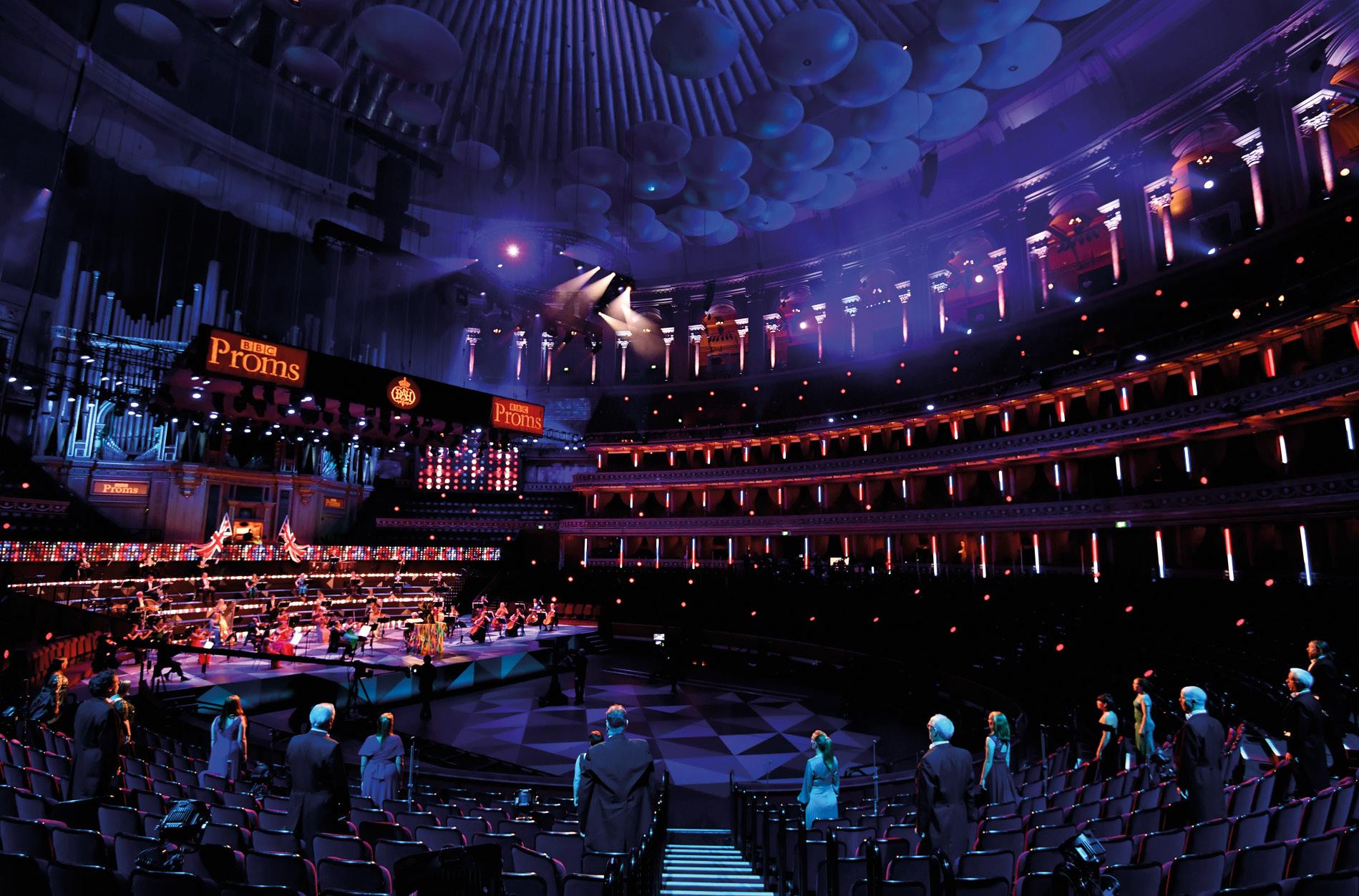
Enter Sam Jackson, the new Controller of BBC Radio 3, who joined Proms Director David Pickard to announce the 2023 Proms programme just five days after taking up the post. At a slimmed-down press briefing he addressed the elephant in the room immediately, explaining that discussions about the future of the ensembles were ongoing and confidential, but that he hoped a solution would be found and in the short term he was delighted that the BBC Singers would be taking part in his first Proms season. But the published Proms Guide which was distributed at the briefing and is now on sale in newsagents’ across the country revealed how the season was meant to look – in their pre-centenary year the BBC Singers are absent from the index of performing groups, and a list of the concerts that have been hastily
slotted in for them can only be found online ( bbc.co.uk/ proms/events/performers/725af6df-7fea-4130-bd19963a62313d2b).
Lorna Clarke, the BBC’s Head of Music who has come in for a lot of the criticism aimed at the corporation, insists that nobody doubts the quality of the ensembles; in a difficult financial climate, she and her colleagues are simply trying to fulfil their obligations to licence payers by reaching more of them by investing in choral and orchestral music across the UK rather than concentrating resources in London. Meanwhile in Stratford, East London, the new studio building in the Olympic Park intended to be a new home for the BBCSO, BBCCO and BBC Singers is nearing completion, following years of discussion over the acoustic flexibility needed to enable them to share studio space with rock and pop musicians. Will the Singers ever move into it? At the time of writing, that seems to be anybody’s guess.
Right: BBC Singers with conductor David Hill and composer Judith Weir at Southwark Cathedral
Below: BBC Singers at the Last Night of the Proms 2020
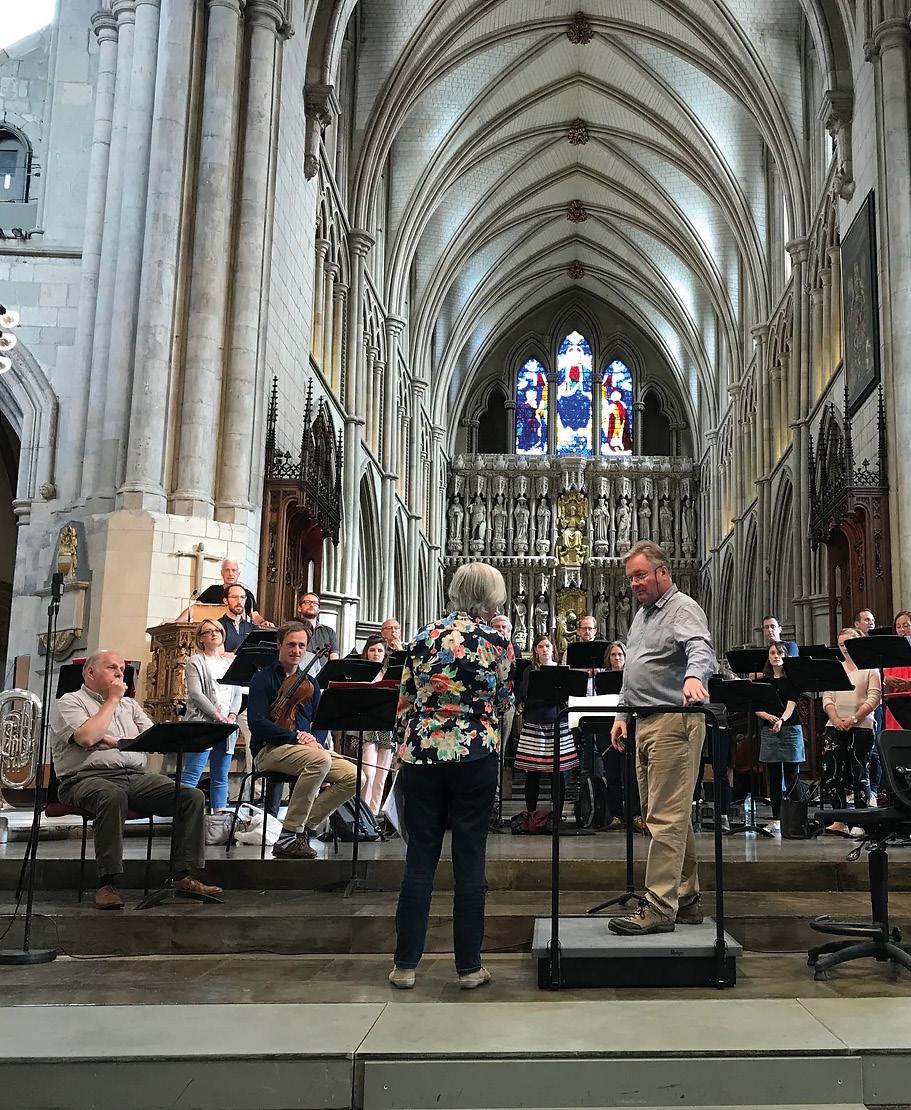 Author
Photo: Chris Christodoulou
Sir simon rattle
Author
Photo: Chris Christodoulou
Sir simon rattle
SUMMER 2023 BBC ENSEMBLES 19
… without an orchestra or chorus you no longer have an opera company … these are not things that can just be reassembled later, or bought in from Ikea.
Celebrating the Suzuki Method
Helen Brunner, Emeritus Director, Suzuki Gala 2023, explains what was involved in organising this year’s international showcase event at the Royal Albert Hall, and asks why prejudice against Suzuki teaching still exists in the UK
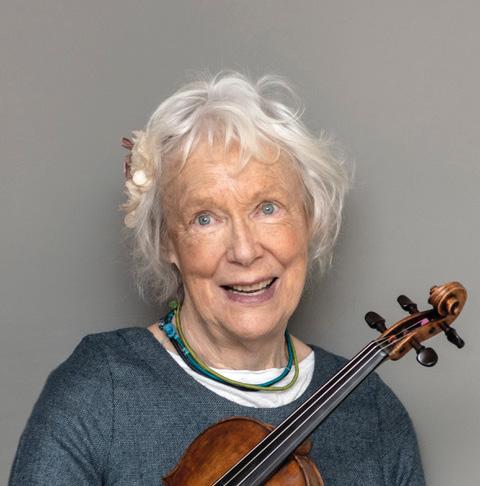
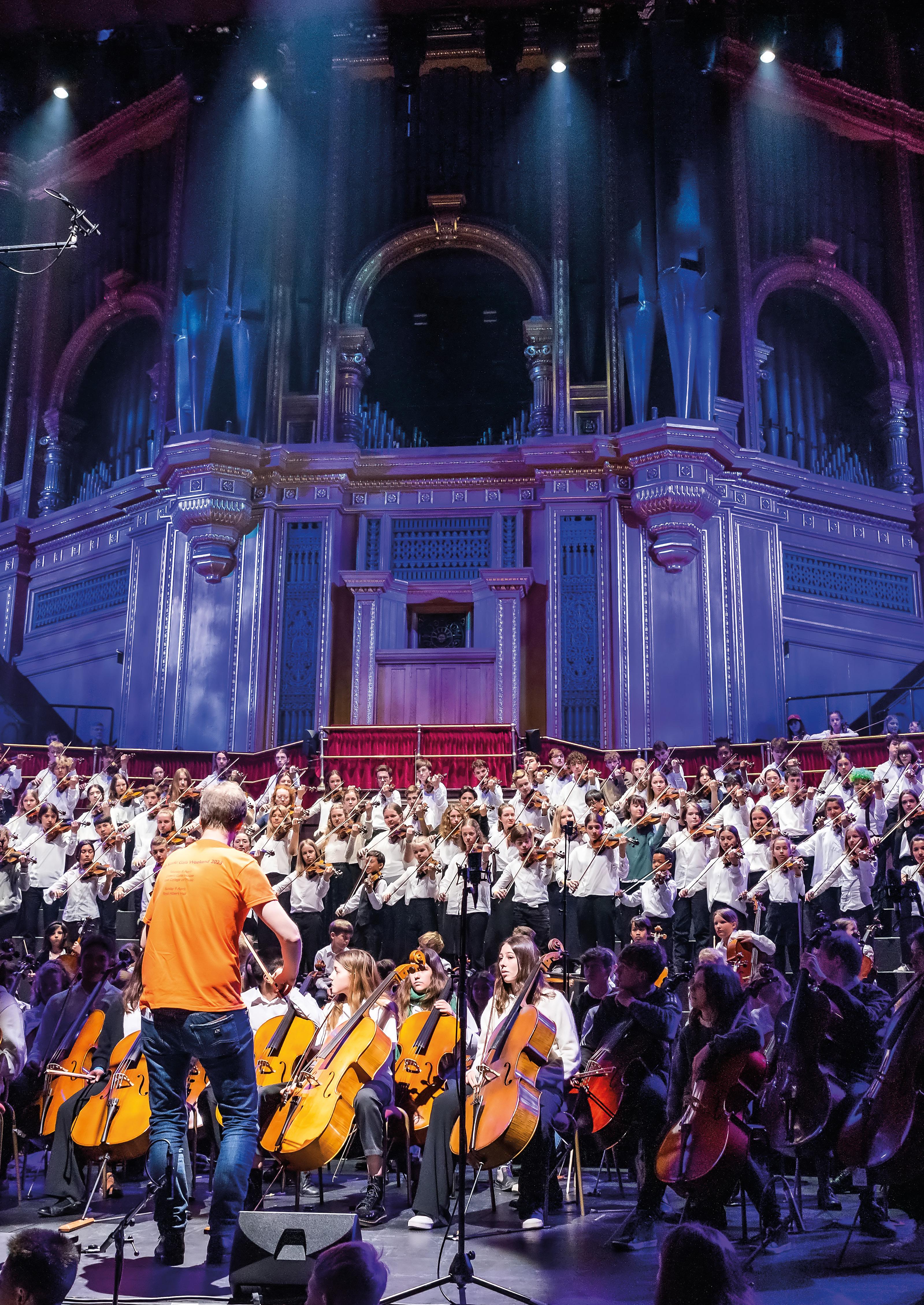 All images: Bill Hiskett
All images: Bill Hiskett
20 ISM MUSIC JOURNAL
Nearly 2,000 performers from all over Europe and beyond travelled to London to participate in the British Suzuki Music Association’s Gala concert on 9 April 2023 at the Royal Albert Hall (RAH). Teachers and children came from Argentina, Australia, Belgium, Canada, Czech Republic, Denmark, Estonia, Finland, France, Germany, Hong Kong, Iceland, India, Ireland, Italy, Kazakhstan, Latvia, Lithuania, Luxembourg, Netherlands, Norway, Poland, Russia, South Africa, Spain, Sweden, Switzerland, Turkey, Ukraine, United Kingdom, United States and Vietnam.
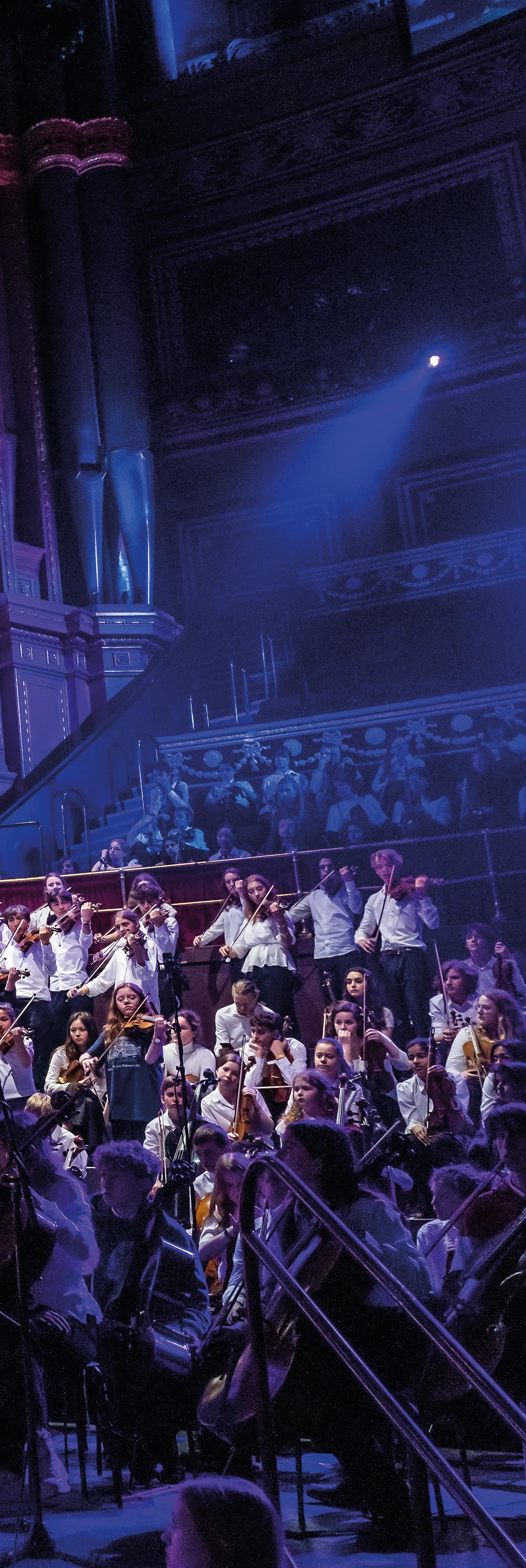
Everybody knew that this would be a once in a life-time experience.
Planning started more than two years earlier with finding the right date; Easter Sunday was chosen to embrace most of the European school terms. Then we had to book the venue, but the RAH has an 85% full house policy and children’s concerts, surprisingly, do not usually fill the hall, so I had to persuade them that with our young Suzuki performers, typically the whole family comes along too; in fact we quickly sold out.
Then the programme manager was alarmed that our children were playing the entire concert from memory. How is that possible? No music, no stands, no chairs, no single conductor and only one day of rehearsal? And behaviour was a huge issue. I had an email saying they thought that in proposing to put on a gala, I ‘had not quite understood the aesthetic of our hall’. We patiently explained the process behind the Suzuki method: how students are trained to memorise everything as they go, and how these thousand children learn about good concert behaviour right from the beginning. (The youngest child was five years old.)
Of course, we also depended on the 174 highly-trained Suzuki teacher-leaders who created the musical magic of each performance, and the 108 teacher-helpers, who stayed with the children in the hall throughout the concert. Detailed organisation, a pencil and paper effort of ingenuity, was masterminded by Suzuki teachers Juan Drown and Mona Kodama. Registration for a mammoth event like this needs professional help. The process of registering every player was done off-site in the old BadenPowell House, Queens Gate and took two days.
Children were not auditioned to take part in the Gala, (except a few pianists, because of keyboard limitations) but they had to be a minimum of Suzuki Book 2 standard.
Rarely have I witnessed such clear evidence of the power of music to break down the barriers of language, race, religion, disability, gender and nationality. The young musicians rehearsed together for only one day, next door to the RAH at the Royal College of Music. At least half of them did not speak English, but our Suzuki teachers know how to lead without words, and the results were electrifying.
Continued overleaf >
Images: British Suzuki Music Association’s Gala concert at the Royal Albert Hall
Photos: Bill Hiskett
‘Rarely have I witnessed such clear evidence of the power of music to break down the barriers of language, race, religion, disability, gender and nationality. The young musicians rehearsed together for only one day, at least half of them did not speak English, but our Suzuki teachers know how to lead without words, and the results were electrifying.’
21 SUMMER 2023 CELEBRATING THE SUZUKI METHOD
Helen Brunner
Stage management was nothing short of miraculous. The RAH creates a custom stage for every new client and our team were on site with the builders at 5am on the day of the concert. Tech rehearsals began at 9am, making space for a Steinway concert grand, 1,300 children, 300 adults, 20 pianos, and 20 orchestral players.
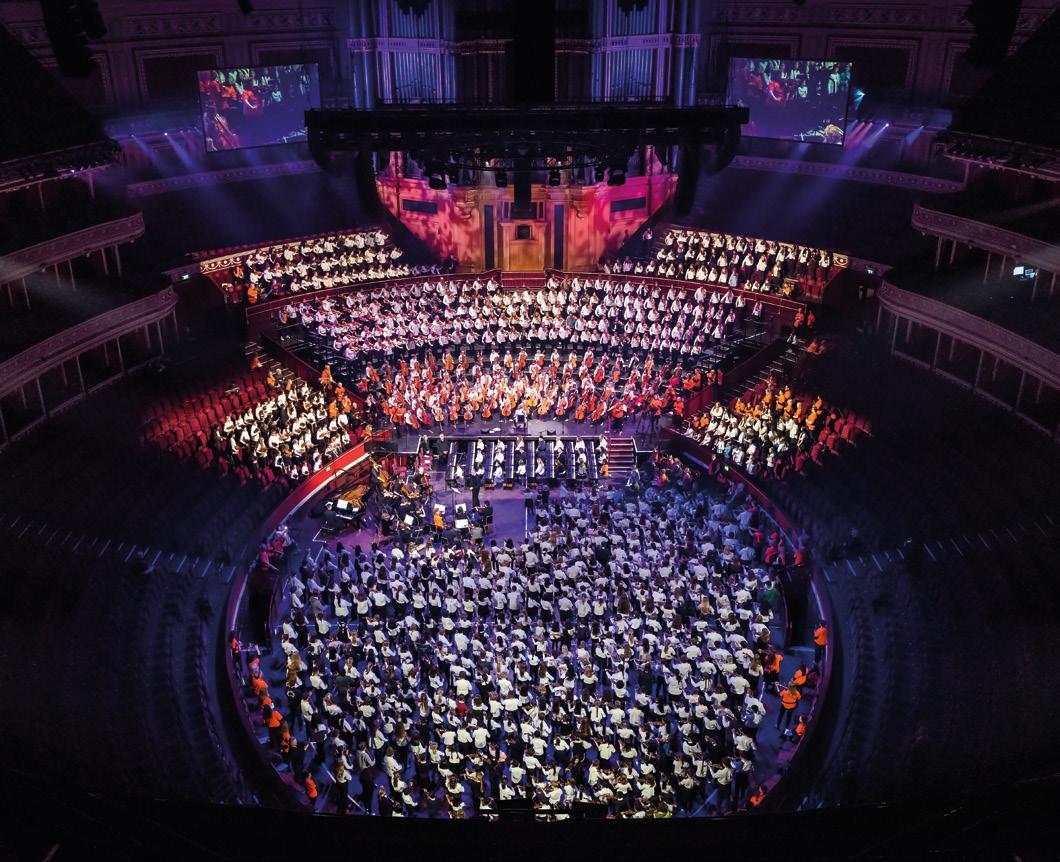
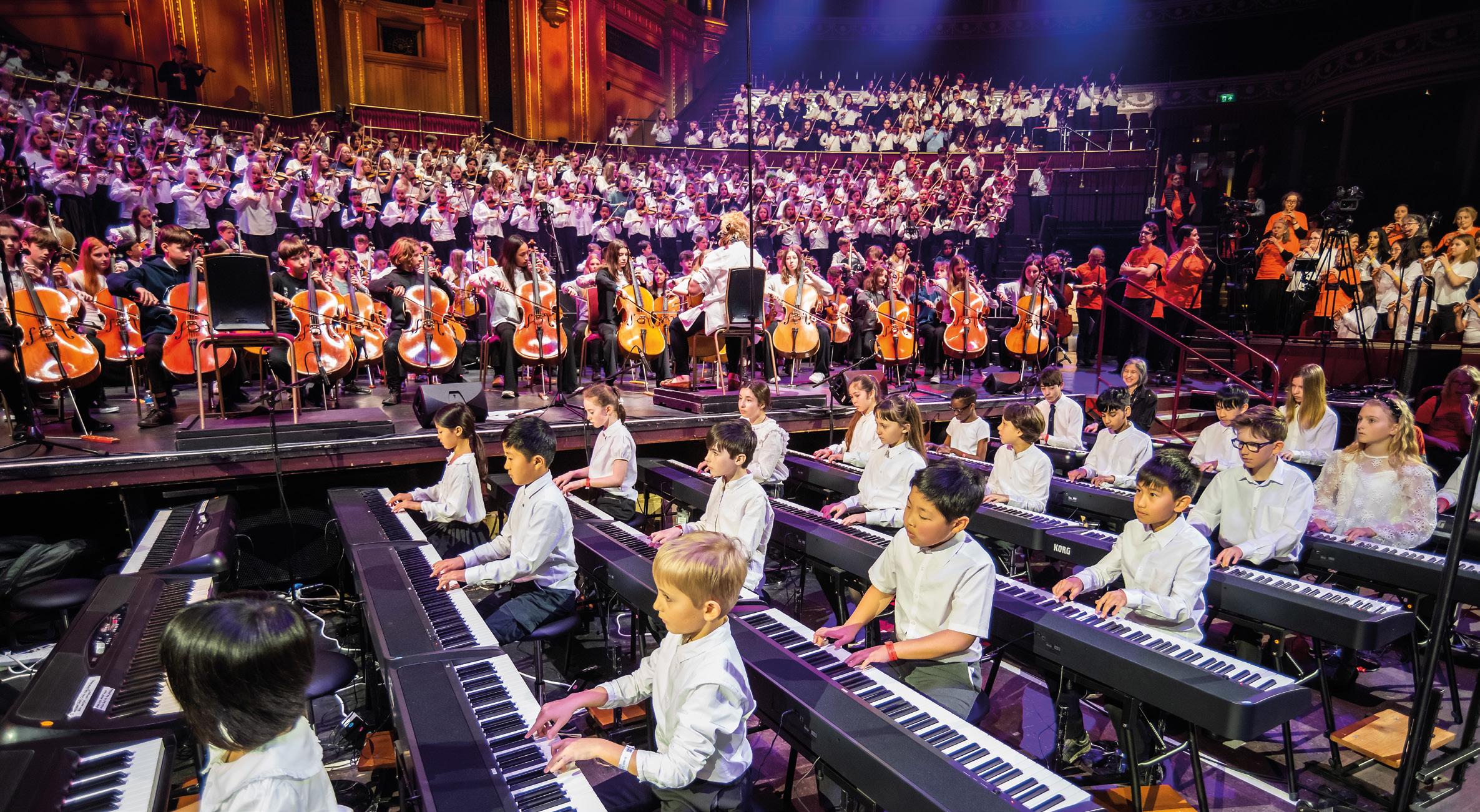
Some of the programme was instrument-specific, such as the Bach double violin concerto, Massenet’s Méditation and the Mendelssohn concerto for violin, the Haydn concerto for cello, and Mozart’s Rondo alla turca for piano. Some of it was played tutti, with the music arranged by the amazing Timothy Murray for all our instruments to play together. Tim was also commissioned to compose a new Fantasia on ‘Greensleeves’ for the occasion, which was breathtaking. The whole concert was backed by world-class piano accompaniment and a formidable professional string ensemble made up of former Suzuki students.
A planned Gala Concert in April 2020 was cancelled at the last minute because of COVID-19. The RAH reimbursed all tickets, then British Suzuki had to rebate all the registration fees. We had already organised thousands of Gala 2020, merchandise, expensive software and extra professional administrators and were nearly bankrupted. This time, we hoped to make a profit, but as a charity that is not our raison d’être. Every single musician, teacher/ leader, compère and helper attended without a fee. We had a home-stay scheme for those who wished to stay with Suzuki families, but hundreds of Suzuki teachers paid their own air fares and hospitality.
This extraordinary generosity is only possible because of each individual’s gratitude to their teacher, Dr Shinichi Suzuki, the founder and inspiration behind the Suzuki Method. He changed our lives for ever. His vision was to use music to bring people together and make the world a better
The programme manager was alarmed that our children were playing the entire concert from memory. How is that possible? No music, no stands, no chairs, no single conductor and only one day of rehearsal?
22
Helen Brunner
place. Personally, I feel incredibly lucky to have been born on the same planet as Suzuki, in his life-time.
Unfortunately, there is still systemic prejudice against the Suzuki Method in our professional schools and conservatoires. One of my own violin students was awarded a place at the Purcell School last year and at her first violin lesson was told, ‘we don’t have anything like Suzuki here. We regard the Suzuki Method as “cheating education”.’ My pupil spoke with other former Suzuki students at the school: they told her they never dared mention the word Suzuki in their lessons. She decided to leave.
In 2023, is there a UK Conservatoire brave enough to include a Suzuki Junior Department, where parents are welcomed into the lessons, recordings are listened to at home, and regular group lessons enjoyed, as they are at the Juilliard School, Curtis or Eastman in USA? Where are the UK universities with Suzuki Teacher-Training departments, where graduates can do post-grad in-depth study to become trained Suzuki teachers, as in the University of Antwerp, Belgium? Suzuki students typically become Suzuki parents, as evidenced in my own studio. Some become Suzuki teachers and professional violinists, some become skilled Suzuki Teacher Trainers; British Suzuki Music Association has excellent Teacher Training programmes in the UK for violin, viola, cello, piano, flute and recorder. It is a long training, but a powerful one.
In Suzuki Method we are trained to find the potential and finest quality in every child, and in their parents. We start with rapid notes on one pitch until they sound good. The students have listened to recordings of the music they will play so many times that the sound has been internalised and is now absolutely part of them. With careful teaching, students match what they are playing to the music which is inside their head, forever self-correcting. Music is a performance art. It exists in the transference of beautiful sound from the heart of the composer to the heart of the listener.
The Royal Welsh College of Music announced recently that every undergraduate will now have three solo concert opportunities a year. In Suzuki Method children concertise all the time. We rejoice that our recording artist for Suzuki Violin Books 1, 2 and 3 is Hilary Hahn, another grateful former Suzuki student.
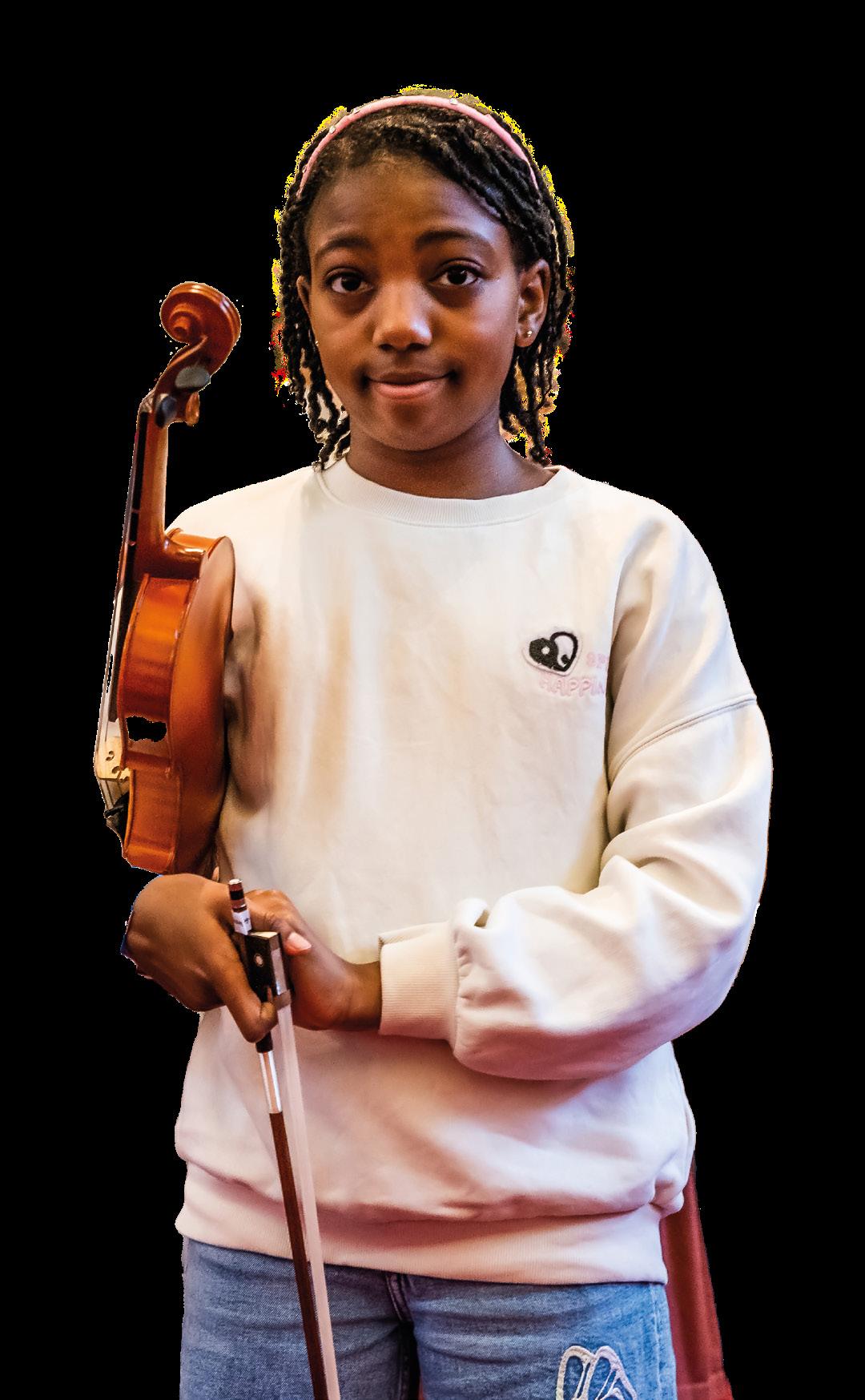
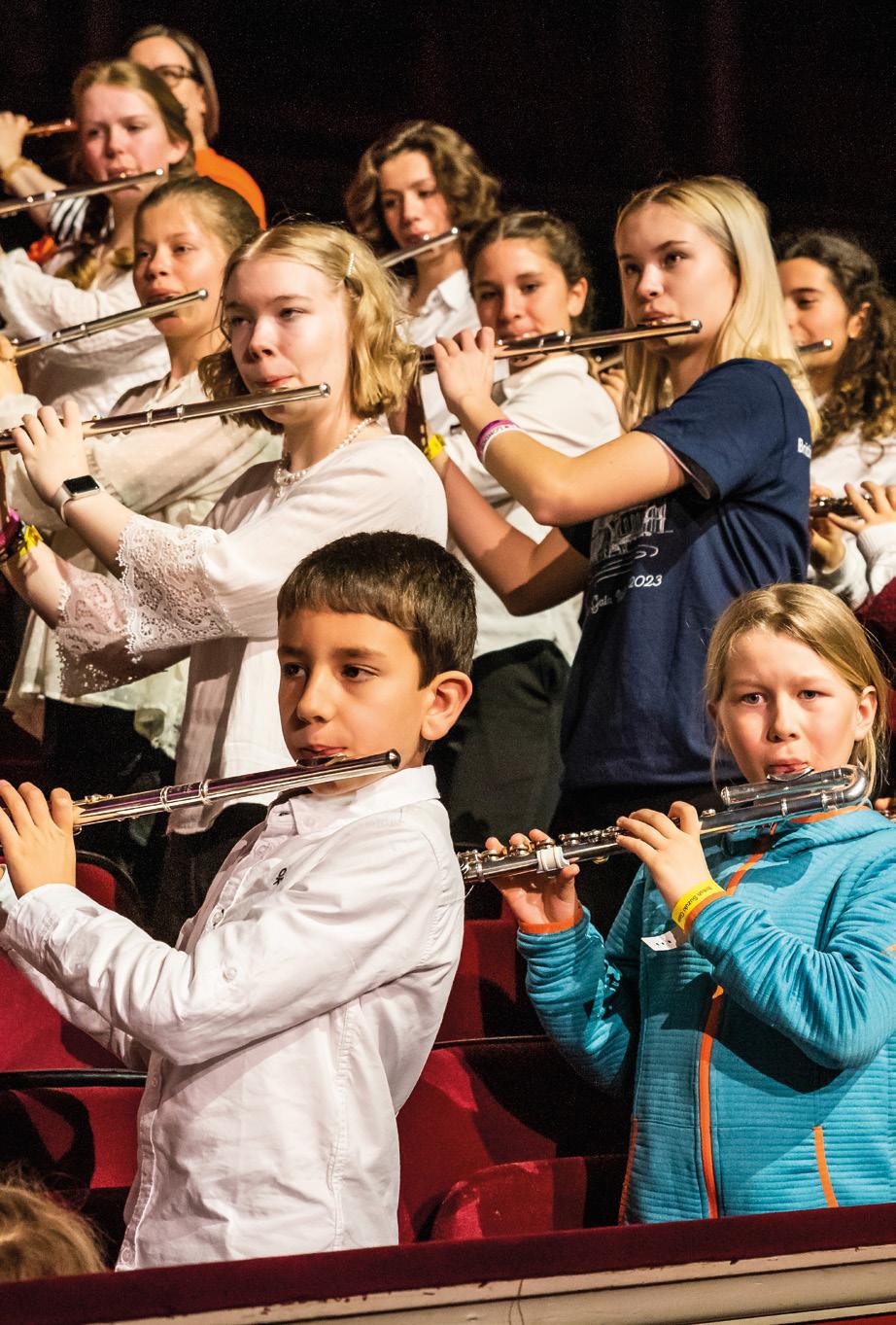
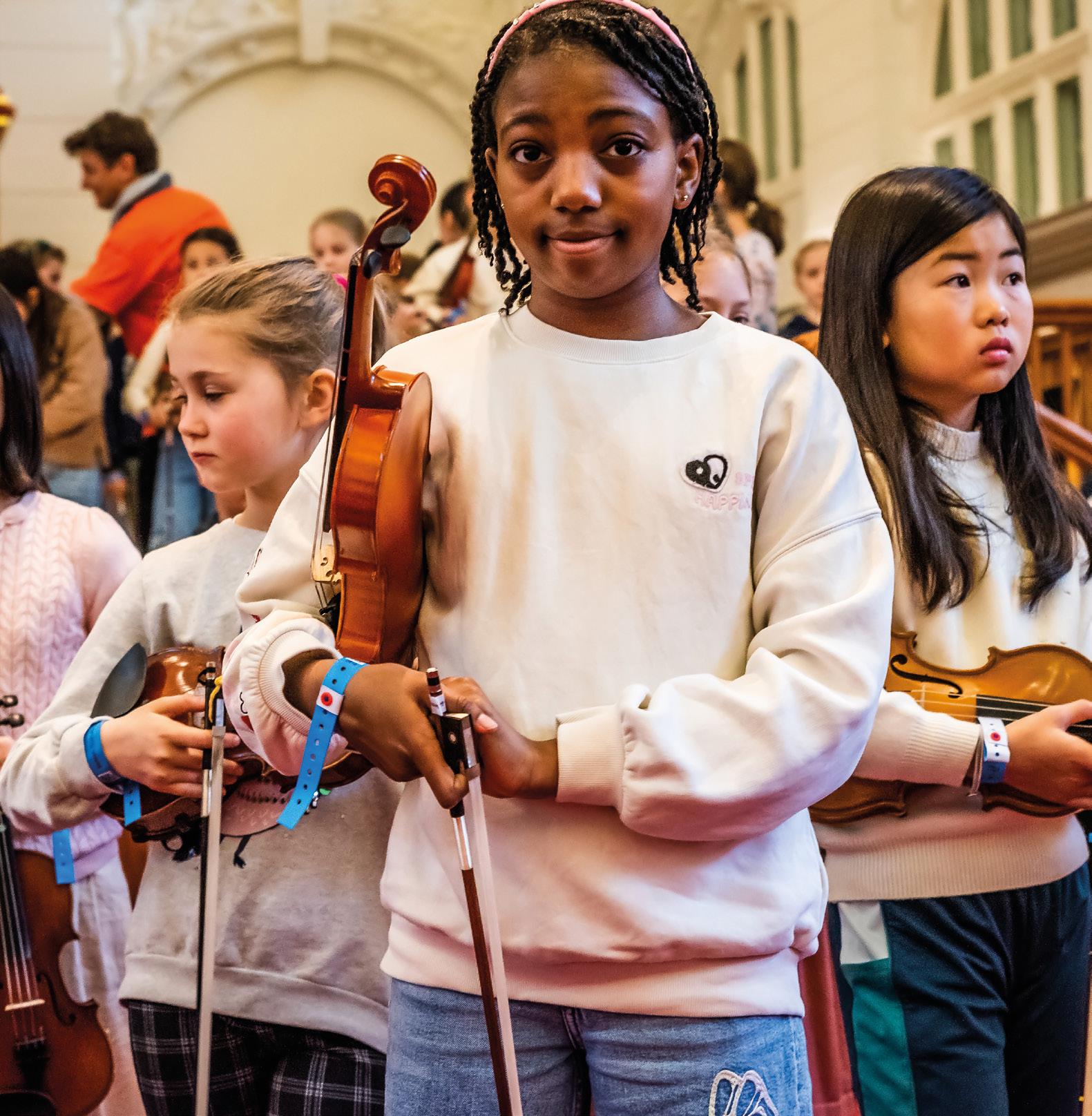
I travel a lot with my violin for my work, so I am a sitting target for people who want to tell me how they used to learn the violin/guitar/piano/harmonica and then gave up. When I ask why, it is usually the same: ‘I was rubbish’; ‘my Dad said I was no good’; ‘the teacher asked me to leave’; ‘the noise was horrible’. The number of students who learn an instrument in the UK, give up and never play again is a shameful and wasteful aspect of this country’s music education. It is almost as if teachers and families expect that to happen. Why?
britishsuzuki.org.uk
‘In Suzuki Method we are trained to find the potential and finest quality in every child, and in their parents.’
Helen Brunner
23 SUMMER 2023 CELEBRATING THE SUZUKI METHOD
PROFESSIONAL DEVELOPMENT
ISM Head of Charity Development
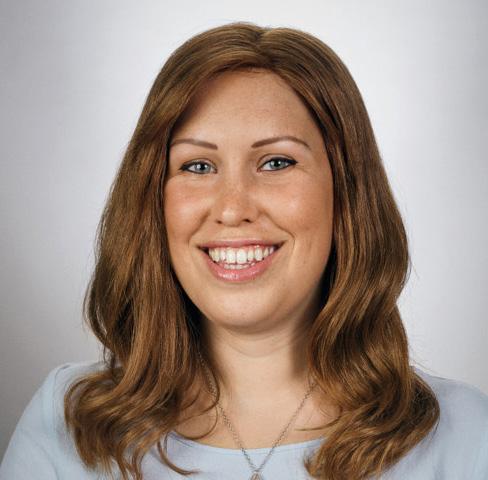
Ruth McPherson introduces our new resource produced with the Voices Foundation
The benefits of singing
Singing is a universal instrument – we all have a voice. It is integral to musical learning and a powerful way for children and young people to become proficient musicians.
Singing has also been shown to alleviate stress and improve children’s alertness, behaviour and self-esteem. It helps them bond – whatever the song or language. Through singing, young people can share emotions and express themselves non-verbally.
For all these reasons, the ISM has long advocated for singing to be at the heart of any school.
Finding your voice
To help primary teachers develop the skills to lead singing in the classroom, the ISM Trust and Voices Foundation, with the
support of the Schools Music Association, have launched a free new music education resource: the Primary Singing Toolkit.
It can be nerve-wracking for a teacher to sing in front of their class, and many primary teachers have had little or no musical training. This is why the Toolkit has been specifically designed to help non-specialist primary teachers build their confidence when running music lessons, and find their own singing voices at the same time.
Embedding singing into classroom lessons works best when teachers have confidence in their own abilities. With the English National Plan for Music Education calling on schools to use singing as a ‘golden thread’ to run through all primary education, and the National Curriculum in all areas of the UK requiring children to learn to sing and use their voices, there has never been a greater need for teachers to develop that confidence.
24 ISM MUSIC
Ruth McPherson
JOURNAL
What’s in the resource?
The Primary Singing Toolkit is made up of 14 videos, accompanying notes and lesson plans, which offer inspirational and practical singing strategies. It can be accessed and downloaded free of charge from the ISM Trust website.
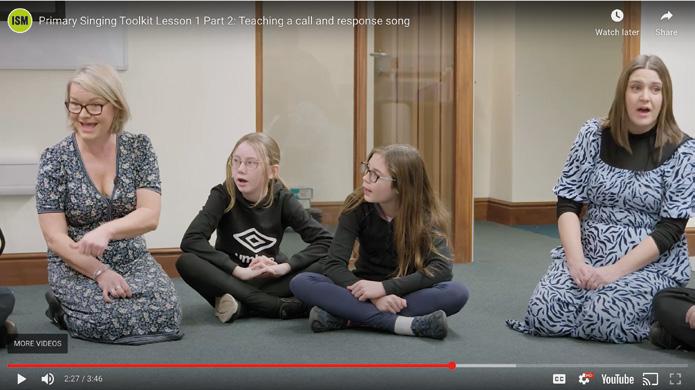
The videos and lesson plans take a holistic approach to singing, and cover areas including pitch and composition, notation, healthy singing practices and leading a choir.

The videos follow Voices Foundation’s Musicianship and Choral Directors, Jenny Trattles and Charles MacDougall, supporting non-specialist music teachers at Winterton Junior School, a state primary school in North Lincolnshire. Jenny and Charles teach a song in bitesize steps, which are easy for teachers to follow and imitate in their own schools.
Watch the webinar
A free webinar, jointly hosted by the ISM Trust and Voices Foundation, saw over 140 people sign up to watch Trattles and MacDougall lead a practical demonstration of some of the lessons included in the Toolkit, including conducting a school choir. They were introduced to the traditional Guyanese sea shanty, ‘Essequibo River,’ which runs throughout the entire resource.
You can watch a recording of the webinar on the ISM Trust website: ismtrust.org

Continued overleaf > 25 SUMMER 2023 PRIMARY SINGING TOOLKIT
‘Singing is a universal instrument – we all have a voice. It is integral to musical learning and a powerful way for children and young people to become proficient musicians.’
Response to the resource
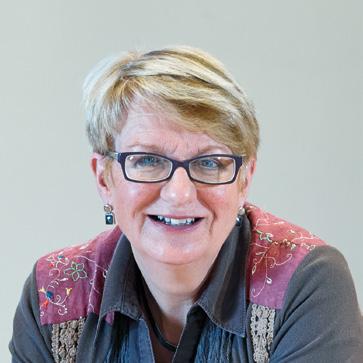

In just two months since its launch at the Music & Drama Education Expo 2023, the Toolkit has been viewed over 3,500 times, and received positive reviews.
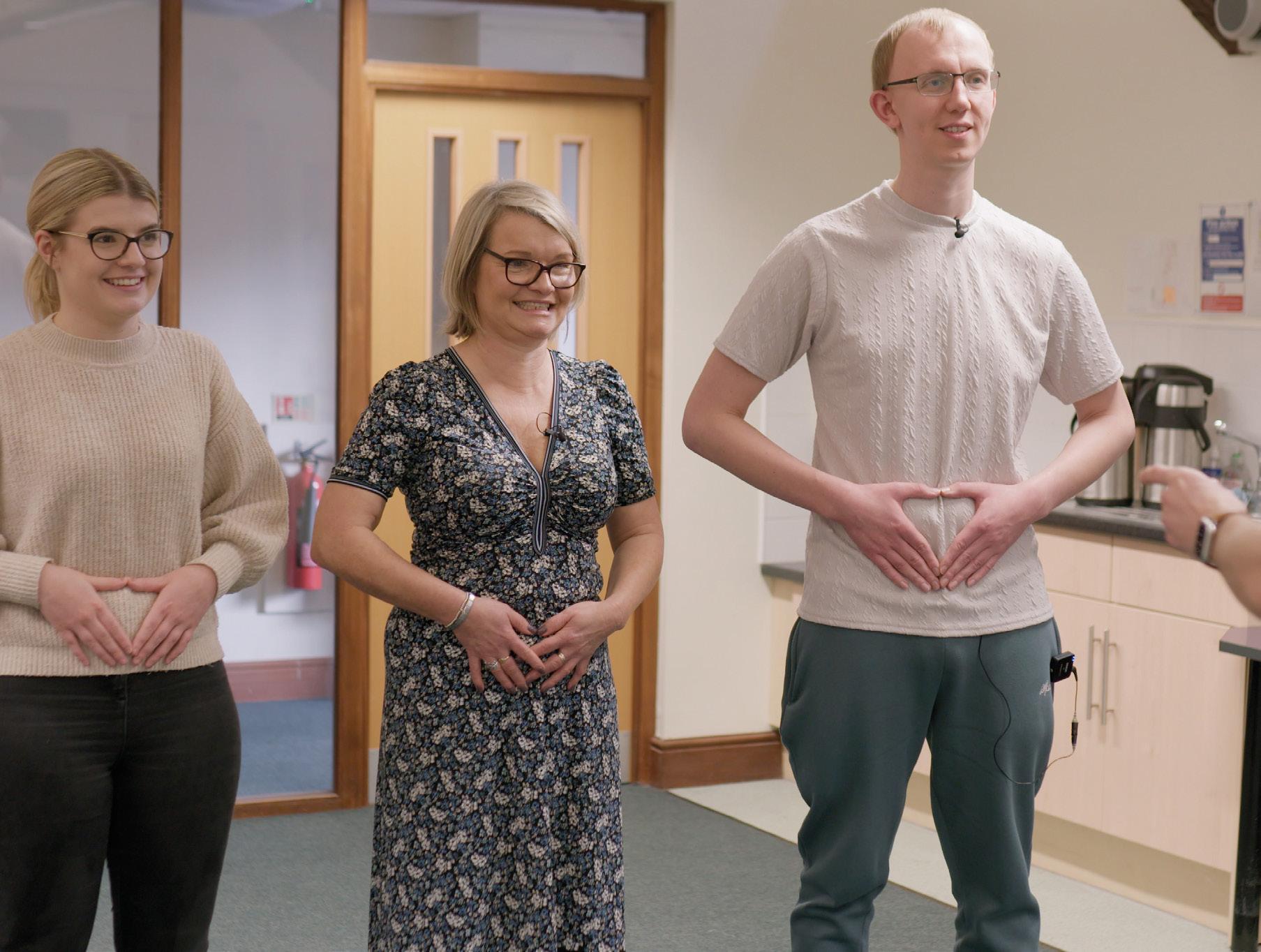
Users of the resource have described it as ‘ fantastically informative and accessible to everyone’, ‘really excellent’ and ‘very helpful and enjoyable – just what I needed!’.
Access the free resource: ismtrust.org/primary-singing-toolkit
‘I would urge all primary schools to download this new resource … This is primary music teaching at its best and a valuable resource has been created for all schools. The ideas demonstrated are an exemplar for further lessons on how to use the singing voice in the classroom.’
Suzi Digby OBE said: ‘The Primary Singing Toolkit is an absolutely vital resource. It brings the very essence of singing and its peerless value into the classroom. It gives non-specialist primary teachers the resources, skills and confidence to teach music, through singing, that they bring to other key subjects. By building “from the curriculum”, through the medium of singing, this will bring the highest quality music lessons to all children, not just to those deemed as musically talented. And, most importantly, it will give the skills and confidence to our primary teachers for life.’
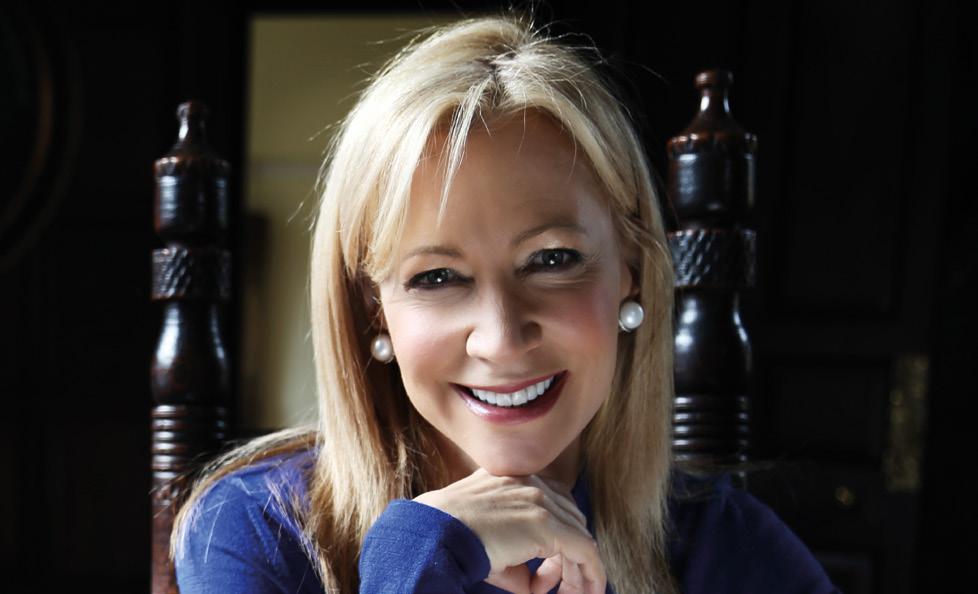
The Primary Singing Toolkit gives non-specialist primary teachers the resources, skills and confidence to teach music, through singing.
Suzi Digby
Top right: Sue Hollingworth Photo: Emile Holba
Above right: Suzi Digby Photo: Nick Rutter
26
Susan Hollingworth Music educator and choral director
ISM Trust
As passionate advocates of singing in schools and high quality music education for all, the ISM’s sister charity, the ISM Trust, devised the Primary Singing Toolkit to give music educators an accessible starting point.
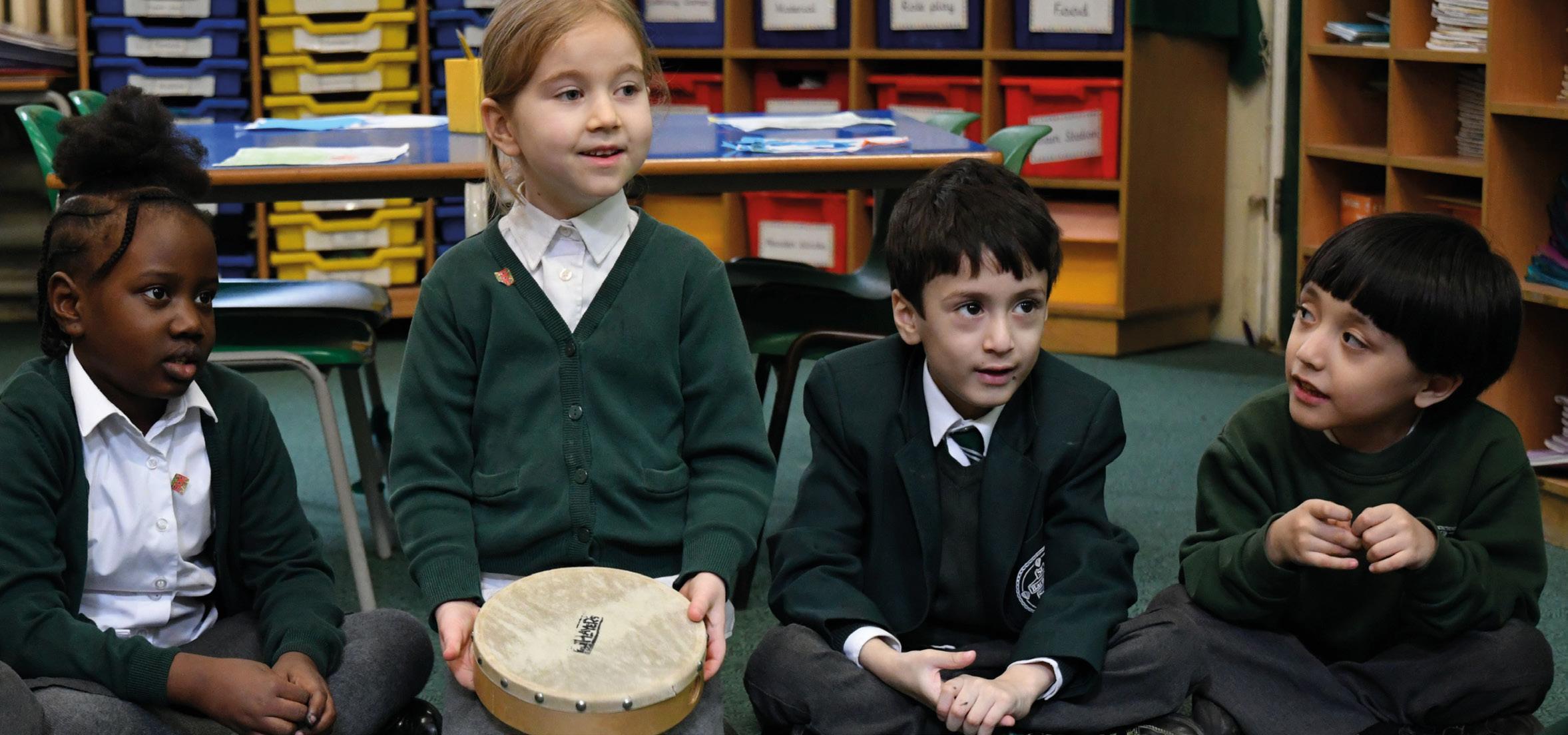
ISM Chief Executive, Deborah Annetts, said she aims for the resource to ‘help teachers build their confidence to sing with their pupils, to support schools to deliver the National Plan in England and to be of much use to teachers in all nations of the UK. As a subject association for music, we pride ourselves on delivering resources that help bring music into the classroom.’
Top of opposite page and below: Voices Foundation training sessions
Voices Foundation
Music charity Voices Foundation has been championing the power and importance of singing for 30 years. This partnership with the ISM Trust is its latest initiative for helping schools and communities to develop their music education.
Voices Foundation was founded in 1993 by choral conductor, music educator, and ISM President 2012-13, Suzi Digby OBE. Her main inspiration was the observation of the work of the renowned music educationalist Zoltan Kodāly in Hungary.
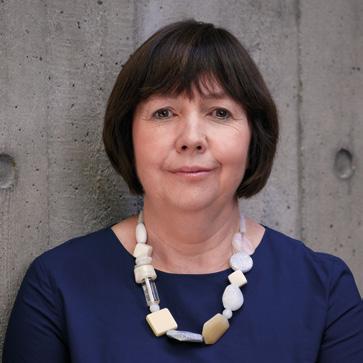
Since its formation, Voices Foundation has worked in hundreds of primary schools across the UK, transforming them into Singing Schools. Their Musical Foundations programme supports schools in establishing a progressive music curriculum and develops teachers’ skills and confidence to teach music through singing. They also run Choral Excellence programmes to promote a culture of whole-school ensemble singing, further helping children’s vocal and musical development.
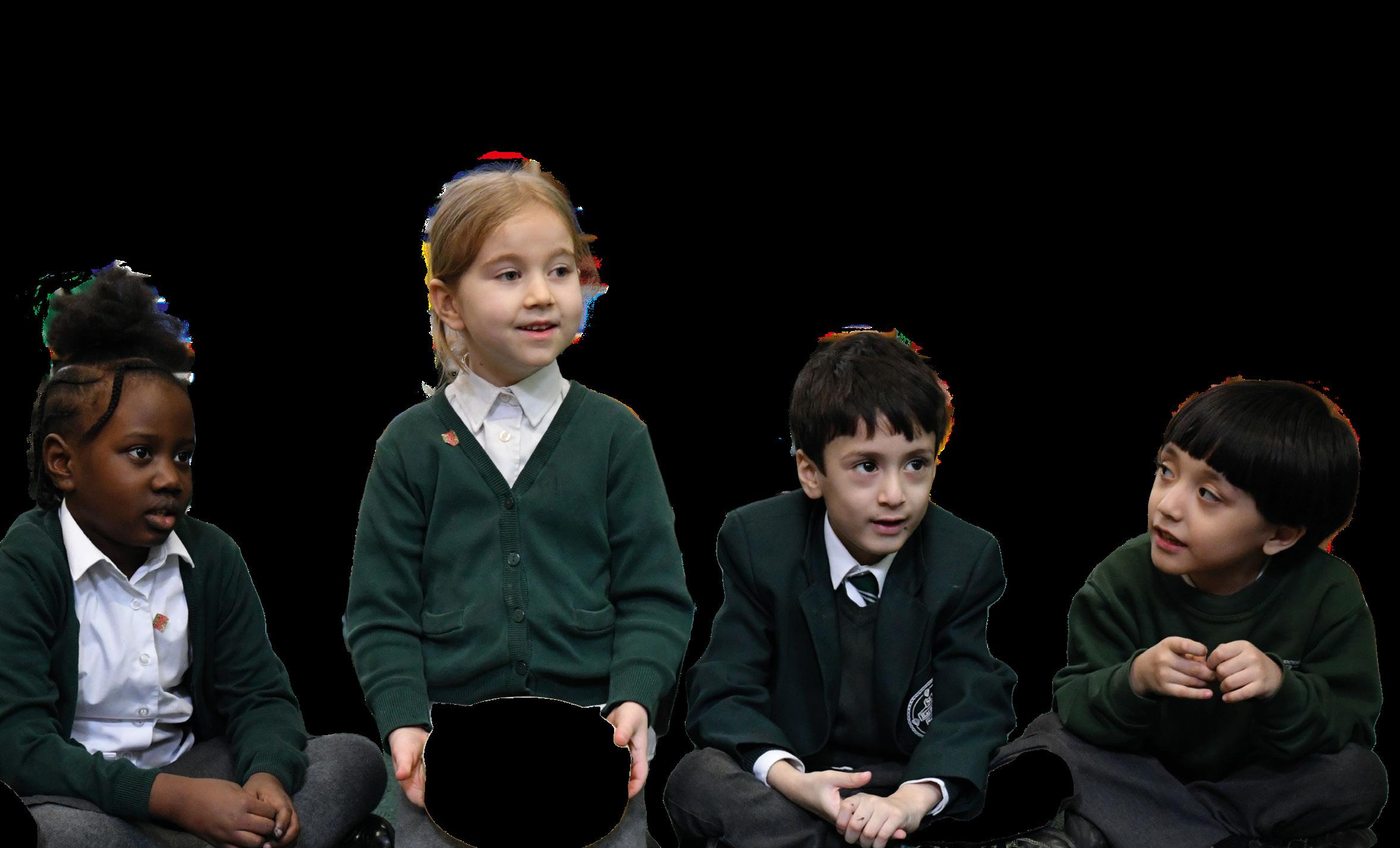
Manvinder Rattan, Voices Foundation CEO, said, ‘I’m delighted to have brought this valuable project to fruition in partnership with the ISM Trust, which has placed considerable confidence in us to produce such a high-quality, accessible and relevant
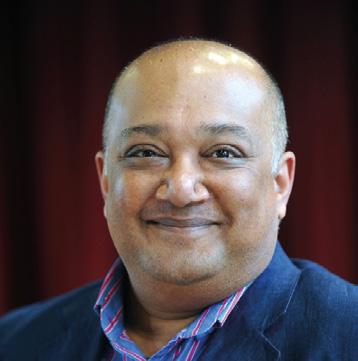
SUMMER 2023 PRIMARY SINGING TOOLKIT
27
Photo: Voices Foundation
How to look after your hearing health
Fiona Butterworth, Senior Clinical Audiologist at Musicians’ Hearing Services, explains how to maintain good hearing health and outlines what the Musicians’ Hearing Health Scheme can do for you
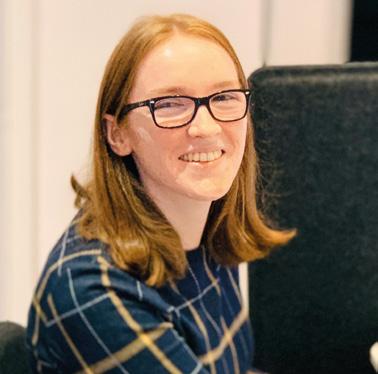
As a musician, your ears are an asset of your professional life and it is important to take care of them in order to sustain a long-term career in music.
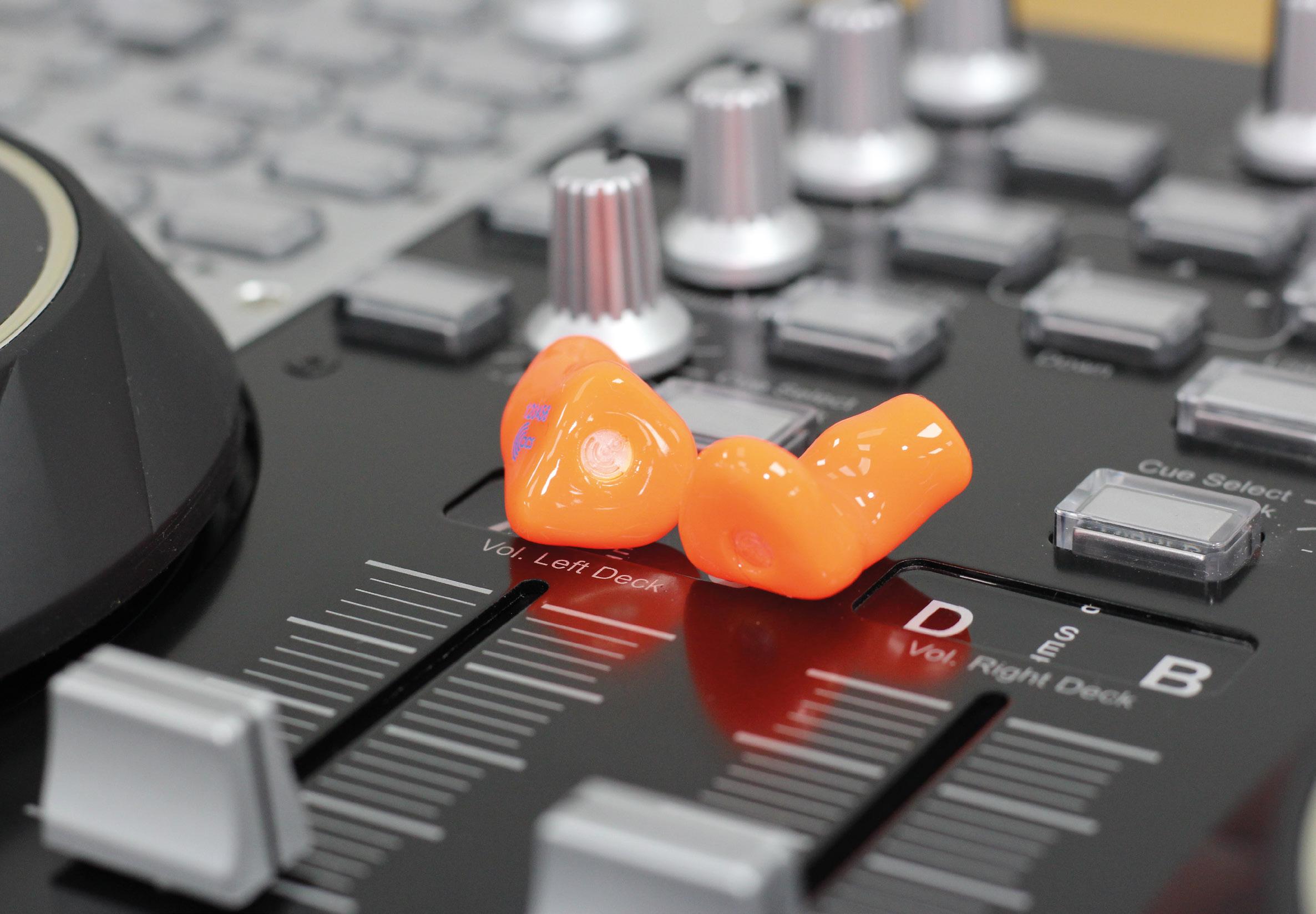
What is hearing health?
Hearing health considers the physical health of the ears, the level of your hearing, the level and duration of noise exposure, and the potential need for appropriate hearing protection. A combination of exposure to unsafe levels of sound and the ageing process will cause gradual changes to your hearing that can be difficult to notice in real time. Changes to your hearing due to noise exposure are 100% permanent, but also 100% preventable. Having a regular audiological check-up enables you to take control of your hearing health and ensure that you are aware of any changes as they occur.
Musicians should always be aware that it is highly likely that the level and duration of the sound you are exposed to through your work and performing or teaching time will reach and surpass the threshold that will cause permanent damage to your hearing, even if it may not seem that loud.
What does this mean for me?
If you notice a change in your hearing, or are experiencing something that is causing you concern, do not ignore it and do not assume that it will get better on its own. You should raise any concerns with a health professional as they arise, so that support can be provided in a timely manner.
ISM MUSIC JOURNAL 28
‘Changes to your hearing due to noise exposure are 100% permanent, but also 100% preventable.’
Even if you have no concerns, it is still important to keep track of your hearing by having regular hearing tests. The Health and Safety Executive recommend that where there is a greater risk of hearing damage due to noise exposure, hearing tests should be carried out more often than once every three years. We recommend having a hearing test completed annually.

Following exposure to unsafe levels of sound, it is not unusual to experience a dullness of hearing or the presence of tinnitus temporarily; this is a warning sign from your ears, telling you that the environment you were in has the potential to damage your hearing permanently. You should aim to reduce the level of sound you are exposed to, and for musicians, the most effective, and easiest step to this is to get a set of custom-made musicians’ ear plugs. These will reduce the overall level of sound entering the ear canal and as noise exposure is cumulative, will help the individual to manage their own noise exposure personally in all environments. We recommend that ear plugs are worn when playing, rehearsing, or performing, so that you can acclimatise to a new way of listening.
Like the rest of your body, your ears also need rest time, so ensure you are allocating time into your week that allows your ears to relax without noise.
What are my responsibilities in the workplace?
If you are an employee or worker, you are obliged to take reasonable care of the health and safety of yourself and those around you. Your employer will have certain duties towards you as well.
If you are a self-employed musician and your work activity poses no potential risk to the health and safety of other workers or members of the public, then you don’t need to carry out your own risk assessments. However, employers have a duty to ensure, so far as is reasonably practicable, that self-employed people are not exposed to risks to their health or safety in a workplace.

Having a regular audiological check-up enables you to take control of your hearing health and ensure that you are aware of any changes as they occur.
Continued overleaf > 29 SUMMER 2023 HOW TO LOOK AFTER YOUR HEARING HEALTH
What are the employer’s responsibilities with regards to noise in the workplace?
Employers should follow the Control of Noise at Work Regulations (2005). These regulations require employers to prevent or reduce risks to health and safety from exposure to noise at work. The regulations apply to employees, workers and the self-employed.
There are additional requirements in respect of employees, where the employer must provide health surveillance, including hearing tests, if they identify a risk to health. This means that if you are self-employed it is your own responsibility to ensure you take the appropriate steps to manage your hearing health.
What is the Musicians’ Hearing Health Scheme?
The Musicians’ Hearing Health Scheme from Help Musicians offers affordable hearing protection, delivered by Musicians’ Hearing Services.
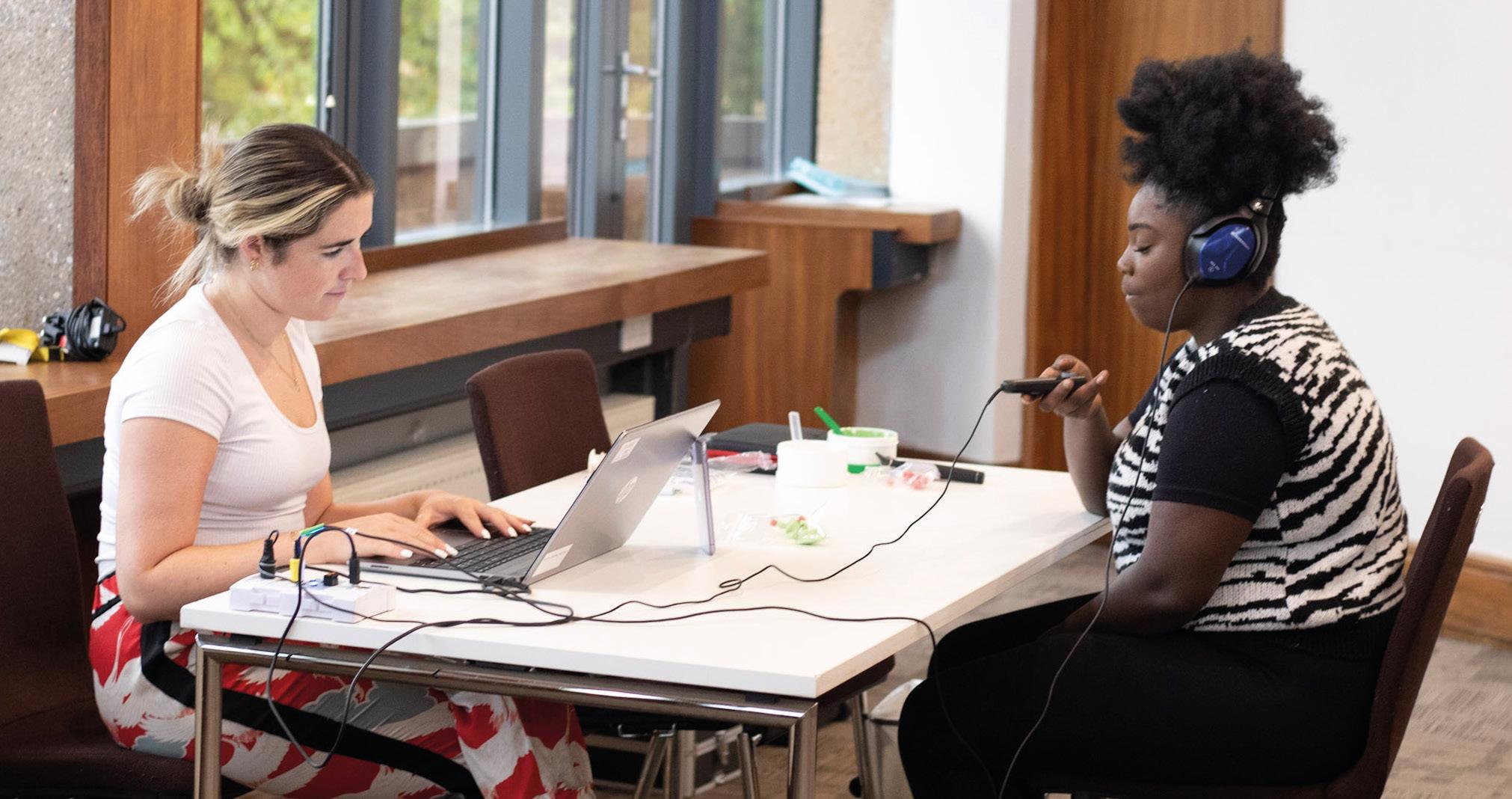
ISM members get a 25% discount on the scheme, subsidised by the ISM Members Fund. For just £37.50 you can access:
– an audiological assessment and check-up from a specialist in musicians’ hearing (worth up to £100)
– a set of custom-made, ACS Pro Series plugs (worth £149)
– expert advice on referral routes and next steps to manage any problems
– option of wax removal, if necessary, at a subsidised rate of £50
Your appointment will be carried out by a qualified audiologist with experience in supporting musicians with their hearing. Developing a working relationship with an audiologist who can support you in taking care of your hearing health is incredibly important, and the scheme allows you to take the first step in making this connection.
Access hearing support: ism.org/musicians-hearing-health-scheme
Like the rest of your body, your ears also need rest time, so ensure you are allocating time into your week that allows your ears to relax without noise.
30 ISM MUSIC JOURNAL
Remembering Paula Fan
A personal tribute
by Rhiannon Mathias
The music world was shocked to hear about the unexpected death of American pianist and ISM member, Paula Fan. Her loss is deeply felt by her family, friends, colleagues and pupils as well as music lovers all over the world.
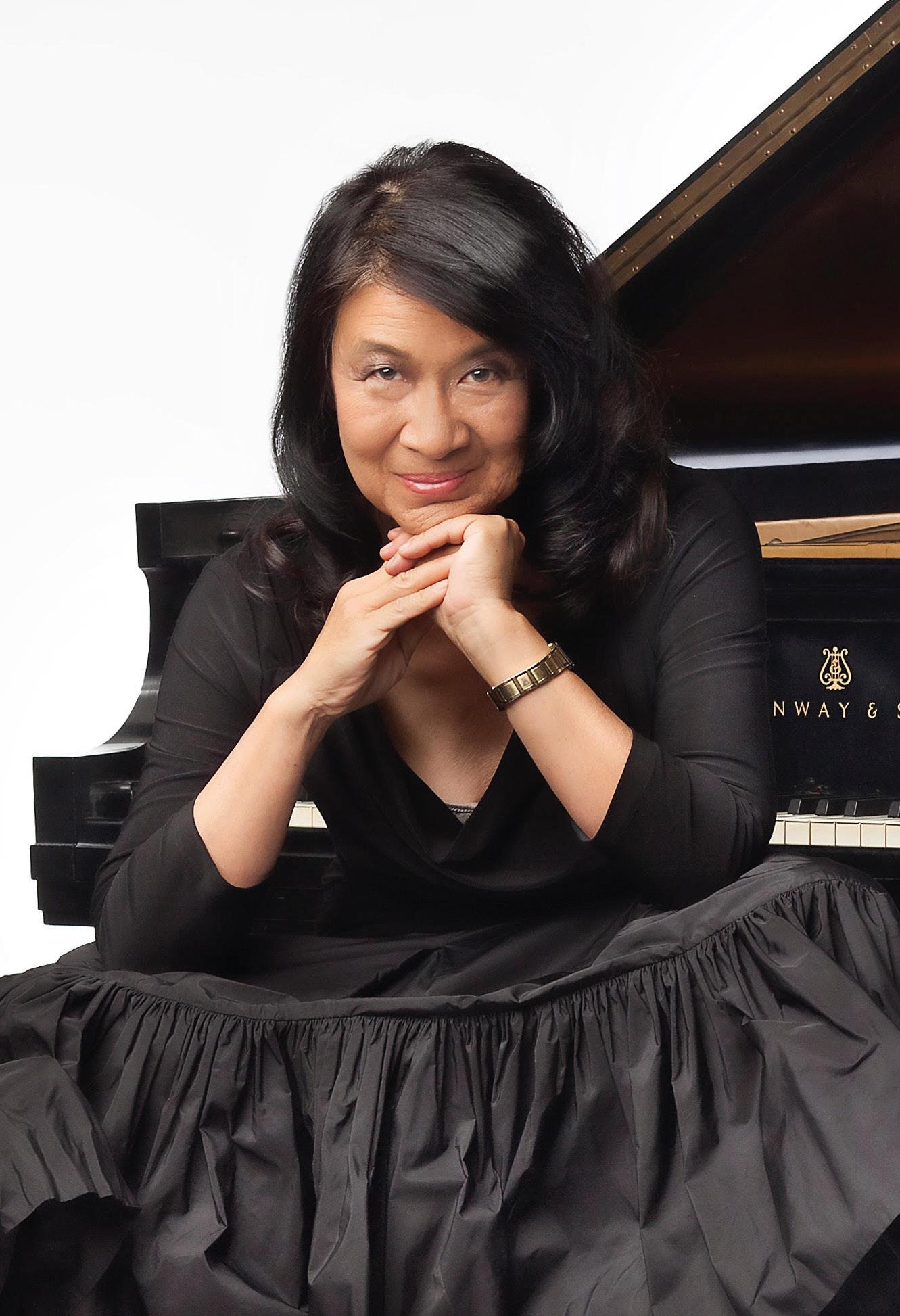
Paula was a vibrant and proactive member of the Tucson musical community and was principal pianist of the Tucson Symphony Orchestra from 1984 to 2016. With her extraordinary pianistic technique – she could sightread any music with ease – and her attention to the smallest musical details enabled her to excel as a chamber music player and accompanist of the highest calibre.
Paula met the love of her life, the English clarinettist John Denman, at the University of Arizona (UoA) in 1976, and the couple married in 1982, performing together as the Denman-Fan Duo in America, the UK and the Far East. Two other important musical partnerships stood out in her career. In 2002, she formed Duo Amabile with the German-American violinist Steven Moeckel and, from 2013 onwards, she regularly performed with Jeremy Huw Williams. Paula first met Jeremy at the UoA when she accompanied him in a recital of songs as part of a Benjamin Britten festival. During the next decade, this duo gave over 300 recitals together on five continents and recorded 13 CDs. Speaking shortly after her death, Jeremy
described Paula as an ‘incomparable pianist’ possessed a fierce intellect, a formidable technique, and was hugely inquisitive, great fun, gregarious, and an incredibly kind, generous and caring person’.
After completing undergraduate and postgraduate music degrees at the UoA and the University of Southern California, Paula served as a Music Lecturer at the UoA (from 1976) and, in 2005, became the first and only Regents Professor to be appointed by the University’s Fred Fox School of Music. Following her retirement from the music faculty in 2014, she helped to found the University’s Confluencenter for Creative Inquiry, serving as its first Senior Fellow from 2014 to 2018, while continuing with her international performing career.
I first met Paula in 2016 and was fortunate to see her on a regular basis when she came to the UK, including when I invited her to give a recital with Jeremy at the First International Conference on Women’s Work in Music at Bangor University in 2017. I have precious memories of her brilliant musicianship, her wonderful stories – often larger than life and always tinged with a mischievous sense of humour – as well as her warmth, wisdom and sheer verve for life.
(1952–2023)
‘She had an extraordinary pianistic technique –she could sight-read any music with ease - and paid attention to the smallest musical detail.’
31
Photo: Chris Richards
SUMMER 2023 REMEMBERING PAULA FAN
Helen Charlston wins BBC Music Magazine Award
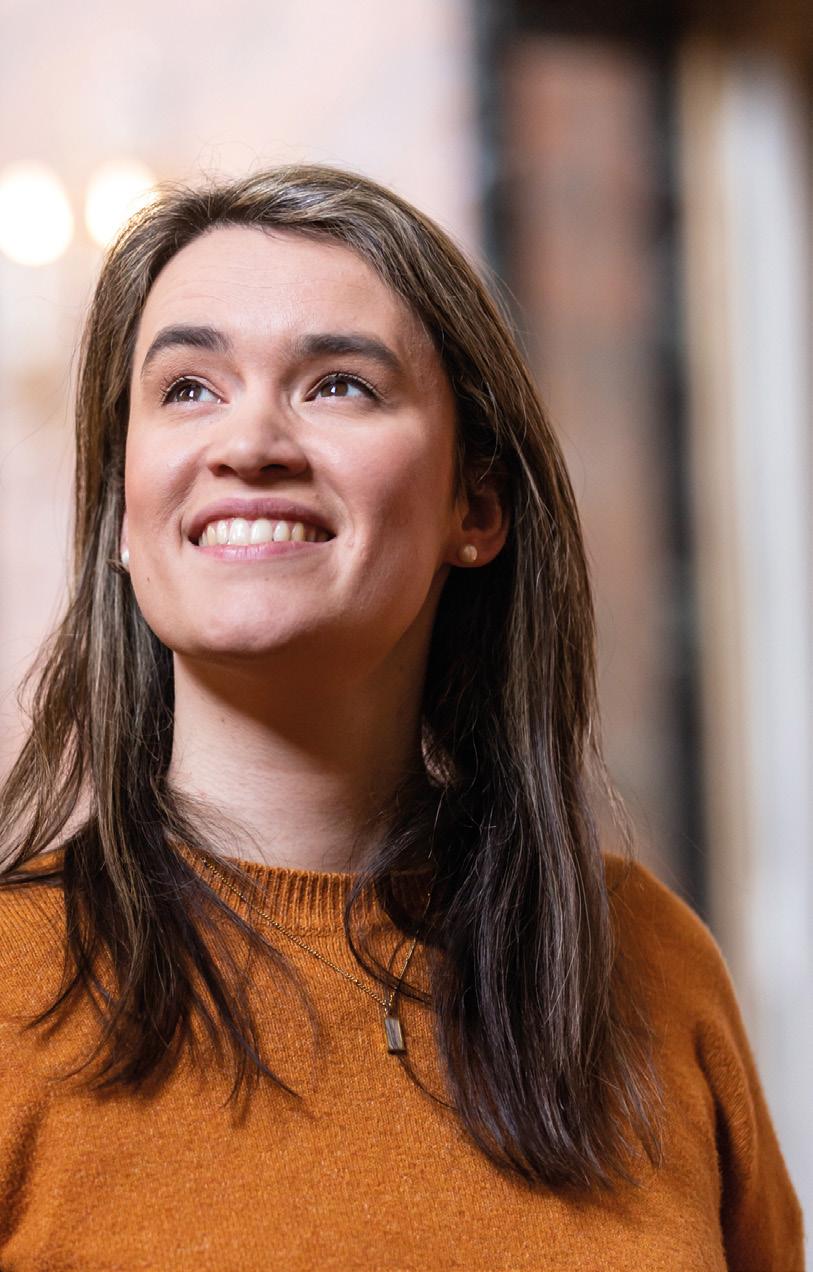
Mezzo-soprano Helen Charlston has won the Vocal Award at the 2023 BBC Music Magazine Awards for her album Battle Cry: She Speaks. Performed with lutenist Toby Carr and released on Delphian, Battle Cry’s selection of modern and 17th-century works aims to revisit but also to re-balance the obsession of earlier music with female abandonment and lament. The album also includes a work by composer and ISM member Owain Park. Commenting on her accomplishment, Charlston said: ‘It is so exciting to have won the BBC Music Magazine Vocal Award for Battle Cry. This programme is one that has become very close to my heart and really extols the power of storytelling in a very intimate musical setting. It’s an absolute honour to see our hard work recognised in this way.’
Nicholas Daniel awarded Cobbett Medal
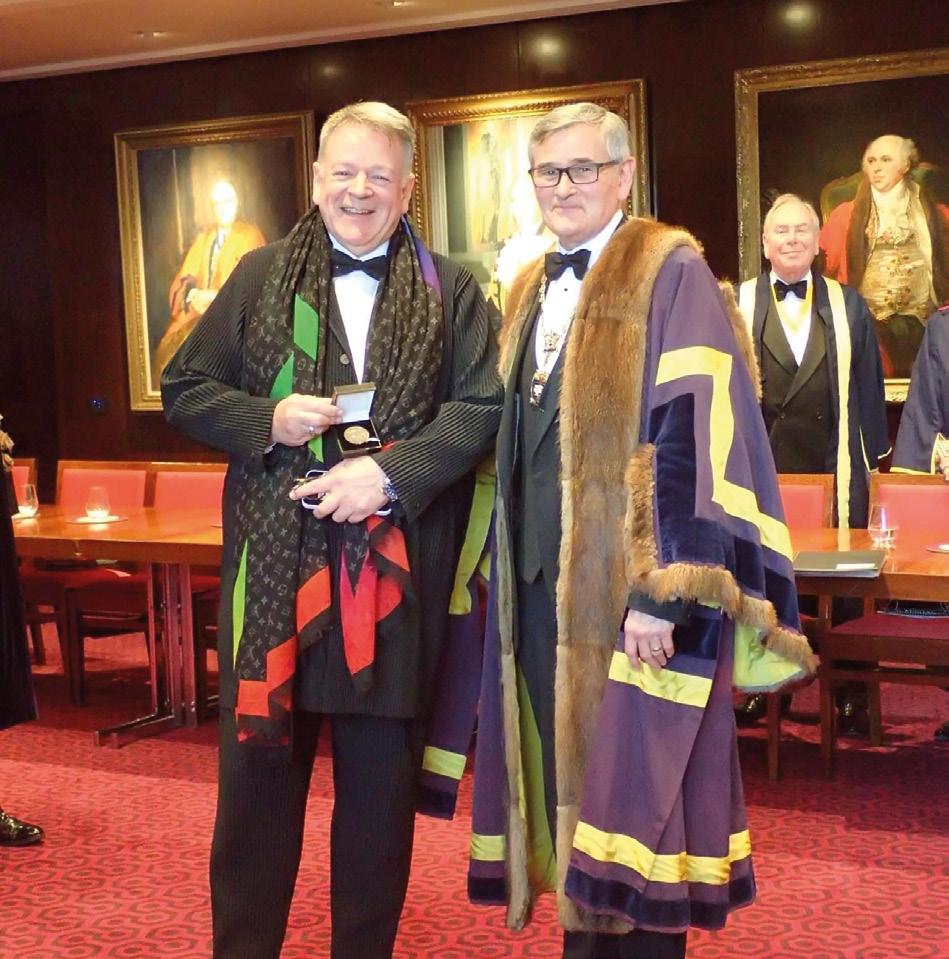
Congratulations to Nicholas Daniel who has been awarded the Walter Willson Cobbett Medal for services to Chamber Music 2022 by the Musicians’ Company. Receiving the medal at a ceremony in April, Daniel said ‘it’s not an exaggeration to say that Chamber Music, in the course of more than 50 years of me being obsessed with it, has taught me more about music and about myself than anything or anyone. This is because every single person I have been lucky enough to be on stage with … has, in the rehearsal room, shared their hearts and souls, subjugated their egos, finally giving everything of themselves on stage with me, sharing music unstintingly and generously with our audiences.
To all of them I can only say thank you ... I am profoundly grateful to the Musicians’ Company for this medal, and stunned by the company I keep in being given it. I am deeply honoured to accept it with the deepest thanks to ALL my chamber music partners past present and future.’
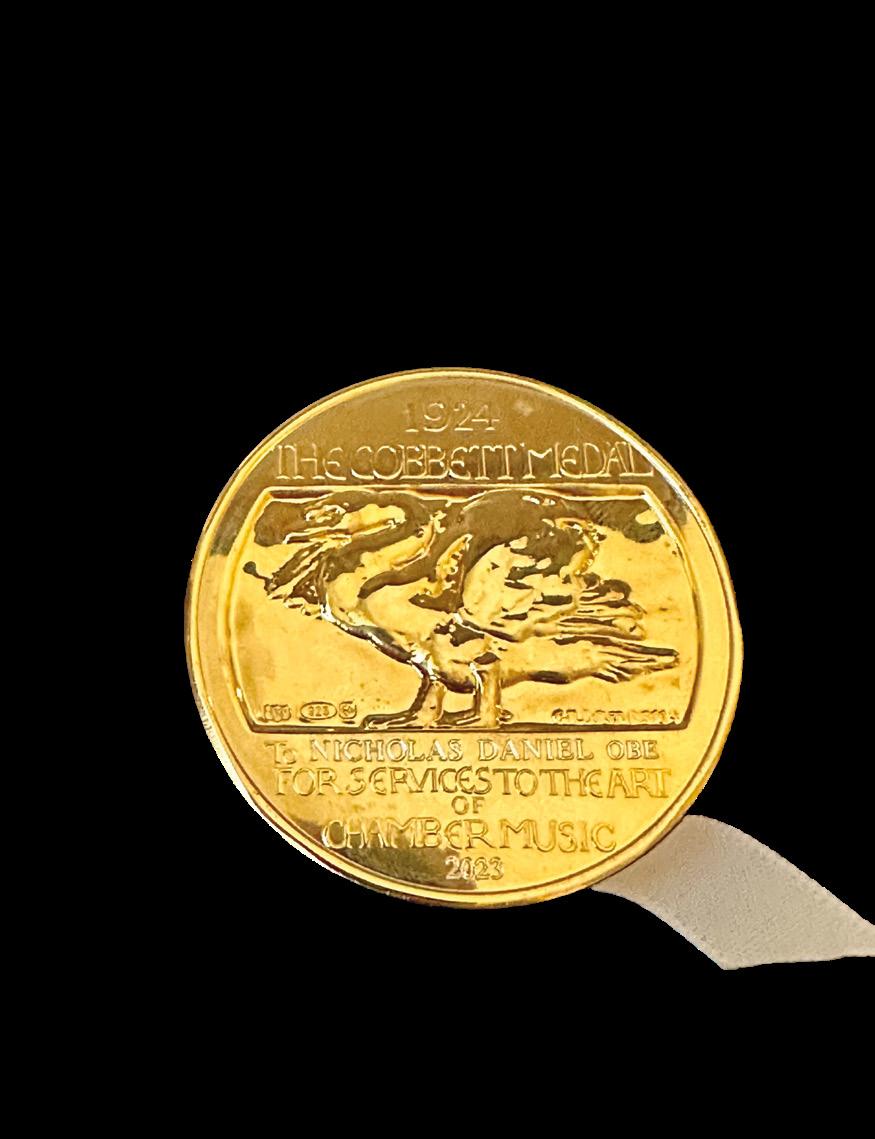
Dolores Forever embark on summer tour
Hot on the heels of their latest single ‘Good Time All The Time’, and a gig at Brighton’s The Great Escape, Dolores Forever, featuring ISM member Hannah Wilson with her duo partner Julia Fabrin, embark on a summer tour that takes in Leeds in the Park, Warrington’s Neighbourhood Weekender, Barn on the Farm, Latitude Festival, The Big Feastival and shows at Warwick and Ludlow castles.
ISM MUSIC JOURNAL 32 Community @ism_music facebook.com/ISMusicians @ism_music ism_music
Here’s what our members have been doing across the UK
AAM 50th anniversary season announced
The Academy of Ancient Music has announced plans for its 50th anniversary season in 2023/24. Alongside performances in London and Cambridge, it concludes a 30-year project with pianist Robert Levin to undertake the first recording of Mozart’s complete works for keyboard and orchestra. Richard Bratby is chronicling the history of the ensemble in a new book that will be released in October. These activities complement the AAM’s residency at the Barbican Centre and its continued work with students at the Royal College of Music, Royal Academy of Music and Guildhall School.
Starling Music Academy launches online, bespoke music theory course
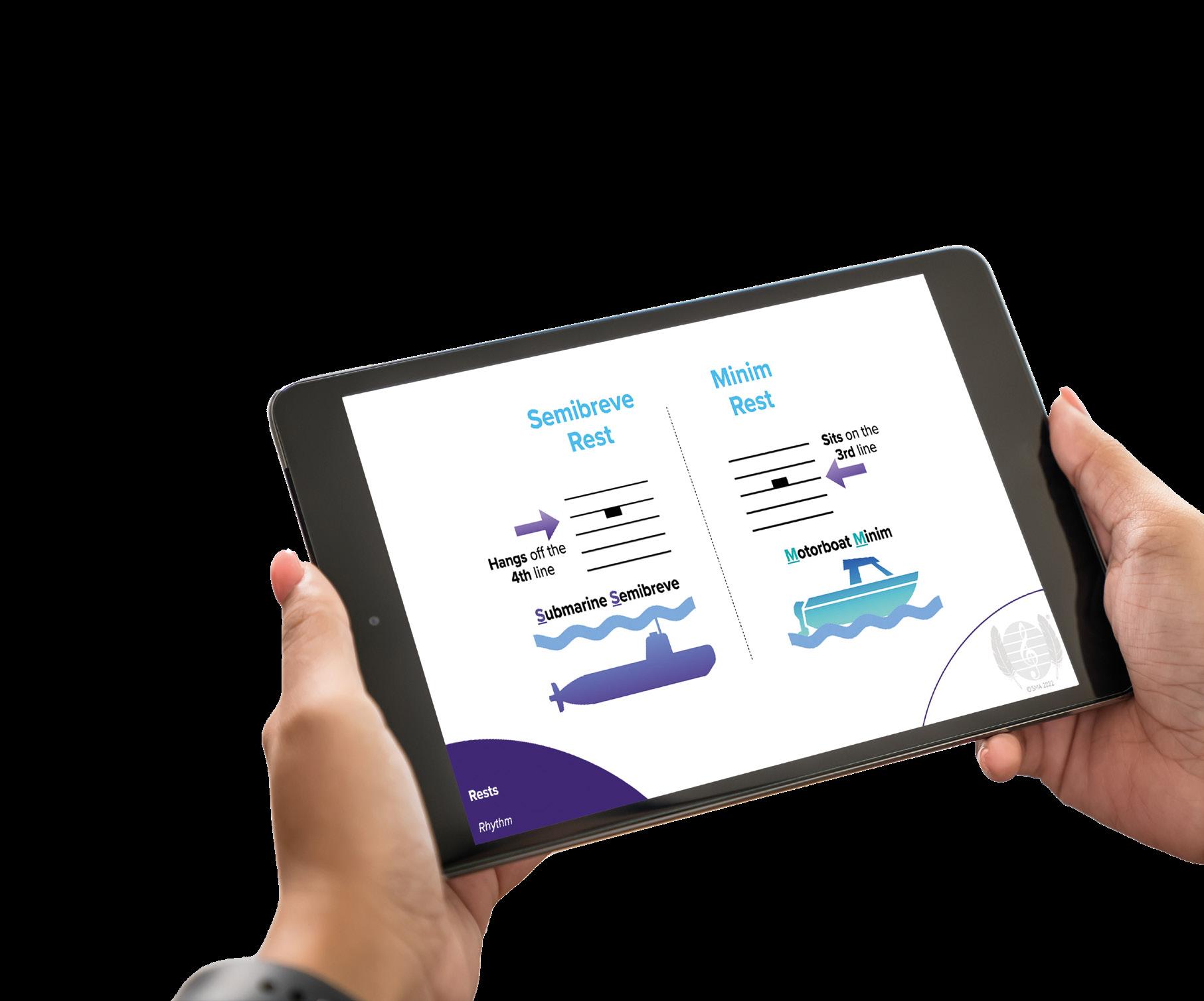
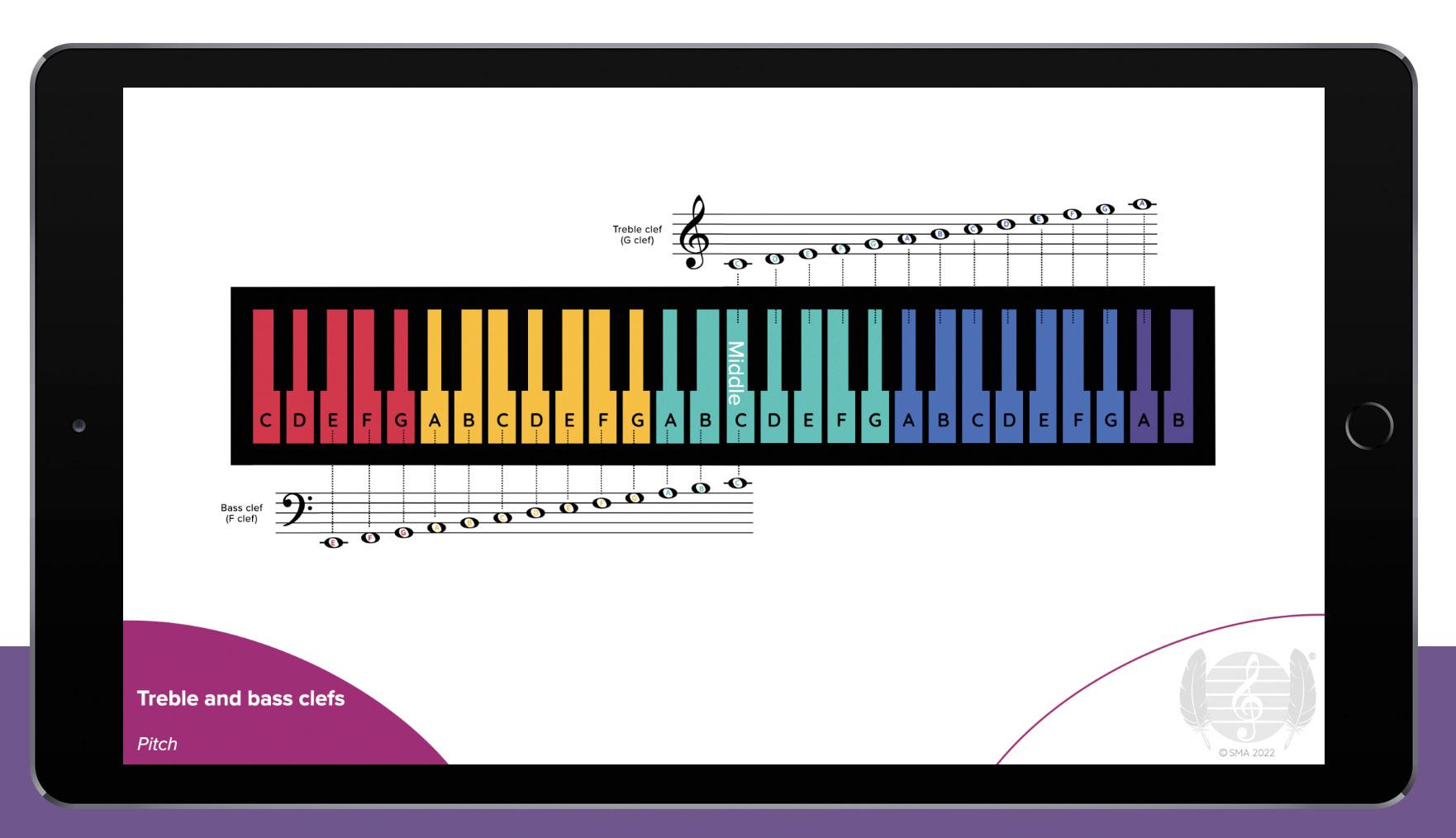
Starling Music Academy has launched its first online course which supports music students preparing to take their Grade 5 ABRSM music theory exam. The course uses newly-developed
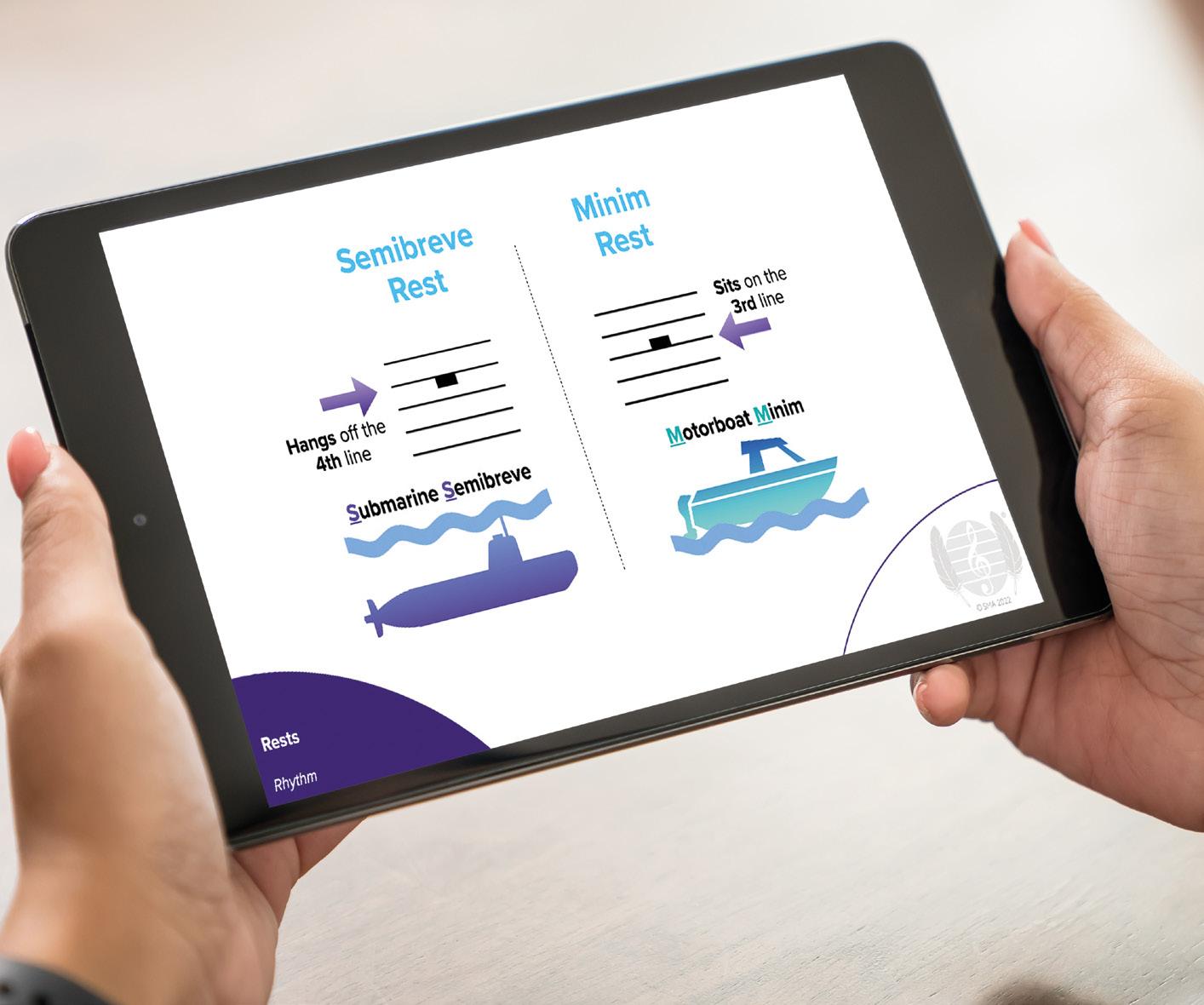
Making Music relaunches PDGYA
Making Music’s Philip and Dorothy Green Young Artists scheme (PDGYA) has facilitated and supported performance opportunities for talented young soloists with its member ensembles for over 60 years. The scheme is now relaunching in partnership with the Royal Over-Seas League and Brighton Early Music Festival to support a wider range of young artists and ensembles including, for the first time, young chamber ensembles.
More details on the scheme and associated subsidies can be found at makingmusic.org.uk

SUMMER 2023 ISM COMMUNITY 33
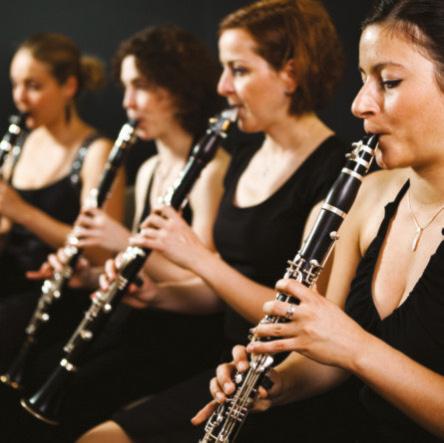
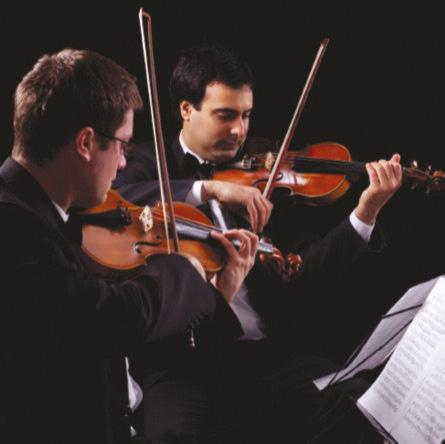
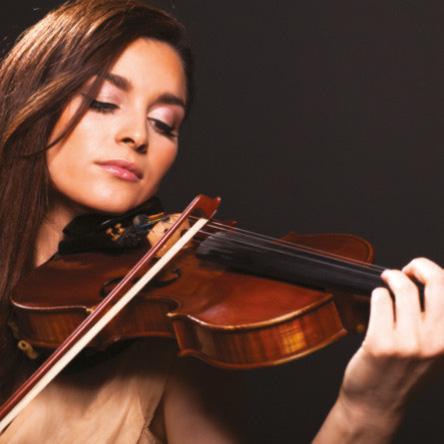

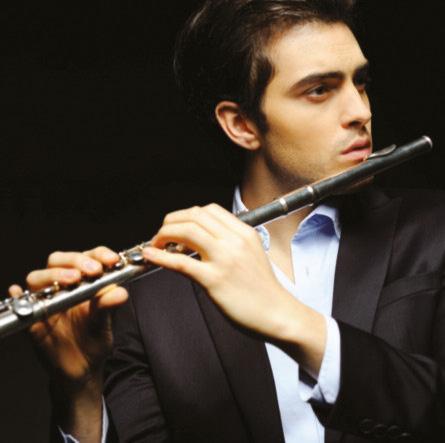
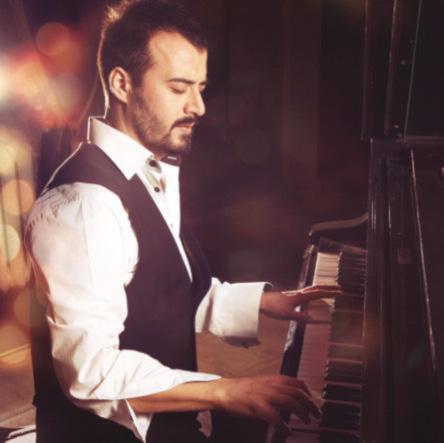














Visit our website www.hencilla.co.uk or email mail@hencilla.co.uk Hencilla Canworth G I Ltd is Authorised and Regulated by the Financial Conduct Authority Piano Piano Exam Pieces 2023 2024 Exam Pieces ABRSM Initial Grade Selected from the 2023 & 2024 syllabus Grade +audio In Piano Piano Exam Pieces 2023 2024 Exam Pieces ABRSM Grade 8 Selected from the 2023& 2024 syllabus Grade +audio Plusaudiotracksof all39Grade8 pieces 8 Expand your musical horizons FOR PRACTICAL & PERFORMANCE GRADES
NEW TRINITY SINGING PUBLICATIONS
Songs for every Singer:
◗ Singing Exam Pieces from 2023 including Musical Theatre and downloadable audio
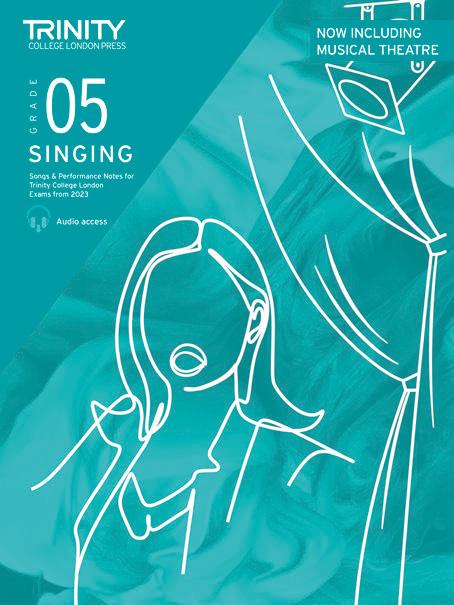
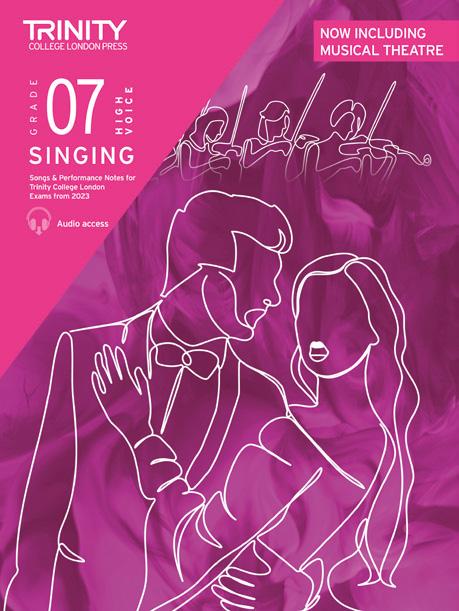
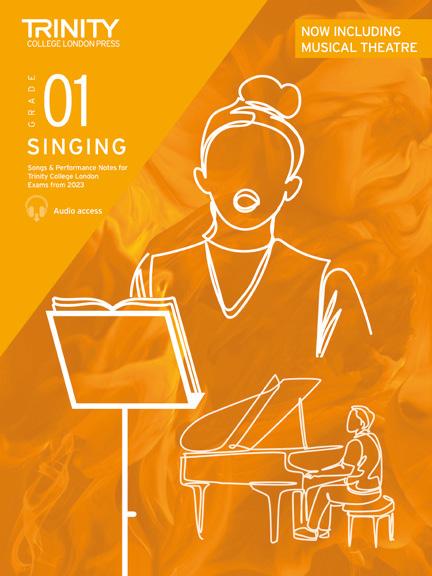
◗ Sight Reading Singing books align with the newly designed 2023 exam test
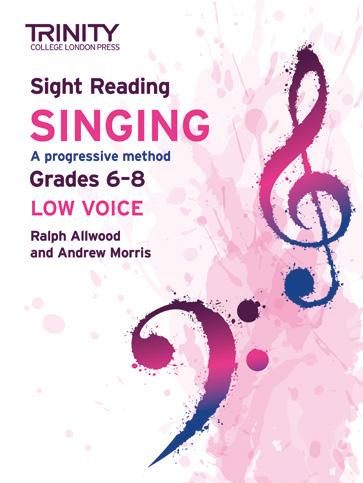
◗ Introducing Singing for beginner singers to develop healthy vocal technique
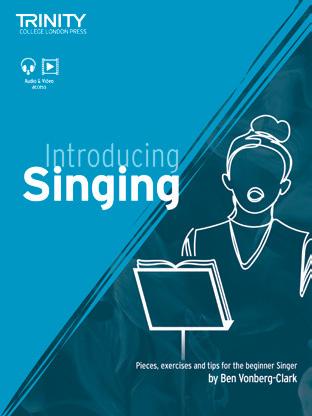
/TrinityCollegeLondon
/TrinityVideoChannel
/TrinityC_L

Member spotlight
Sharon Mark-Teggart – piano pedagogy coach, researcher and co-founder of The Curious Piano teachers*
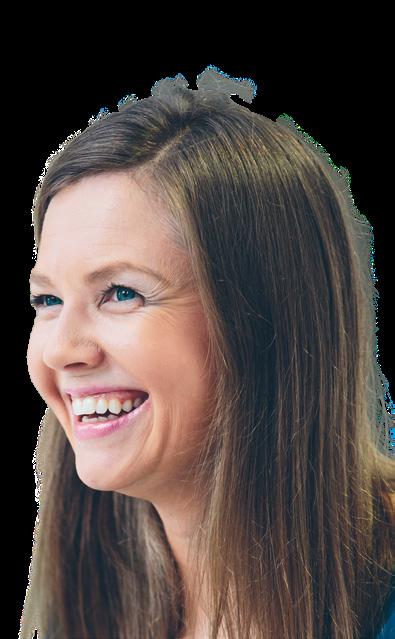
*an online community for piano teachers who love to learn as much as they teach. I hold a Master’s degree in Music Education and my training courses have enabled hundreds of piano teachers to gain accredited piano teaching diplomas.
How did you originally get into music?
I never thought I’d teach and I certainly never thought I’d teach piano; I originally planned a career in dietetics! When I passed Grade 8 piano with distinction my piano teacher suggested that I start to teach a little. I did. And then, five years into teaching, I did the MTPP (Music Teaching in Professional Practice), a postgraduate and Master’s course at the University of Reading. Ongoing learning with accountability is a wonderful thing. It was a life-changing experience, giving me confidence and sparking my curiosity as an educator.
What or who inspires you?
Many names and faces float past as I consider this question: I wouldn’t be the educator I am today without the inspiration of many friends and colleagues. However, over the past few months, I’ve been watching training videos from my husband’s dental business coach, Chris Barrow. He’s almost 70 and his stamina is absolutely incredible. It’s proof that we can learn, and be inspired, from those in other professions too.
What piece of advice has helped you most in your career?
In 2010 I booked a complimentary session with a business coach called Lisa Barwise. Three hours later she invited me to invest in one of her
coaching programmes. The first line out of my mouth was: ‘I can’t afford that’, to which she responded ‘Can you afford not to?’ Investing in business training has been absolutely crucial to the way in which I’ve scaled both my reach (being able to help more people) and my income. No self-employed person in the industry should be without proper business training – it changes everything.
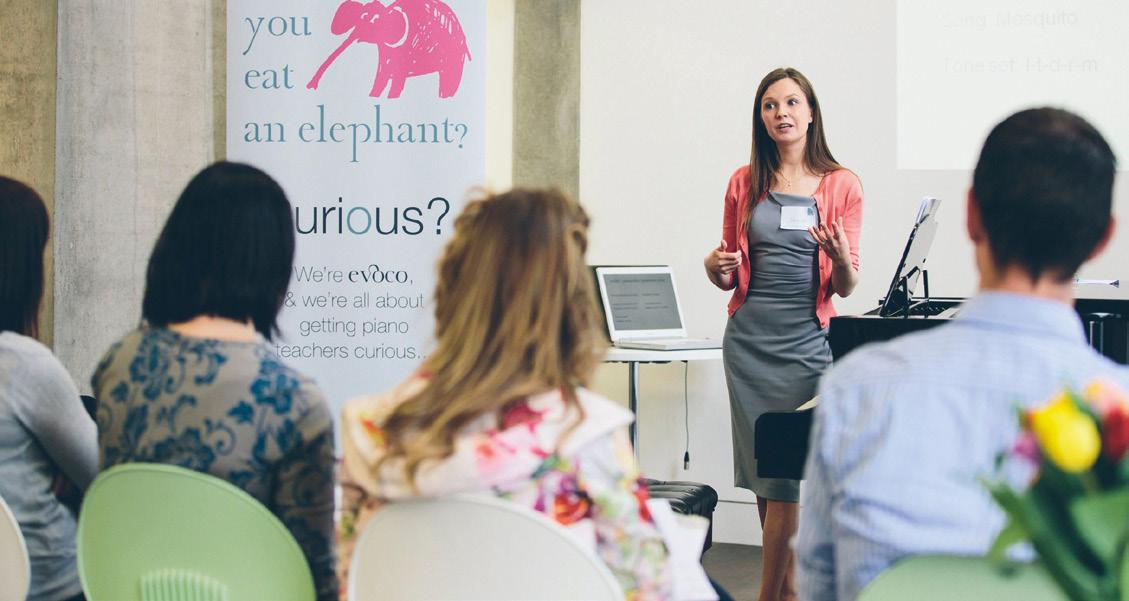
What has been the most rewarding project so far in your career, and why?
Undoubtedly, co-founding The Curious Piano Teachers with my wonderful friend and business partner Dr Sally Cathcart. Since we established the company eight years ago, our online training resources for teachers have impacted upon tens of thousands: teachers, their students, and their piano parents.
What advice would you give someone wanting to succeed in the music industry?
Don’t give up when the going gets tough. I’ve lost count of the number of times that I’ve chosen to push through the rough patches. Something we say a lot at The Curious Piano Teachers: ‘Be persistent and consistent’.
If you could work in another area of the music industry, where would it be and why?
I’m very passionate about nursery and primary music education. The work The Voices Foundation does is just amazing. If funding were no object, I would have a Voices programme in every primary school.
If you could change one thing about the music sector, what would it be and why?
It would become statutory for every piano teacher to engage in ongoing professional development – constantly developing as pianists, teachers, musicians and professionals.
What are your future plans?
Right now, I’m writing a chapter for The Oxford Handbook of Piano Pedagogy; plus, Sally and I are writing a book to be published by Faber. Last autumn, The Curious Piano Teachers launched a brand new, bespoke website, and we’re now at the next phase: developing a new ‘courses’ section. Additionally, I’m mom to a six-year-old and a fivemonth-old, so I continue to strive for getting the balance right between home and work life!
Finally, what does your ISM membership mean to you?
I was involved with one of the ISM campaigns where I said ‘My ISM is motivating!’ Over the past 20+ years, being a member of the ISM has motivated me to connect with others in the profession. The high-calibre contacts that I’ve made as an ISM member have led me to look in the right places to maximise what I know. And I have so many fond and happy memories of ISM conferences that I faithfully attended when I was in my 20s!
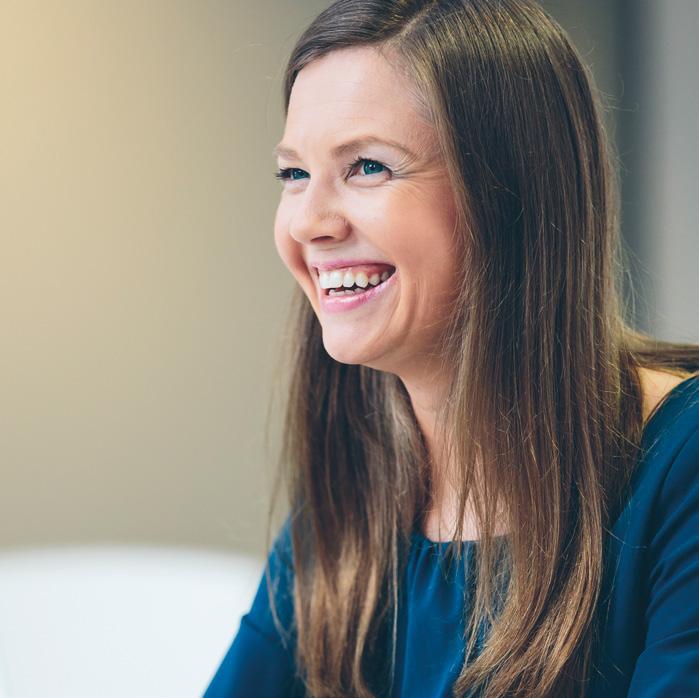
ism.org @ISM_music facebook.com/ismusicians @ism_music ISM_music
Photos: Richard Watson



























































 This image: Sir John Eliot Gardiner conducts the Monteverdi Choir & Orchestra ahead of the Coronation of King Charles and Queen Camilla at Westminster Abbey
Photo: Associated Press / Alamy Stock Photo]
Opposite page, top right: Andrew Nethsingha conducting the expanded Westminster Abbey Choir
Photo: Benjamin Ealovega
Opposite page, middle: Westminster Abbey’s Sub-organist Peter Holder playing for the service Photo: Benjamin Ealovega
This image: Sir John Eliot Gardiner conducts the Monteverdi Choir & Orchestra ahead of the Coronation of King Charles and Queen Camilla at Westminster Abbey
Photo: Associated Press / Alamy Stock Photo]
Opposite page, top right: Andrew Nethsingha conducting the expanded Westminster Abbey Choir
Photo: Benjamin Ealovega
Opposite page, middle: Westminster Abbey’s Sub-organist Peter Holder playing for the service Photo: Benjamin Ealovega








 Text by Clare Stevens
Photo: Bruce Childs
Text by Clare Stevens
Photo: Bruce Childs





 Author
Photo: Chris Christodoulou
Sir simon rattle
Author
Photo: Chris Christodoulou
Sir simon rattle

 All images: Bill Hiskett
All images: Bill Hiskett





































































